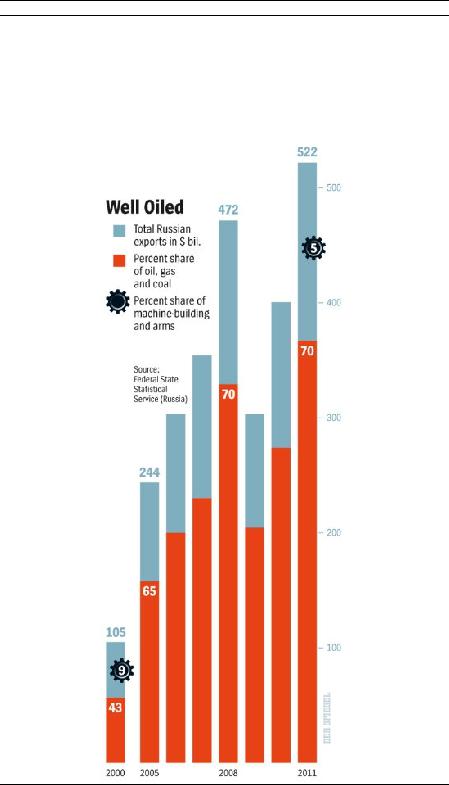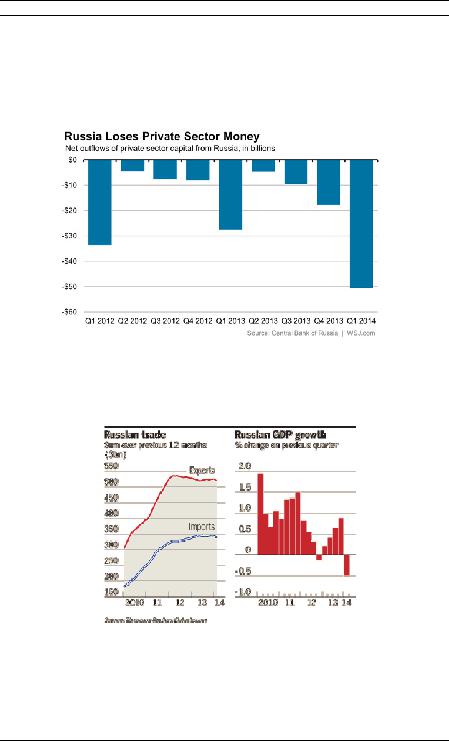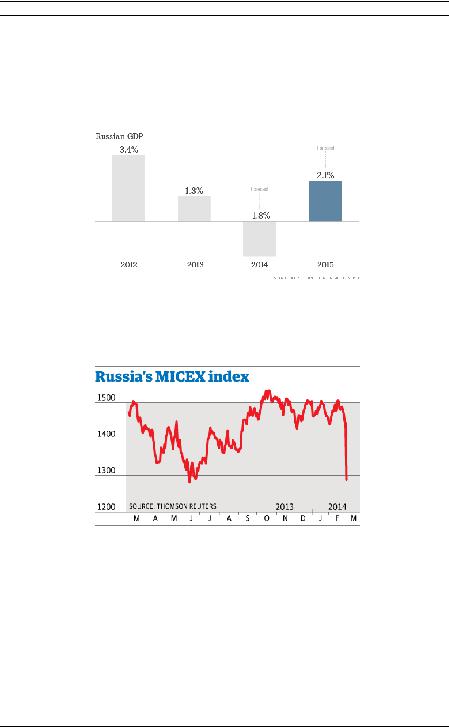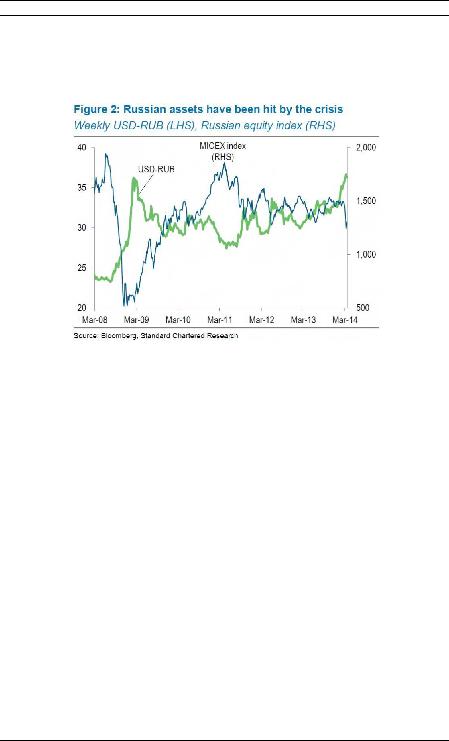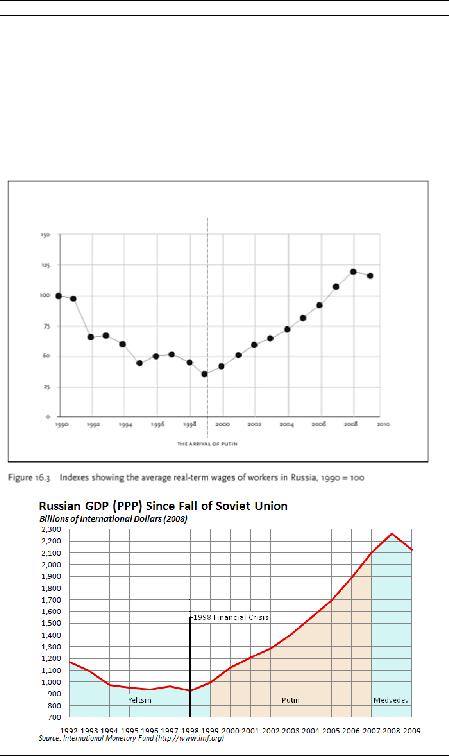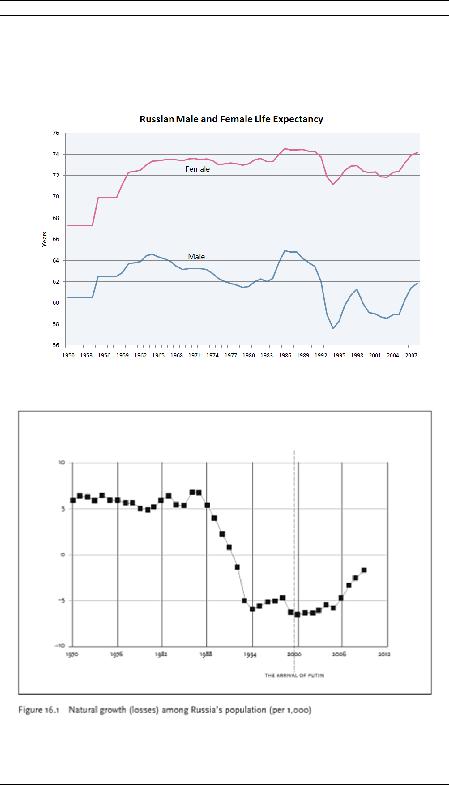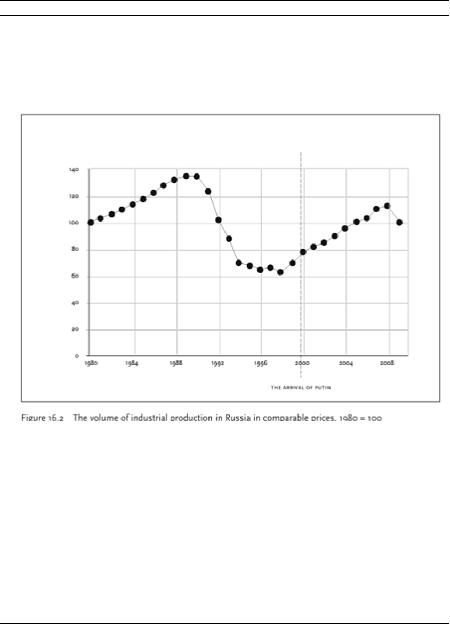
SAINT LOUIS UNIVERSITY
SCHOOL OF LAW
A NEW COLD WAR? COLD PEACE. RUSSIA, UKRAINE,
AND NATO
|
|
DR. ERIC ENGLE*
|
|
|
INTRODUCTION .................................................................................................
|
99
|
|
I. THE COLD WAR ..........................................................................................
|
100
|
|
A. Marxism..............................................................................................
|
100
|
|
1.
|
Marxist Economic
Theory.............................................................
|
101
|
|
2.
|
Marxist Legal
Theory....................................................................
|
103
|
|
B. The Soviet Union
................................................................................
|
104
|
|
1.
|
Soviet
Law.....................................................................................
|
104
|
|
|
a. Antinomianism in Soviet
Law..................................................
|
104
|
|
|
b. Human Rights to Soviet Law
...................................................
|
105
|
|
|
c. The Soviet State
.......................................................................
|
107
|
|
2.
|
Soviet
Economics..........................................................................
|
109
|
|
|
a. The Planned Economy
.............................................................
|
109
|
|
|
b.
Autarchy...................................................................................
|
110
|
|
C. The Cold War .....................................................................................
|
112
|
|
II. FROM COLD WAR TO COLD PEACE ...........................................................
|
114
|
|
A. Economic Collapse
and Corruption ...................................................
|
114
|
|
B. The Commonwealth of Independent
States (CIS) ...............................
|
115
|
|
C. The Eurasian Economic Community
(EurAsEC) ...............................
|
118
|
|
III. THE COLD PEACE .....................................................................................
|
119
|
|
A. Differences Between the Cold War
and the Cold Peace ....................
|
119
|
|
1.
|
A Market Economy
.......................................................................
|
119
|
|
|
a. Trade (Resources)
....................................................................
|
120
|
|
|
b. Investment
(Sanctions).............................................................
|
123
|
|
|
c. Sanctions
..................................................................................
|
124
|
|
|
d. The Energy Weapon?
...............................................................
|
127
|
|
2.
|
Democratic
Legitimation...............................................................
|
129
|
|
3.
|
Market Economy
...........................................................................
|
130
|
* Dr. Jur. Eric Engle J.D. (St. Louis) DEA
(Paris II) LL.M. (Humboldt) was a Fulbright specialist
(Ukraine). He can be reached at eric.engle@yahoo.com. His
works can be seen at: http://papers.
ssrn.com/sol3/cf_dev/AbsByAuth.cfm?per_id=879868.
Dr. Engle wishes to thank the Fulbright foundation for
supporting this research and the editorial team at the St. Louis University Law Journal.

|
|
SAINT LOUIS UNIVERSITY
SCHOOL OF LAW
|
|
|
98
|
SAINT LOUIS UNIVERSITY LAW JOURNAL
|
[Vol. 59:97
|
|
B. Similarities Between the Cold War
and the Cold Peace
|
.................... 130
|
|
1. Ideology: Great Russian Orthodox
Corporatism in a Clash of
|
|
|
Civilizations
..................................................................................
|
131
|
|
|
a. Great Russian, Nationalist,
Inclusive, Expansive.....................
|
131
|
|
|
b. Orthodox
..................................................................................
|
133
|
|
|
c.
Corporatism..............................................................................
|
135
|
|
|
d. Clash of Civilizations
...............................................................
|
138
|
|
2.
|
Authoritarianism: “Vertical Hierarchy”
........................................
|
139
|
|
|
a. The Concept of
Law.................................................................
|
140
|
|
|
b. Corruption
................................................................................
|
144
|
|
|
i. Corruption as a Governance
Strategy..................................
|
144
|
|
|
ii. Political Prisoners and
Amnesties.......................................
|
148
|
|
|
c. The Patriarchal Family
.............................................................
|
150
|
|
|
i. “The Family” and the Orthodox Church
as Quasi-State
|
|
|
Corporatist Institutions in Russia
........................................
|
151
|
|
|
ii. “The Family” as a Quasi-State
Institution: Inter-Country
|
|
|
Adoption..............................................................................
|
154
|
|
|
d. Civil and Political Rights
(Bürgerrechte).................................
|
155
|
|
|
e. Human
Rights...........................................................................
|
159
|
|
3. International Law and Foreign
Policy: Geopolitics and “Clash
|
|
|
of Civilizations”
............................................................................
|
161
|
|
|
a. Trade Policy
.............................................................................
|
161
|
|
|
b. Rearmament and Arms Sales
...................................................
|
162
|
|
|
c.
Terrorism..................................................................................
|
163
|
|
|
d. The Use of Force Under International
Law..............................
|
164
|
|
|
i.
Georgia................................................................................
|
168
|
|
|
ii. Syria
....................................................................................
|
168
|
|
|
iii.
Ukraine................................................................................
|
170
|
|
CONCLUSION...................................................................................................
|
172
|
SAINT LOUIS UNIVERSITY
SCHOOL OF LAW
|
2014]
|
A NEW COLD WAR? COLD PEACE. RUSSIA,
UKRAINE, AND NATO
|
99
|
INTRODUCTION
The Cold War featured constant covert
conflicts, such as terrorism and proxy wars ranging “from one
end of the globe to the other.”1 These
conflicts repeatedly threatened to erupt into overt (nuclear)
warfare. Russia and NATO are on the edge of a new cold war
because of the illegal annexation of Crimea2
and more than a half dozen other issues, such as Syria,3 gay rights,4 Magnitsky
list,5 et cetera. I call the current
situation a cold peace. This cold peace features isolated and
exceptional regional conflicts as opposed to the systemic global
conflict that was the Cold War. Furthermore, there is much less
state- sponsored terrorism in the cold peace than occurred in
the Cold War. Consequently, exceptional regional conflicts such
as Ukraine, Georgia, and Syria may be manageable but must be
understood as occurring in an asymmetric field, with zero-sum
outcomes regulated more often by politics than by law. Although
positive-sum outcomes remain possible in economic
relations, they have become less likely due to Russia’s illegal
annexation of Ukraine.6
Consequently, Russia will most likely be
increasingly isolated politically and economically, and Russian
foreign relations will be increasingly zero-sum or
even negative-sum. However, Vladimir Putin and
Sergey Lavrov, Russia’s President and Foreign Minister,
respectively, are both rational actors and are not in fact “[i]n
another world.”7 They pursue the
Russian national interest following a realist theory of
international relations.8 United
Russia has crafted a coherent narrative and implements an
alternative ideology that allows it to challenge global liberalism—to
the detriment of the rule of law and protection
1.Aaron
David Miller, Five Myths About the
Ukraine Crisis, CNN (Mar. 14, 2014, 6:00 AM), http://www.cnn.com/2014/03/08/opinion/miller-five-myths-about-ukraine-crisis/.
2.See
Fred Dews, NATO Secretary-General:
Russia’s Annexation of Crimea Is Illegal and Illegitimate, BROOKINGS (Mar. 19, 2014, 2:49 PM), http://www.brookings.edu/blogs/brookings-
now/posts/2014/03/nato-secretary-general-russia-annexation-crimea-illegal-illegitimate.
3.Holly
Yan, Syria Allies: Why Russia, Iran and China Are
Standing by the Regime, CNN (Aug. 29, 2013,
9:01 PM), http://www.cnn.com/2013/08/29/world/meast/syria-iran-china-russia- supporters/.
4.Russia:
Anti-LGBT Law a Tool for Discrimination, HUM. RTS. WATCH (June 30, 2014), http://www.hrw.org/news/2014/06/29/russia-anti-lgbt-law-tool-discrimination.
5.Michael
R. Gordon, U.S. Imposes New Sanctions on 12 Russians, N.Y. TIMES, May 21, 2014, at A8.
6.Dews,
supra note 2.
7.Contra
Peter Baker, Pressure Rising as
Obama Works to Rein in Russia, N.Y. TIMES, Mar. 3, 2014, at A1
(quoting Chancellor Angela Merkel of Germany). Anne Applebaum
wondered aloud whether Putin might be irrational: “[U]nless
Russian President Vladimir Putin suddenly becomes irrational—which,
of course, can’t be excluded—he must know that a full- scale invasion is entirely
unnecessary.” Anne Applebaum, Russia Puts on the
Squeeze, WASH. POST, Feb. 28, 2014, at A17.
8.RICHARD SAKWA, PUTIN: RUSSIA’S CHOICE 267 (2d
ed. 2008).
SAINT LOUIS UNIVERSITY
SCHOOL OF LAW
|
100
|
SAINT LOUIS UNIVERSITY LAW JOURNAL
|
[Vol. 59:97
|
of human rights. Russia presents a real risk
to the global rule of law due to domestic corruption and
international lawlessness, as most recently seen in Ukraine in
Donetsk and Crimea, but also in Georgia and the various “frozen”
conflicts in other former Soviet Republics (Moldova, Azerbaijan,
and Armenia).9 However, that
challenge is regional, not global, and cannot become global
because Russian ideology is involuted and unattractive.
Furthermore, though rational actors, President Putin and/or
Foreign Minister Lavrov overestimate Russia’s power and
possibilities and underestimate the resiliency of NATO Member
States.
To reduce the risks of a new cold war with
rampant proxy wars and state- sponsored terrorism and to
effectively foster the rule of law, the protection of human
rights, and democratic internationalism, NATO Member States must
recognize the exact nature of the challenge with which they are
confronted. A proper appreciation of Russia’s real strengths and
weaknesses will enable the North Atlantic alliance to firmly and
appropriately meet the challenge it now faces, neither
overreacting nor underreacting. Some refer to the Russian
challenge as “Soviet Union 2.0.”10 However,
that overstates and misapprehends the challenge. To understand
the challenge Russia presents and why it is not “Soviet Union
2.0,” we must understand the roots of the challenge in the Cold
War and the collapse of the USSR.
I. THE COLD WAR
To understand the Cold War we must understand
Russia and the Soviet Union; to understand the Soviet Union we
must understand Marxism. Thus, we start our inquiry with an
examination of Marxism, then the Soviet Union, and finally the
transformation from cold war to cold peace. This inquiry
proceeds in historical order.
A.Marxism
The Cold War was driven in theory by a
pervasive and irreconcilable ideological conflict between
liberal individualist capitalism versus collectivist
authoritarian socialism. To understand the Soviet Union and why
the Russian Federation is not “Soviet Union 2.0,” we must
understand Marxist theory. Although Marxist ideology drove the
USSR, Marxist thinking is remarkably absent in the ideology of
Putin’s United Russia party. We examine Marxist theory first
from the economic base, which is the foundation of the
ideological
9.Volodymyr
Valkov, Expansionism: The Core of Russia’s Foreign
Policy, NEW E. EUR. (Aug. 12, 2014), http://www.neweasterneurope.eu/articles-and-commentary/1292-expansionism- the-core-of-russia-s-foreign-policy.
10.See
Charles Clover, Clinton Vows
to Thwart New Soviet Union, FIN. TIMES (Dec. 6, 2012) http://www.ft.com/intl/cms/s/0/a5b15b14-3fcf-11e2-9f71-00144feabdc0.html (“There is a move to re-Sovietise
the region.” (quoting U.S. Secretary of State Hillary
Clinton)).
SAINT LOUIS UNIVERSITY
SCHOOL OF LAW
|
2014]
|
A NEW COLD WAR? COLD PEACE. RUSSIA,
UKRAINE, AND NATO
|
101
|
superstructure in Marxist thought. After
understanding Marxist economics, we then look at the Marxist
ideological superstructure built on that base11
in order to understand the USSR as the precursor and
predecessor state to the Russian Federation.
1.Marxist
Economic Theory
According to Marxism, history follows
progressive development through successive stages in a
dialectical spiral12 of class
conflict: thesis versus antithesis leading to their synthesis at
a higher level of systemic order. Marx believed the numerous
social classes in history had been reduced by economic progress
to a bi-polar zero-sum conflict
between capitalists and workers.13 Marxism
holds that capitalism, with its inevitable economic cyclicity,
fosters warfare to obtain access to resources, to increase market-share,
and to employ the unemployed.14 Marx
predicted the inevitable collapse of advanced capitalist
economies in revolution due to ever-greater
economic cyclicity: economic boom, panic, depression, and war.15 For Marxism, the inevitable
tendency of capitalism is to monopolize16
because of brutal zero-sum competition:
each capitalist wishes to destroy his
or her competitor, legally if possible, illegally if necessary.17 Per Marx, capitalists are driven into
destructive competition in order to obtain a larger market-share
and more profits, even without “rent seeking,” though rent
seeking also motivates brutal and destructive competition.18 Economies of scale, entry costs, and
specialization are other factors that push capitalism toward
monopolizing.
11.Often,
when people analyze Al-Qaeda they note
that the name Al-Qaeda means base. Most analysts
recognize the name as referring to Al-Qaeda as
originally a database of Mujahadeen and not as a reference to
Marxist theory of the productive base and the ideological
superstructure, or for that matter of Maoist theory of guerilla
zones and guerilla base areas.
12.See
JEAN RIVERO,
LES LIBERTÉS PUBLIQUES 87–88 (1974) (“In
addition, Marxism is historical materialism. It believes that
man and society are at every moment, a reflection and product of
history and of the dialectical movement behind it. In this
perspective the existence of permanent rights, given once and
for all, and removed the movement of history, is obviously
unacceptable. Like all the laws, ‘human rights’ are only a
reflection of the economic infrastructure. The expression of the
power of the ruling class, and the means for it to impose its
domination the exploited classes.”) (unverified source).
13.See
KARL MARX
& FRIEDRICH ENGELS, THE COMMUNIST MANIFESTO 25–26 (D. Ryazanoff ed., Eden Paul & Cedar Paul
trans., Russell & Russell 1963) (1848).
14.See
id.
15.See
1 KARL MARX, CAPITAL: A CRITICAL
ANALYSIS OF CAPITALIST
PRODUCTION 455– 58
(Frederick Engels ed., Samuel Moore & Edward Aveling
trans., Int’l Publishers Co. 1947) (1867).
16.IAN
WARD, INTRODUCTION
TO CRITICAL LEGAL
THEORY 116 (2d ed.
2004) (citing Marx for the proposition that the natural
tendency of capitalism is to monopolize).
17.See
id.
18.See
id.
SAINT LOUIS UNIVERSITY
SCHOOL OF LAW
|
102
|
SAINT LOUIS UNIVERSITY LAW JOURNAL
|
[Vol. 59:97
|
Monopoly is terrible, per Marxism, because
oligarchs can exploit workers who are essentially helpless in
the face of concentrated economic power.19 This
essential weakness of the exploited individual explains Marxist
skepticism toward individualism. To Marx, “individual freedom”
is not just the freedom to starve and be homeless while
unemployed; it is also the paralysis of any effort to
collectively organize the exploited so as to defend themselves
from concentrated economic power.20
History shows that the Malthusian predictions
of Marxism—ever greater market cyclicity leading
to global war and revolutions—are mostly
inaccurate. Marxists underestimated the power of technological
innovation and legal rationalization to reform capitalism out of
deep depression and wars for markets and resources. Capitalism
reformed itself out of self-destructive global
wars for markets and resources in the post-war
social democratic era due to the spate of social democratic
legal reforms enacted to forestall another great depression and
prevent another world war. The U.N., NATO, the EU, the UDHR,21 ICCPR,22 ICESCR,23 CERD,24 CEDAW,25 GATT,26 IMF,
27 IBRD,28 as
well as bank insurance (FDIC),29 unemployment
insurance, health insurance, and national pension plans such as
social security were all intended to prevent another economic
depression, mass unemployment, and consequent world war.
Although the Malthusian predictions of Marxism proved false, the
19.See
ANTHONY BREWER, MARXIST THEORIES
OF IMPERIALISM: A CRITICAL
SURVEY 50– 51 (2d
ed. 1990).
20.See,
e.g., MICHAEL A. LEBOWITZ, BEYOND
CAPITAL: MARX’S POLITICAL ECONOMY
OF THE WORKING CLASS
122–23
(2d ed. 2003).
21.Universal
Declaration of Human Rights, G.A. Res. 217 (III) A, U.N.
Doc. A/RES/217(III) (Dec. 10, 1948), available at http://www.un.org/en/documents/udhr/.
22.International
Covenant on Civil and Political Rights, adopted and opened for signature, ratification
and accession Dec. 16, 1966, 999 U.N.T.S. 171, available at http://www.ohchr.org/
en/professionalinterest/pages/ccpr.aspx.
23.International
Covenant on Economic, Social and Cultural Rights, adopted and opened for signature, ratification
and accession Dec. 16, 1966, 993 U.N.T.S. 3, available at http://www.ohchr.org/EN/ProfessionalInterest/Pages/CESCR.aspx.
24.International
Convention on the Elimination of All Forms of Racial
Discrimination, adopted and opened
for signature and ratification Dec. 21, 1965, 660
U.N.T.S. 195, available at http://www.ohchr.org/EN/ProfessionalInterest/Pages/CERD.aspx.
25.Convention
on the Elimination of All Forms of Discrimination Against
Women, adopted and opened for
signature, ratification and accession Dec. 18, 1979,
1249 U.N.T.S. 13, available at http://www.un.org/womenwatch/daw/cedaw/cedaw.htm.
26.General
Agreement on Tariffs and Trade, Oct. 30, 1947, T.I.A.S. No.
1700, available at http://www.wto.org/english/docs_e/legal_e/gatt47_e.pdf
(forerunner to the World Trade Organization).
27.INT’L MONETARY FUND, http://www.imf.org
(last visited Oct. 13, 2014).
28.INT’L BANK FOR RECONSTRUCTION
& DEV., http://go.worldbank.org/SDUHVGE5S0
(last visited Oct. 13, 2014).
29.FED. DEPOSIT INS. CORP., http://www.fdic.gov
(last visited Oct. 13, 2014).
SAINT LOUIS UNIVERSITY
SCHOOL OF LAW
|
2014]
|
A NEW COLD WAR? COLD PEACE. RUSSIA,
UKRAINE, AND NATO
|
103
|
Marxist prediction of a natural tendency of
capital to monopolize seems accurate because monopolistic
production is generally more efficient.30 Nevertheless,
capitalist economies do not feature ever more extreme and ever
more rapid economic cyclicity (hysteresis) triggering global war
and global revolution, at least not since 1945.31 Capitalism in the developed world
seems to have mostly tamed the business cycle and to have
definitively de-linked economic cycles from war
for markets and resources: the 2008 great recession did not
unleash any war among the developed countries, at least not so
far.
2.Marxist
Legal Theory
Marxism argues that the economic base, the
material conditions of production, generally determine the
ideological superstructure, and that the ideological
superstructure merely justifies and rationalizes the relations
of productive forces.32 Marxism sees
private property as the final mechanism of oppression and a
source of separation between men.33 To
Marx the state is merely the executive committee of the
bourgeoisie.34 Capitalist law, per
Marxism, is purely formal,35 an
illusion,36 which justifies
exploitation by a dominant class over a dominated class.37 Thus, Marx wanted to abolish the state
and its laws. Consequently, Marxist legal theory is
fundamentally antinomian.38 None of
this is part of United Russia’s worldview, but partly explains
why Russia has difficulty forming itself as a rule of law state.
30.See
BREWER, supra
note 19, at 24.
31.See
Steve Keen, Is Capitalism
Inherently Unstable?, PIERIA (Apr. 29, 2013),
http://www.pieria.co.uk/articles/is_capitalism_inherently_unstable.
32.See
KARL MARX, A CONTRIBUTION TO THE CRITIQUE
OF POLITICAL ECONOMY
20 (Maurice Dobb ed., S.W. Ryazanskaya trans.,
1970).
33.JEAN-MARIE
PONTIER, LIBERTÉS
PUBLIQUES 136
(1997).
34.MARX & ENGELS,
supra note 13, at 28.
35.JEAN-JACQUE
VINCENSINI, LE
LIVRE DES DROITS
DE L’HOMME 186
(Robert Laffont ed., 1985) (“For Marxists, these freedoms are
essentially ‘formal’ in the sense that they would be empty of
any real substance, and therefore, pure form.”).
36.Eric
Engle, Human Rights According to
Marxism, 65 GUILD PRAC. 249, 255 & n.10 (2008) (“Civil
rights are merely the rights of the bourgeoisie.” (quoting PHILOSOPHISCHES WORTERBUCH
780 (Georg Klaus & Manfred Buhr eds., 1974))).
37.JEAN
ROCHE & ANDRÉ
POUILLE, LIBERTÉS
PUBLIQUES 11 (11th
ed. 1995).
38.EVGENY
BRONISLAVOVICH PASHUKANIS, THE GENERAL THEORY OF LAW & MARXISM
61 (Chris Arthur ed., Barbara Einhorn trans.,
Transaction Publishers 2002) (1978) (“The withering away of
certain categories of bourgeois law (the categories as such, not
this or that precept) in no way implies their replacement by new
categories of value, capital and so on.”).
SAINT LOUIS UNIVERSITY
SCHOOL OF LAW
|
104
|
SAINT LOUIS UNIVERSITY LAW JOURNAL
|
[Vol. 59:97
|
B.The
Soviet Union
1.Soviet
Law
Having understood the basics of Marxist
economics, we can now proceed to try to understand the USSR. We
examine Soviet law to understand some of the reasons why
contemporary Russia has difficulty forming a rule of law state.
a.Antinomianism
in Soviet Law
The basic problem facing Soviet law was the
fact that its teleology was the dissolution of the state into
society. Antinomianism undermined the concept of the rule of law39 in the Soviet system: Why build the
rule of law if the objective of state power and the inevitable
trend of history is the transformation of state power into
social peace? Furthermore, for Pashukanis, the leading Soviet
legal theorist, the rule of law is a mirage used to delude the
working class.40 Thus, “socialist
legality,”41 the attempt to implement
the formal rule of law42 to govern
ordinary transactions of daily life43 in
the USSR, was doomed from the start due to dictatorship,44 the absence of separation of powers,45 political purges,46
and a reign of systematic terror47 during
both the
39.Kazuo
Hatanaka, The “Rule of Law” State Notion in the USSR
and the Eastern Europe—A Comparison with the
Japanese Constitutional Experience, RITSUMEIKAN L. REV., March 1991, at 1, 1
(“A generally accepted definition of the rule of law is that
in order to protect the rights and freedoms of the people, the
state power should be exercised under the objective law which
is based on the will of the people.”).
40.PASHUKANIS, supra note
38, at 146.
41.Hatanaka,
supra note 39, at 7 (“[T]he
concept of socialist legality originally included the observance
of the law and other legal norm by the people, as its essential
component.”); Pierre Lavigne, La Légalité
Socialiste et la Développement de la Préoccupation Juridique
en Union Soviétique, REVUE D’ETUDES COMPARATIVES EST-OUEST,
Sept. 1980, at 5, 8–14.
42.Hatanaka,
supra note 39, at 4–5
(“[Socialist legality is] a principal of strict observance and
exact exercise of constitution, laws and other acts by all state
organ, public servants, social organization and citizen.”).
43.The
Law of Nov. 30, 1918: On the People’s Courts, Collection of
Laws of RSFSR, 1918, No. 85, art. 22 (noting that People’s
Judges must decide on written law; lacunes to be covered via
“revolutionary legal conscience”).
44.See
Karl Marx, Marx to J.
Weydemeyer, March 5, 1852, in KARL MARX & FREDERICK
ENGELS: SELECTED WORKS IN ONE VOLUME 679,
679 (9th prtg. 1986) (“[T]he class struggle necessarily leads to
the dictatorship of the proletariat . . . [and] this
dictatorship itself only constitutes the transition to the
abolition of all classes and to a classless society . . . .”
(quoting Marx in a letter to J. Weydemeyer in New York)).
45.Id.
at 291 (“The Commune was to be a working, not a
parliamentary, body, executive and legislative at the same
time.”); KONSTITUTSIIA SSSR (1936) [KONST. SSSR] [USSSR CONSTITUTION]
arts. 35, 59, 67, 81, 91.
46.But
see Harold J. Berman, Principles
of Soviet Criminal Law, 56 YALE L.J. 803, 805
(1947) (containing no reference whatsoever to the trials of
1936 and 1937).
SAINT LOUIS UNIVERSITY
SCHOOL OF LAW
|
2014]
|
A NEW COLD WAR? COLD PEACE. RUSSIA,
UKRAINE, AND NATO
|
105
|
Lenin48 and Stalin
eras, which literally put the nails into the coffin of the rule
of law, as shown by the execution of Pashukanis himself—among
thousands of others. This history makes clear why Russia has
difficulty attaining the rule of law to this day.
b.Human
Rights to Soviet Law
Marxist legal theory, though antinomian, is
not without teleology. Marxism seeks to subordinate the state to
society and ultimately replace the state with society in order
to end exploitation and war.49 Marx
saw capitalist human rights as progress relative to feudalism.50 Marx regarded human rights as
necessary for the achievement of socialism.51
Marxist human rights laws are collective52 social claims of all persons to
substantive goods, subject however to the limitations imposed by
the material facts and contextualized by history53
47.Id.
(“[T]he courts should not do away with
terror—to promise that would be to deceive ourselves and others—but
should give it foundation and legality, clearly, honestly,
without embellishments.” (quoting 27 LENIN, COLLECTED WORKS
296 (3d ed. 1932))); N.V. KRYLENKO, LENIN ON COURTS
111 (1927).
48.Resolution
of Council of People’s Commissars of Sept. 5, 1918, Collection
of Laws of RSFSR, 1918, No. 710 (noting that enemies of the
state are to be imprisoned; if necessary, shot). See also White Terror, IZVESTIA,
Sept. 5, 1918, at 1.
49.KARL
MARX, CRITIQUE
OF THE GOTHA PROGRAMME
31 (C.P. Dutt ed., 1933).
50.Engle,
supra note 36, at 254 &
n.1 (“Already in his ‘On the Jewish Question’ Marx had proven
that the so called Human rights are class rights—political
emancipation is a great step forward but only progress within
the exploitative society.” (quoting PHILOSOPHISCHES
WORTERBUCH 780 (Georg Klaus
& Manfred Buhr eds., 1974))).
51.Id.
at 251–52; see also PHILOSOPHISCHES WORTERBUCH
782 (Georg Klaus & Manfred Buhr eds., 1974) (“Human
rights are necessary for the transition from capitalism to
socialism.”) (unverified source).
52.Engle,
supra note 36, at 254 &
n.1 (“The goal of socialist civil rights is neither absolute
individualism or the loss of the individual within the masse.
Rather, fundamental rights contribute to the formation of all-round
developed harmonious persons.” (quoting PHILOSOPHISCHES
WORTERBUCH 783 (Georg Klaus
& Manfred Buhr eds., 1974))).
53.As
Frederick Engels wrote:
Freedom does not consist in the dream of
independence from natural laws, but in the knowledge of these
laws, and in the possibility this gives of systematically making
them work towards definite ends. This holds good in relation
both to the laws of external nature and to those which govern
the bodily and mental existence of men themselves—two
classes of laws which we can separate from each other at most
only in thought but not in reality. . . . Freedom therefore
consists in the control over ourselves and over external nature,
a control founded on knowledge of natural necessity . . . . The
first men who separated themselves from the animal kingdom were
in all essentials as unfree as the animals themselves, but each
step forward in the field of culture was a step towards freedom.
FREDERICK ENGELS, ANTI-DÜHRING 157
(2d ed. 1959).
SAINT LOUIS UNIVERSITY
SCHOOL OF LAW
|
106
|
SAINT LOUIS UNIVERSITY LAW JOURNAL
|
[Vol. 59:97
|
and the finality of the socialist
construction: the abolition of law and the state54 and the replacement of the state with
society.55 Early soviet legislation
was consequently very open textured, seeking to exhort56 and educate,57 to
teach the masses to read,58 to
participate in political discourse, and to grow as
54.EVGENY
B. PASHUKANIS, LAW
AND MARXISM: A GENERAL
THEORY 61 (Chris
Arthur ed., Barbara Einhorn trans., 1978) (“The withering away
of certain categories of bourgeois law (the categories as
such, not this or that precept) in no way implies their
replacement by new categories of proletarian law, just as the
withering away of the categories of value, capital, profit and
so forth in the transition to fully-developed socialism will not mean the emergence of new
proletarian categories of value, capital and so on. The
withering away of the categories of bourgeois law will, under
these conditions, mean the withering away of law altogether,
that is to say the disappearance of the juridical factor from
social relations.”).
55.See
ROCHE & POUILLE,
supra note 37, at 27 (“The freedoms
of 1789 are linked to the capitalist regime, the freedoms of the
rich.”).
56.Csaba
Varga, Lenin and Revolutionary Law-Making, in COMPARATIVE LEGAL
CULTURES 515, 516
(Csaba Varga ed., 1992) (“The main features typical of
revolutionary legislation are its very general nature, the fact
that the laws and statutory instruments frequently take the form
of an appeal or a proclamation or a declaratory character or a
statement of principle, the wording of the clauses, which is
clear, fluid and direct, and the often almost total liberty of
structure, to be noted in particular in the lack of separation
between the ‘whereas’ clauses and the legal provisions. In
general, such legislation has the character of an instrument of
revolutionary propaganda designed to stimulate and educate,
partly because of the language and structure adopted for the
norms; in other words—to quote an expression of Lenin’s—it
suffers from the ‘formal imperfections’ which characterize the
sort of norms which scarcely meet the requirements of
professional jurists.”).
57.26
V.I. LENIN,
Report on the Activities of the Council of People’s
Commissars January 11 (24), in COLLECTED WORKS 455, 464 (George Hanna ed., Yuri Sdobnikov &
George Hanna trans., 1964) (“[W]e transformed the court from
an instrument of exploitation into an instrument of education
. . . .”).
58.N.
BUKHARIN & E. PREOBRAZHENSKY, THE ABC OF COMMUNISM 293 (Eden
Paul & Cedar Paul trans., 1969). The following graph
demonstrates the efforts towards literacy:
SAINT LOUIS UNIVERSITY
SCHOOL OF LAW
|
2014]
|
A NEW COLD WAR? COLD PEACE. RUSSIA,
UKRAINE, AND NATO
|
107
|
individuals in society.59 The
Soviet concept of human rights as hortatory claims of groups to
collective resources entailing workers’ rights to housing,
shelter, and medical care are different from the legally binding
civil and political rights of the Anglo-American
concept of human rights. This may partly explain why protecting
basic human rights in Russia remains difficult even today.
c.The
Soviet State
To understand the cold war, we must understand
the Soviet state. The USSR was a one-party system,
a workers’ and peasants’ dictatorship in name,60
directed and led by the Communist Party of the Soviet
Union (CPSU). The CPSU regarded itself as a vanguard party, the
most advanced elements (intelligentsia) of the most advanced
class (the proletariat), subject to democratic centralism and
exercising a dictatorship on behalf of the proletariat (workers
and peasants).61 The CPSU was a
centralized, hierarchical party of elites directing a centrally
planned economy via dictatorship.62 The
party elite
Dynamics of Literacy 1897–1979:
Population
Aged 9–49, in Percentages
|
Population
|
|
1897
|
1920
|
1926
|
1939
|
1959
|
1970
|
1979
|
|
|
|
|
|
|
|
|
|
|
|
Rural
|
M
|
35.5
|
52.4
|
67.3
|
91.6
|
99.1
|
99.6
|
99.6
|
|
|
F
|
12.5
|
25.2
|
35.4
|
76.8
|
97.5
|
99.4
|
99.5
|
|
|
All
|
23.8
|
37.8
|
50.6
|
84.0
|
98.2
|
99.5
|
99.6
|
|
Urban
|
M
|
66.1
|
80.7
|
88.0
|
97.1
|
99.5
|
99.9
|
99.9
|
|
|
F
|
45.7
|
66.7
|
73.9
|
90.7
|
98.1
|
99.8
|
99.9
|
|
|
All
|
57.0
|
73.5
|
80.9
|
93.8
|
98.7
|
99.8
|
99.9
|
|
Total
|
M
|
40.3
|
57.6
|
71.5
|
93.5
|
99.3
|
99.8
|
99.8
|
|
|
F
|
16.6
|
32.3
|
42.7
|
81.6
|
97.8
|
99.7
|
99.8
|
|
|
All
|
28.4
|
44.1
|
56.6
|
87.4
|
98.5
|
99.7
|
99.8
|
|
|
|
|
|
|
|
|
|
|
|
|
|
|
|
|
|
|
|
|
Source: Narodnoe
obrazovanie, nauka i kul’tura v SSSR: Statisticheskii sbornik (Moscow, 1977), 9; SSSR i zarubezhnye
strany, 1987: Statisticheskii sbornik (Moscow,
1988), 83.
59.Varga,
supra note 56, at 519
(“Lenin’s theory of the need for legislation to be general in
character was intended to be applicable only during a transition
stage, and carried with it the requirement that the subsequent
legislation, based on an appraisal of past experience and making
provision for specific matters, should be more directly
dependent on the practical results achieved and on the
political, social and technical experience acquired in the
course of the enforcement of existent laws in a creative
manner.”).
60.KONSTITUTSIIA SSSR (1936) [KONST. SSSR] [USSSR CONSTITUTION]
art. 1 (“The Union of Soviet Socialist Republics is a socialist
state of workers and peasants.”).
61.See
Eric Engle, From Russia with
Love: The EU, Russia, and Special Relationships, 10 RICH. J. GLOBAL L. & BUS. 549, 551 (2011).
62.Id.
SAINT LOUIS UNIVERSITY
SCHOOL OF LAW
|
108
|
SAINT LOUIS UNIVERSITY LAW JOURNAL
|
[Vol. 59:97
|
of the CPSU (the “nomenklatura”) claimed to
govern on behalf of and for the benefit of the workers and
peasants, i.e. the peoples of the Soviet Union, to obtain the well-being
of the workers and peasants63 and to
prevent the wars for market share that capitalism unleashed in
economic crises at the trough of business cycles.64 The USSR, following Marx’s
prescription to transform the state into civil society,65 sought to end market relations
entirely66 to attain the goal of
peace and prosperity. The dictatorship of the party on behalf of
the workers and peasants was justified as necessary to work
revolutionary changes on their behalf.67 The
initial performance of the USSR was in fact remarkable. The CPSU
ended famine and illiteracy68 that
characterized Tsarist Russia69 in the
USSR, doubling the average life expectancy70
despite purges and a world war that in total killed about
twenty million Soviet citizens.71 Leninism
also instituted sex equality.72 In
real human terms, such as average life expectancy and literacy
rates, Leninism was unquestionably progress as compared to
Tsarism.
Over time however, the Soviet system
degenerated and increasingly worked to the benefit of the party
establishment (the “nomenklatura”)73 at
the expense of the broad masses of workers and peasants.
Meanwhile, the threat of
63.KONSTITUTSIIA SSSR (1977) [KONST. SSSR] [USSSR CONSTITUTION]
art. 1 (“The Union of Soviet Socialist Republics is a socialist
state of the whole people, expressing the will and interests of
the workers, peasants, and intelligentsia, the working people of
all the nations and nationalities of the country.”).
64.See,
e.g., V.I. LENIN, STATE AND REVOLUTION
5 (Int’l Publishers 1932) (1917); V.I. LENIN, WHAT IS TO BE DONE: BURNING QUESTIONS
OF OUR MOVEMENT 54–55 (Victor J.
Jerome ed., Joe Fineberg & George Hanna trans., Int’l
Publishers 1969) (1902); MARX, supra note 15; MARX
& ENGELS, supra note 13, at 42–54.
65.See
FREDERICK ENGELS, SOCIALISM: UTOPIAN
AND SCIENTIFIC 68
(Andrew Moore ed., Edward Aveling trans., Mondial 2006)
(1880).
66.See,
e.g., KONSTITUTSIIA SSSR
(1936) [KONST. SSSR] [USSSR CONSTITUTION] art. 4 (“The socialist system
of economy and the socialist ownership of the means and
instruments of production firmly established as a result of the
abolition of the capitalist system of economy, the abrogation of
private ownership of the means and instruments of production and
the abolition of the exploitation of man by man, constitute the
economic foundation of the U.S.S.R.”).
67.Engle,
supra note 61.
68.Id.; see also Boris N.
Mironov, The Development of Literacy in Russia and the
USSR from the Tenth to the Twentieth Centuries,
31 HIST. EDUC. Q. 229, 243
(1991).
69.Engle,
supra note 61; see also Jeff Coplon, In Search of a Soviet
Holocaust: A 55-Year- Old Famine Feeds the Right, VILLAGE VOICE, Jan. 12, 1988, at 30.
70.Engle,
supra note
61; see also STEPHEN WHITE, RUSSIA GOES DRY: ALCOHOL, STATE,
AND SOCIETY 43 (1996).
71.THE
CONCISE OXFORD
DICTIONARY OF POLITICS
466 (Iain McLean ed., 1996).
72.See
Engle, supra note 61, at 552;
see also GAIL WARSHOFSKY LAPIDUS,
WOMEN IN
SOVIET SOCIETY: EQUALITY, DEVELOPMENT, AND
SOCIAL CHANGE
136 (1978).
73.Engle,
supra note 61, at 552; see also MICHAEL VOSLENSKY, NOMENKLATURA:
THE
SOVIET RULING CLASS 240–45
(Eric Mosbacher trans., 1984).
SAINT LOUIS UNIVERSITY
SCHOOL OF LAW
|
2014]
|
A NEW COLD WAR? COLD PEACE. RUSSIA,
UKRAINE, AND NATO
|
109
|
invasion diminished. From this perspective,
which I call dual de-legitimation, we can better
understand the sudden, unexpected, and relatively bloodless
restoration of capitalism74 in
Russia. The system, in its own terms,
lost legitimacy as being no longer necessary (defense against a
war which never came) or effective (consumer well-being
was simply higher in the West, and the nightmare of Tsarist
famine, illiteracy, and inequality was long past). These
systemic facts help explain the near bloodless dissolution of
the Soviet system.
2.Soviet
Economics
a.The
Planned Economy
The Soviet planned economy succeeded at
shifting the USSR from a semi- feudal economy facing literal
starvation and illiteracy producing but a score of basic goods
into an industrial economy. However, the newly created
industrial economy produced a myriad of different goods.75 This production diversity doomed the
centrally planned economy: an ever-greater variety
of products made central planning increasingly complex and thus
less efficient at coordinating production and consumption. The
result was suboptimal economic performance.76
The USSR’s centrally planned economic production system
was more appropriate for a semi-feudal
industrializing society with few goods than for a highly
developed industrial economy producing a myriad of goods.77 As to the promised workers’ paradise,
leisure was assured, but consumer goods were always in short
supply.78 Quality of goods suffered
from production deadlines at the end of the five-year
planning cycles when
74. Capitalism is a system of economic
production predicated on the private ownership of capital. It is
distinct from state capitalism wherein capital is held by the
state or through public- private partnerships. Capitalism is
also defined as an industrial rather than a feudal mode of
production. The Tsarist economy was semi-feudal
and industrializing. Further, many of its economic projects
involved heavy state participation (state capitalism). However,
the ownership of capital in the hands of a financial elite
distinguishes Tsarist semi-feudal (state)
capitalism from the Soviet planned economy. Of course, strong
state participation in the economy, directly and indirectly,
remains a mark of the Russian economy. However, private
ownership of capital and the role of the Orthodox Church as
spiritual guide of the nation were definitively restored in the
post-Soviet era. Thus I refer to this process as
“capitalist restoration” rather than “capitalist instauration.”
See, e.g., Engle, supra
note 61, at 552; see also STEVEN ROSEFIELDE,
COMPARATIVE ECONOMIC SYSTEMS: CULTURE, WEALTH, AND POWER IN
THE 21ST CENTURY
183(2002).
75.See
Eric Engle, A Social-Market
Economy for Rapid Sustainable Development, GUJARAT NAT’L L. U. J.L. DEV. & POL., Dec. 2009, at 42,
42–55.
76.See,
e.g., WORLD BANK, BELARUS: PRICES, MARKETS, AND ENTERPRISE REFORM
1
(1997).
77.See
LUDWIG VON MISES, ECONOMIC CALCULATION
IN THE SOCIALIST
COMMONWEALTH 4 (S.
Adler trans., 1990).
78.See
Engle, supra note 61, at 568;
see also Robert Whitesell, Why Does the Soviet Economy Appear to be
Allocatively Efficient?, 42 SOVIET STUD. 259, 260–68 (1990).
SAINT LOUIS UNIVERSITY
SCHOOL OF LAW
|
110
|
SAINT LOUIS UNIVERSITY LAW JOURNAL
|
[Vol. 59:97
|
production goals had to be met.79 In sum, the quality of Soviet life did
not match Western European standards. This was mostly because so
much of the government’s resources were wasted on building a military-industrial
complex that did not advance the well-being of
Soviet citizens.80
b.Autarchy
The Soviet leadership sought to create
socialism in one country81 via
economic autarchy.82 While
historically justified by Russia’s history of invasion after
invasion, autarchy is suboptimal to trade. This, along with the
inefficiencies of the planned economy, partly explains the
collapse of the Soviet Union.
Pursuant to the policy of autarchy, a ruble
currency economic zone was created—and the ruble
with official exchange rates, not market rates.83 Capital restrictions were the norm.84 So were border controls such as
customs duties and passport checks.85 Autarchy
complemented military security by enabling independent political
choices.86 The Soviet leadership saw
military security as a precondition to economic security and well-being.87 To
circumvent the problem of a lack of foreign currency and the
inability to use the ruble for currency exchanges overseas and
related problems arising from the nature of a closed economic
system, barter in and for real goods was taken up by and between
the COMECON countries. For example, the USSR would barter with
Cuba, trading sugar for finished Soviet goods, a practice known
as countertrade.88 Barter also
occurred at the micro-economic level, though not
as a legitimate de jure instrument of state policy, but as a de
facto necessity of
79.See
Engle, supra note 61, at 568; see also Zigurds L. Zile, Consumer Product Quality
in Soviet Law: The Tried and the Changing, in
2 SOVIET LAW AFTER STALIN: SOCIAL
ENGINEERING THROUGH LAW 183,
202 (Donald D. Barry et al. eds., 1978) (explaining the rising
quality of Soviet goods between the 1960s and 1970s).
80.See
Engle, supra note 75.
81.J.V.
STALIN, The
October Revolution and the Tactics of the Russian Communists, in
PROBLEMS OF LENINISM 117, 121
(1976).
82.Ronald
A. Francisco, The Foreign Economic
Policy of the GDR and the USSR: The End of Autarky?, in EAST GERMANY IN COMPARATIVE PERSPECTIVE
189, 190 (David Childs et al. eds., 1989).
83.Engle,
supra note 61, at 554.
84.Id.
85.Id.
86.Id.
87.Id.
88.Engle,
supra note 61, at 554; see also José F. Alonso & Ralph J.
Galliano, Russian Oil- For-Sugar
Barter Deals 1989–1999,
in 9 CUBA IN TRANSITION 335, 335 (1999).
SAINT LOUIS UNIVERSITY
SCHOOL OF LAW
|
2014]
|
A NEW COLD WAR? COLD PEACE. RUSSIA,
UKRAINE, AND NATO
|
111
|
everyday life, albeit of questionable
legality.89 “Gifts” however could be
justified as a “social” and “fraternal” act under the Marxist
logic of transforming monetary economic compulsion into
cooperative voluntary social acts.90 However,
with capitalist restoration, the primitive version of a “gift
economy” became warped into generalized bribery, undermining the
rule of law in the post-Soviet era.91
Preferential tariff treatment for the COMECON
and Soviet client states was a key feature of the international
trade policy of the Socialist bloc.92 High
tariff barriers were created to protect the autarchic COMECON
home market.93 These tariff barriers
would also encourage infant industries. Non-tariff
technical barriers such as restrictions on imports for health
and safety reasons also served the logic of autarchy.
Intellectual property would be either unprotected or weakly
protected in order to use Western innovation to support the
USSR.94 Software piracy of Western
computer technology software and microchip technology was the
norm during the Soviet era95 and
intellectual property law enforcement in Russia remains a sore
spot to this day.96 The centrally
planned economy aimed to accumulate the surplus capital needed
for economic development through the creation of infrastructure
(e.g., housing,
89. Engle, supra note 61, at 554–55; see also JIM LEITZEL, RUSSIAN REFORM 128 (1995); Byung-Yeon
Kim, Informal Economy Activities of Soviet
Households: Size and Dynamics, 31 J. COMP.
ECON. 532, 545 n.24 (2003).
90.Engle,
supra note 61, at 555.
91.Id.
92.
Id.; see
also MARIE LAVIGNE, INTERNATIONAL POLITICAL
ECONOMY AND SOCIALISM
174–75 (David Lambert trans.,
1991); ADAM ZWASS,
THE COUNCIL FOR MUTUAL ECONOMIC
ASSISTANCE: THE THORNY PATH FROM POLITICAL
TO ECONOMIC INTEGRATION
8 (1989).
93.Engle,
supra note 61, at 555. COMECON
(also known as the CMEA) was the USSR’s effort to form a common
market within the Soviet bloc. See, e.g.,
JENNY BRINE,
COMECON: THE
RISE AND FALL OF AN INTERNATIONAL
SOCIALIST ORGANIZATION, at xvi (1992).
94.Engle,
supra note 61, at 555.
Intellectual property remains but is weakly protected in the
Russian federation and the USSR successor
states. As noted by the European Union Commission:
[C]ounterfeiting and piracy activity in Russia
remains on a high level. The lack of effective enforcement
affect Russian markets on a large scale. To be fully integrated
in the world trading system, to continue to attract foreign
investment and to prevent major losses for right-holders,
Russia has to implement all its international obligations, in
particular the ones related to Intellectual Property Rights and
their Enforcement.
Directorate-General for Trade, Intellectual Property: Dialogues, EUROPEAN COMM’N, http://ec.
europa.eu/trade/creating-opportunities/trade-topics/intellectual-property/dialogues/#_russia
(last visited Apr. 4, 2012).
95. Engle, supra note 61,
at 555; see also Shane Hart, Computing
in the Former Soviet Union and Eastern Europe,
CROSSROADS,
March 1999, at 23, 23–25.
96. Engle, supra note
61, at 555–56; see also REPORT ON THE PROTECTION
AND
ENFORCEMENT OF INTELLECTUAL PROPERTY
RIGHTS IN THIRD
COUNTRIES, EUROPEAN
COMMISSION 17
(2013), available at http://trade.ec.europa.eu/doclib/docs/2013/march/tradoc_1
50789.pdf.
SAINT LOUIS UNIVERSITY
SCHOOL OF LAW
|
112
|
SAINT LOUIS UNIVERSITY LAW JOURNAL
|
[Vol. 59:97
|
roads, airports) via forced saving97 and also, more ominously, for military
production in order to wage war.
C. The Cold War
As seen, there were essential fundamental
differences between individualist capitalist liberalism and
Marxist dictatorship. These ideological and economic differences
manifested in the Cold War. The Cold War was characterized by
constant conflict, overt and covert. Arms control was a
perennial political issue of the Cold War to prevent or limit
the arms race, and arms control remains a key issue with respect
to Russia today.98
The U.S. and U.S.S.R. expressed their Cold
War conflicts through proxy wars, most notably in Korea,
Vietnam, Israel, and Afghanistan, as well as in dozens of
smaller conflicts over several decades.99 State-sponsored
terrorism was also a feature of the Cold War. The admitted
examples are the U.S. funding of anti-Marxist
rebels in Nicaragua (Contras) and Mujahadeen in
Afghanistan,100 but
it is fairly obvious that groups such as the Red Brigades, the
Japanese Red Army, and the Red Army Faction,101
as well as the
Palestinian Liberation Organization, obtained
covert funding, covert weapons deliveries, and covert training
by the USSR102 and/or China
(including the inter-Marxist conflict via covert
action in the ZAPU, ZANU, and ANC). In the background was the
constant threat of atomic war, and this is likely to feature in
the cold peace. Each system sought to avoid such a war through
the UN, alliance networks, and diplomacy, yet both were based on
a military industrial complex, which fostered the conflict.
Geopolitically, the Soviet system can be
described as a series of concentric rings. At the center was the
USSR, then Eastern Europe,103 then
Third World
97.For a detailed explanation of the import
substitution industrialization model in the context of Soviet
development theory, see Engle, supra
note 75.
98.Shannon
N. Kile, Mar. 10: Making a New START in Russian-U.S.
Nuclear Arms Control, STOCKHOM INT’L PEACE RES. INST., http://www.sipri.org/media/newsletter/essay/
march10 (last visited Oct. 17, 2014).
99.Julia
Gallivan, U.S. Proxy War Policy During the Cold War, INTRO TO GLOBAL SEC. (Feb. 26, 2013, 2:10 AM), http://introglobalsecurity.blogspot.com/2013/02/us-proxy-war-policy- during-cold-war.html.
100.Steve Galster, Afghanistan: The Making of
U.S. Policy, 1973–1990, NAT’L SEC. ARCHIVE (Oct. 9, 2001), http://www2.gwu.edu/~nsarchiv/NSAEBB/NSAEBB57/essay.html.
101.Nick Lockwood, How the Soviet Union
Transformed Terrorism, THE ATLANTIC (Dec. 23, 2011,
8:30 AM), http://www.theatlantic.com/international/archive/2011/12/how-the-soviet- union-transformed-terrorism/250433/.
102.Andrew Campbell, Moscow’s Gold: Soviet
Financing of Global Subversion, NAT’L
OBSERVER, Autumn 1999,
at 19, 19–20.
103.See JOSEPH G. WHELAN & MICHAEL
J. DIXON, THE
SOVIET UNION
IN THE THIRD WORLD: THREAT TO WORLD
PEACE? 7–9 (1986).
SAINT LOUIS UNIVERSITY
SCHOOL OF LAW
|
2014]
|
A NEW COLD WAR? COLD PEACE. RUSSIA,
UKRAINE, AND NATO
|
113
|
Marxist states, and finally Third World non-Marxist
allies.104 The closer a country was
geographically to the Soviet center, the greater the level of
integration into the autarchic economy. Western efforts to
“rollback” Marxism were generally unsuccessful,105 perhaps because the Soviet system was
autarchic. The failure of “rollback” ultimately led to the
“Brezhnev doctrine,” wherein the USSR declared the attainment of
“socialism” in any country as irreversible.106
Russia today, incidentally, has no such global network,
only regional partners in its defensive alliance the Collective
Security Treaty Organization (CSTO).107
The U.S. response to the failure of rollback
and the Brezhnev doctrine was to compete in fields where the
USSR could not compete due to technological inferiority or its
structure as a closed dictatorship; prominent examples were
computers and telecommunication.108 Consequent
to this asymmetric arms race, the USSR and its Warsaw Pact
allies wasted almost all their surplus production on
unproductive military spending,109 trying
to make up for quality differences with quantity, just as Russia
today tries to use nuclear weapons to compensate for its
technological inferiority. The U.S. aimed to bankrupt the USSR
by forcing it into an unsustainable arms race, a policy that
worked110— and in my estimate would
work again. The arms race was most evident in the Strategic
Defense Initiative (SDI or “Star Wars”) which sought to create a
missile shield against the USSR.111 The
SDI certainly violated the spirit of the since-abrogated
Anti-Ballistic Missile (ABM) Treaty and probably
the letter of the treaty as well.112 The
U.S. also funded anti-Soviet insurgencies, most
104.Engle, supra note
61, at 553.
105.See PETER GROSE, OPERATION ROLLBACK: AMERICA’S SECRET WAR BEHIND THE IRON
CURTAIN 210 (2000).
106.See MATTHEW J. OUIMET, THE RISE AND FALL OF
THE BREZHNEV DOCTRINE
IN SOVIET
FOREIGN POLICY 1–3, 6 (2003).
107.Richard Weitz, Moscow’s
Afghan Endgame, HUDSON INST. (June 25, 2014), http://www.hudson.org/research/10399-moscow-s-afghan-endgame.
108.See Engle, supra note
61, at 557.
109.Russian Military Budget, GLOBAL SECURITY, http://www.globalsecurity.org/military/
world/russia/mo-budget.htm (last visited Oct. 16,
2014) (“By the mid-1980s, the Soviet Union devoted
between 15 and 17 percent of its annual gross national product
to military spending . . . .
Until the early 1980s, Soviet defense
expenditures rose between 4 and 7 percent per year.”). See
also ANDERS ÅSLUND, BUILDING CAPITALISM: THE TRANSFORMATION
OF THE FORMER SOVIET
BLOC 131 (2002).
110.1 ENCYCLOPEDIA OF THE COLD WAR 862–63
(Ruud van Dijk ed., 2008) (unverified
source).
111.4 CATHAL J. NOLAN, THE GREENWOOD ENCYCLOPEDIA OF INTERNATIONAL
RELATIONS 1600
(2002).
112.See Donald G. Gross, Negotiated
Treaty Amendment: The Solution to the SDI–ABM
Treaty Conflict, 28 HARV. INT’L L.J. 31, 31–32 (1987).
SAINT LOUIS UNIVERSITY
SCHOOL OF LAW
|
114
|
SAINT LOUIS UNIVERSITY LAW JOURNAL
|
[Vol. 59:97
|
evidently in Afghanistan and Nicaragua.113 The economic strains on the Soviet
system, which resulted from the arms race and proxy wars, led to
constant shortages that seriously undercut the USSR’s claim to
be creating a workers’ paradise with the highest standard of
living for ordinary people on earth.114 “The
party of Lenin,” despite initial success, was ultimately unable
to match capitalism in the quality and abundance of consumer
goods.115 This, coupled with the
increasing tendency of the nomenklatura to serve its own
interest rather than to seek the well-being of all
the Soviet peoples and the fact that the U.S. was not in fact
threatening to invade the USSR to seize resources, led to a
crisis of purpose, a crisis of legitimacy, and capitalist
restoration resulting in chaotic and often criminal
privatization.
II.FROM
COLD WAR TO COLD PEACE
A.Economic
Collapse and Corruption
The collapse of the USSR was marked by chaos,
corruption, and economic failure116 and
was followed by asset stripping and mafia wars, which resulted
in declining average life expectancy
in Russia during the 1970s.117 The
U.S. at least tolerated criminal tendencies of certain Russian
classes118 if only because much
legitimate economic activity was defined as economic crime by
Soviet
113.WOLFF HEINTSCHEL
VON HEINEGG, CASEBOOK
VÖLKERRECHT § 399
(Beck ed., 2005) (unverified source).
114.31 V.I. LENIN, COLLECTED WORKS 516
(Julius Katzer ed., 1966) (“Communism is Soviet power plus the
electrification of the whole country.”). That is, the Soviet
system justified itself as the fastest route to development,
which it was for at least one generation. However, ultimately,
the system lost legitimacy as it became clearer and clearer that
the West produced better quality consumer goods and in greater
numbers.
115.See ALEX F. DOWLAH & JOHN
E. ELLIOTT, THE
LIFE AND TIMES
OF SOVIET SOCIALISM
182 (1997).
116.See Privatization: Lessons from Russia and China, INT’L LAB. ORGANIZATION, http://www.ilo.org/public/english/employment/ent/papers/emd24.htm
(last visited June 25, 2014) (“By the beginning of 1997 the
Russian economy had perhaps reached its lowest point. GNP fell
by 6 per cent [sic] in 1996, compounding a decline of more
than 50 per cent [sic] since 1991 (although the shadow economy
has expanded). Many enterprises are on the brink of collapse;
the proportion of loss-making enterprises in the main economic sectors is
approximately 43 per cent [sic].”).
117.See Donald A. Barr
& Mark G. Field, The Current State of Health Care
in the Former Soviet Union: Implications for Health Care Policy
and Reform, 86 AM. J. PUB. HEALTH 307, 308 (1996).
118.See Carlos Escude, When
Security Reigns Supreme: The Postmodern World-System
vis a vis Globalized Terrorism and Organized Crime, in TRANSNATIONAL TERRORISM IN THE WORLD
SYSTEM PERSPECTIVE 69, 85 (Ryszard Stemplowski
ed., 2002); ALFRED W. MCCOY, THE
POLITICS OF HEROIN: CIA COMPLICITY
IN THE GLOBAL DRUG
TRADE 385 (1991).
SAINT LOUIS UNIVERSITY
SCHOOL OF LAW
|
2014]
|
A NEW COLD WAR? COLD PEACE. RUSSIA,
UKRAINE, AND NATO
|
115
|
standards:119 All Russian economic actors in the early
1990s were “criminals,” at least according to Soviet law.
B.The
Commonwealth of Independent States (CIS)
The CIS arose in the chaotic aftermath of the
collapse of the USSR.120 Unlike the
USSR, the CIS never had well-articulated goals.
The CIS leaders and the contending factions within and outside
of the nomenklatura lacked a unifying ideology and policy
program in the face of the literal bankruptcy of Marxism.121 Lacking a common teleology or goal,
the CIS degenerated into the political overseer of the peaceful
dissolution of the USSR122 and, to a
certain extent, the introduction of market mechanisms to replace
the planned economic system. The CIS is typically described as
“moribund,”123 and it failed to
evolve into a viable transnational governing institution due to
a lack of a common vision124 and
inexperience in transnational institutionalism,125 particularly with
119.See WILLIAM A. CLARK, CRIME
AND PUNISHMENT IN SOVIET
OFFICIALDOM: COMBATING
CORRUPTION IN THE POLITICAL
ELITE, 1965–1990, at
9 (1993).
120.Michael Roberts & Peter Wehrheim, Regional
Trade Agreements and WTO Accession of CIS Countries, 36 INTERECONOMICS 315, 315 (2001) (“Shortly after the collapse of
the Soviet Union most of its successor states, with the
exception of the Baltic States, joined the Commonwealth of
Independent States (CIS). At the same time many CIS countries
opened up their trade regimes by dismantling various trade
restrictions, state trading monopolies, multiple exchange rate
regimes as well as formal tariff barriers. However, in the
course of the 1990s pressure for the protection of domestic
industries has increased. Import tariffs on ‘sensitive
imports,’ such as refined sugar, have started to pop up. By
far the most serious barriers to trade and the ones most
frequently used are non-tariff barriers. The ever more complex and constantly
changing trade regimes of many CIS countries have also opened
the door for corruption and smuggling.”).
121.STEPHEN K. BATALDEN
& SANDRA L. BATALDEN, THE NEWLY INDEPENDENT STATES
OF EURASIA: HANDBOOK
OF FORMER SOVIET
REPUBLICS 19 (2d ed.
1997) (discussing the factional conflict within the RSFSR at
formation of the CIS); Georgi M. Derluguian, The Process and the Prospects of Soviet Collapse:
Bankruptcy, Segmentation, Involution,
in QUESTIONING
GEOPOLITICS: POLITICAL PROJECTS
IN A CHANGING WORLD-SYSTEM
203, 215 (Georgi M. Derluguian & Scott L.
Greer eds., 2000) (discussing factionalism within the
nomenklatura); Boris Grushin, The
Emergence of a New Elite: Harbinger of the Future or Vestige
of the Past?, in THE
NEW ELITE IN POST-COMMUNIST EASTERN EUROPE 53,
57 (Vladimir Shlapentokh et al. eds., 1999) (discussing a lack
of vision among Russia’s political parties and their leaders).
122.Roberts & Wehrheim, supra note 120, at 323 (“Ten years after
the break up of the USSR, CIS countries are still struggling to
find the appropriate format to govern their mutual trade
relations. At present a patchwork of half-implemented
bilateral agreements and a series of paper framework agreements
govern intra-CIS trade relations. Most of the RTAs
among CIS member states remain de jure agreements.
If one were to characterise this institutional framework, one
might term it ‘managed disintegration.’”).
123.See Commonwealth of Independent States (CIS), GLOBAL SECURITY, http://www.global security.org/military/world/int/cis.htm
(last visited Oct. 20, 2014).
124.Joop de Kort & Rilka Dragneva, Department
of Economics Research Memorandum 2006.03: Russia’s Role in
Fostering the CIS Trade Regime 9 (Leiden
Univ. Dep’t of Econ. Res.
SAINT LOUIS UNIVERSITY
SCHOOL OF LAW
|
116
|
SAINT LOUIS UNIVERSITY LAW JOURNAL
|
[Vol. 59:97
|
regards to market liberalization126 and the rule of law. Moreover, some
of the new managerial class were Soviet era “economic
criminals,”127 while others were
former nomenklatura. The CIS’s failure is unsurprising, and was
perhaps even inevitable given those conditions.128 Lacking a common vision, the CIS
defaulted into the role of the clearinghouse for the USSR’s
remarkably peaceful dissolution via two distinct factors: (1)
privatization, and (2) the devolution of former federal powers
to individual Republics.129
The institutional problems mentioned
contributed to the breakdown of CIS. For example, the CIS’s
transnational trade policy was characterized by incoherence.
Numerous overlapping multilateral and bilateral treaties covered
similar issues,130 leading to
economic disputes due to the contradictory obligations imposed
by the various treaties. However, these overlapping multilateral
and bilateral treaties also left many issues unaddressed.131 For example, the CIS’s agreements
were not sophisticated enough to take into
Memorandum 2006.03), available
at http://ssrn.com/abstract=1440809
(“The CIS was burdened with ambivalent goals. On the one hand,
it aimed to assist the newly independent countries to gain
economic independence, while on the other hand it was the
intended institution to bring the newly independent states
together in an economic union. The ambivalent character of the
CIS, and the increasing self-consciousness, both
politically and economically, of the newly independent states,
resulted in numerous bilateral and multilateral agreements at
the same time.”).
125. See Margot Light, International Relations of Russia and the
Commonwealth of Independent States,
in EASTERN
EUROPE AND THE COMMONWEALTH
OF INDEPENDENT STATES
64, 65 (2d ed. 1994).
126.Philip Hanson, The
Economics of the Former USSR: An Overview, in EASTERN EUROPE
AND THE COMMONWEALTH OF INDEPENDENT STATES, supra note 125, at 43, 43.
127.See, e.g., Leonard
Orland, Perspectives on Soviet Economic Crime, in SOVIET LAW AND
ECONOMY 169, 169
(Olimpiad S. Ioffe & Mark W. Janis eds., 1987); Charles A.
Schwartz,
Economic Crime in the U.S.S.R.: A Comparison
of the Khrushchev and Brezhnev Eras, 30 INT’L
COMP. L.Q. 281, 281–82
(1981).
128.Nonetheless, its failure was remarkable in that
it contributed to the peaceful transition from one-party
dictatorships to independent republics with varying degrees of
democratic participatory government. See Stephan
Kux, From the USSR to the Commonwealth of
Independent States: Confederation or Civilized Divorce?,
in FEDERALIZING EUROPE?: THE
COSTS,
BENEFITS, AND PRECONDITIONS OF FEDERAL
POLITICAL SYSTEMS
325, 325 (Joachim Jens Hesse & Vincent
Wright eds., 1996).
129.Id. at 346–47. See
also Stephan Kux, Confederalism and
Stability in the Commonwealth of Independent States, 1 NEW EUR. L. REV. 387, 390–91 (1993).
130.de Kort & Dragneva, supra note 124, at 1 (“What can be
observed in the CIS is that economic cooperation takes the form
of overlapping bilateral and multilateral agreements of very
distinct legal quality. From an economic point of view it does
not make sense that countries that have concluded a multilateral
free trade agreement, as the CIS countries did in 1994, an
agreement that they amended in 1999, subsequently conclude
bilateral free trade agreements with their partners as well. It
creates overlap, it increases transaction costs, and it
obfuscates the status of both the multilateral and bilateral
agreement.”).
131.Id. (“The agreements that are concluded
often are partial and selective, while their ratification and
implementation also is a mixed affair . . . .”).
SAINT LOUIS UNIVERSITY
SCHOOL OF LAW
|
2014]
|
A NEW COLD WAR? COLD PEACE. RUSSIA,
UKRAINE, AND NATO
|
117
|
account non-tariff trade
barriers such as health, safety, and technical restrictions to
trade.132 Ultimately, conflicting
rules, gaps in rules coverage, and non-enforcement133 gutted
the CIS treaties of efficacy, created legal uncertainty, and
increased transaction costs.134 The
CIS’s institutions and rules were simply ineffective.135 The CIS states were unable to
effectively implement transnational trade governance due to
incoherent rules, absent institutionalism, and corruption.
Lacking effective rules and institutions, a political approach
predominated, which only further impeded any effort by the CIS
partners to maintain productive synergies such as a customs
union, a common currency, and common health and safety
standards. Moreover, the frequent use of reservations by CIS
member states rendered the agreements pointless, impeding legal
stability from taking root in CIS institutions.136
Any effort to bring the USSR’s customs and
monetary union into the CIS era was thus doomed for several
interlocking reasons. There was an absence of useful legal
concepts such as “basic economic rights” (the four freedoms)137 as a necessary means to the desirable
end of economic integration to obtain peace and prosperity. The
absence of legal concepts in the CIS treaties, such as
subsidiarity, proportionality, and acquired community positions
(acquis communautaire),138 further crippled the CIS because
those are methods of coordinating supranational and
intergovernmental tendencies in order to attain
132.Id. at 3 (“The CIS trade regime can be
described as a symbiosis between bilateral and multilateral
regimes, both of which can be described as weak regimes.
Bilateral agreements cover some key free trade rules, such as
tariffs, but remain minimal and quite basic. Non-tariff
barriers, for instance, are generally left out, as are
liberalisation of services or intellectual property to name a
few issues that have become important in international trade
agreements. Disputes are generally resolved through
consultations.”).
133.Roberts & Wehrheim, supra note 120, at 319 (“Though most CIS
countries have FTAs with each other on a bilateral basis, not
all of them are practically implemented or enforced.”).
134.de Kort & Dragneva, supra note 124, at 2 (“[F]ragmentation
poses a danger of rule clashes, patchy implementation, and a non-transparent
and complex administration of the regime.”).
135.Id. at 1 (“[Ninety] per cent [sic] of all
multilateral documents that create the legal base of the CIS,
and there are more than 1,000 of them, are ineffective.
According to many observers, the CIS seems to have failed in
becoming an effective framework of economic cooperation and
(re)integration.“).
136.Id. (“[T]he CIS applies the ‘interested
party’ principle, which implies that a state could choose not to
participate in a certain agreement or decision without
afflicting its validity.”).
137.The central concept to the foundation of the
European Union as an economic area is the four freedoms (basic
rights): the free movement of goods, workers, capital, and
enterprises among the Member States. See Eric Engle, Europe
Deciphered: Ideas, Institutions, and Laws, FLETCHER
F. WORLD AFF., Fall 2009, at 63, 75.
138.Knud Erik Jorgensen, The Social
Construction of the Acquis Communautaire: A Cornerstone of the
European Edifice, EUR. INTEGRATION ONLINE PAPERS, Apr. 29, 1999, at 1, 2, available at http://eiop.or.at/eiop/pdf/1999-005.pdf; Acquis Communautaire,
BBC NEWS (Apr.
30, 2001, 11:52 AM), http://news.bbc.co.uk/1/hi/in_depth/europe/euro-glossary/1216329.stm.
SAINT LOUIS UNIVERSITY
SCHOOL OF LAW
|
118
|
SAINT LOUIS UNIVERSITY LAW JOURNAL
|
[Vol. 59:97
|
by accretion the objectives of economic
integration.139 Finally, common
institutions such as the Economic Court of the CIS were weak140 because of an absent common will, an
absent common goal, and absent common concepts and a general
failure to form the rule of law state in former Soviet
republics.
C. The Eurasian Economic Community (EurAsEC)141
Following the instauration of market
mechanisms to replace the planned economic system, and because
of the continual success of the EU as an institution of
transnational governance, the Russian Federation, Belarus, and
Kazakhstan together instituted a customs union known as the
“Eurasian Economic Community,”142 which
has become the “Eurasian Union.” Russian efforts to form
something like the EU in the former Soviet Union have been
criticized, notably by Hillary Clinton,143 as
“Soviet Union 2.0”144 or a
“dictators’ club.” Given that Belarus is still an overt
dictatorship, the attempt by Yanukoyvich in Ukraine to restore
dictatorship through draconian anti-
139.de Kort & Dragneva, supra note 124, at 1–3.
140.Id. at 2–3 (“[T]he CIS
presents a mix of, often overlapping, bilateral and multilateral
agreements. The picture gets even more complicated as bilateral
and multilateral agreements often differ in the strength of
commitment they require from the signatories. Bilateral
agreements rarely envision a mechanism for resolving disputes
between its parties, relying on negotiations to do so.
Multilateral agreements on the other hand often do attempt to
strengthen the bindingness of the commitments undertaken. In
1993, the Treaty of the Economic Union even went as far as to
strengthen the role of the Economic Court, by requiring that ‘if
the Economic Court recognises that [. . .] [sic] a member state
has not fulfilled its obligation ensuing from the Treaty, this
state is obliged to take measures connected with the
implementation of the decision of the Economic Court’. A year
later, in 1994, a Free Trade Agreement (FTA) was concluded which
‘undermines’ the position of the Economic Court . . . .”).
141.About EurAsEc, ЕврАзЭС,
http://www.evrazes.com/en/about/
(last visited Oct. 20, 2014) (“[H]eads of state Alexander
Lukashenko, Nursultan Nazarbayev, Kurmanbek Bakiyev, Vladimir
Putin, Emomali Rakhmon and Islam Karimov made a decision to
establish a customs union within the EurAsEC framework, with the
Republic of Belarus, the Republic of Kazakhstan and the Russian
Federation as initial members. Other EurAsEC member states will
join the customs union when their economies are ready to take
this step.”).
142.Roberts & Wehrheim, supra note 120, at 321 (“Russia and two
other CIS countries— Kazakhstan and Belarus—established
a customs union (CU) in 1995. The Kyrgyz Republic joined in
March 1996 and Tajikistan joined in 1999. The text of the
customs union provided for discontinuation of all trade tariffs
between member countries, tariffs for trade with other countries
were adjusted to one level [i.e., harmonized into a common
external tariff] and the system of privileges was unified. In
addition, certain measures were taken to unify tax policy (tax
rates and application of indirect taxes). The agreements on the
customs union called for coordination of customs, excise, and value-added
dues . . . .”).
143.Clover, supra note
10.
144.Janukowitsch-Vertrauter: Putin
Will Die Sowjetunion neu Errichten, SPIEGEL (Dec. 15,
2013), http://www.spiegel.de/politik/ausland/janukowitsch-vertrauter-putin-will-die-sowjetunion- neu-errichten-a-939162.html.
SAINT LOUIS UNIVERSITY
SCHOOL OF LAW
|
2014]
|
A NEW COLD WAR? COLD PEACE. RUSSIA,
UKRAINE, AND NATO
|
119
|
protest laws,145 and
the illegal annexation of Crimea by Russia, those criticisms now
have credibility.146 However, the
fundamental ideological and economic differences between the
Soviet Union and the Russian Federation explain why the Russian
Federation and its alliances and trade networks are not “Soviet
Union 2.0.” Russia is pursuing a rational policy of power
maximization using both “hard” military power and “soft”
cultural and economic influence, and Putin is consolidating
political power through limitations on civil and political
rights. However, United Russia is hardly a vanguard party
exercising the all- around dictatorship of the proletariat, let
alone atheist or even undemocratic.
III.THE COLD PEACE
A.Differences
Between the Cold War and the Cold Peace
Although Russia and the West are once again
in conflict, the conflicted character of current Russian-Western
relations is fundamentally different from the Cold War.
Consequent to these differences, I call this conflicted
relationship “cold peace,” because as bad as the relations are,
they could be much worse. The Cold War featured constant covert
conflicts, such as proxy wars and state-sponsored
terrorism throughout the world. It is unlikely that we will see
a recurrence of such covert conflicts, though, if we do, they
will be localized to Eurasia and not global. Great Russian
corporatist orthodoxy is not an ideology that can claim global
applicability or global and total antagonism to Western liberal
democracy, and the Russian global network of bases, trading
partners, and allies was thoroughly disrupted in the 1990s.147 First we examine differences between
the cold peace and the Cold War, then similarities.
1.A
Market Economy
After the Cold War and collapse of the USSR,
Russia abandoned communism as an ideal and central planning and
became a market economy, albeit with the state as an important
economic actor in key sectors such as petroleum (Gazprom,
Rosneft) and arms (Rosoboron).148 The
absolute clash
145.Dmytro Gorshkov & Oleksandr Savochenko, Ukraine
Leader Signs Controversial Anti- Protest Law,
YAHOO NEWS (Jan. 18, 2014), http://my.news.yahoo.com/ukraine-president-signs- anti-protest-bills-law-official-201313501.html.
146.Sergei Guriev, Corruption Has Laid Waste
to the Russian Economy, FIN. TIMES (Apr. 2, 2014, 7:21
PM), http://www.ft.com/cms/s/0/939659ae-b67d-11e3-b230-00144feabdc0.html#ixzz 33xhbdDx5 (“Once growth is gone, territorial
expansion is an authoritarian regime’s tool of choice . . .
.”).
147.See Alexander A.
Pikayev, Russia’s Black Sea
Military Bases, in MILITARY BASES: HISTORICAL
PERSPECTIVES, CONTEMPORARY
CHALLENGES 165, 165
(L. Rodrigues & S. Glebov eds., 2009).
148.See Russia Prepares to Attack the Petrodollar, VOICE OF RUSS. (Apr. 4, 2014), http://voiceofrussia.com/2014_04_04/Russia-prepares-to-attack-the-petrodollar-2335/.
SAINT LOUIS UNIVERSITY
SCHOOL OF LAW
|
120
|
SAINT LOUIS UNIVERSITY LAW JOURNAL
|
[Vol. 59:97
|
between two different economic models that
characterized the Cold War is past. This is reflected in
patterns of trade and investment.
a.Trade
(Resources)
One key difference between the Cold War and
the cold peace is the extent of trade between Russia and Europe.
Whereas the USSR was largely autarchic, with very little trade
and investment with non-Marxist states, Russia has
significant trade ties outside of the former Soviet space and
has been admitted to the World Trade Organization (WTO).149
Russia trades intensively with the European
Union (EU),150 which is Russia’s
largest trading partner,151 although
Russia is not Europe’s largest trading partner.152 Prior to sanctions, trade between the
EU and Russia had been growing rapidly,153 due
to Russia’s comparative advantage in hydrocarbons154 and, to a lesser extent, atomic
energy, as well as the asymmetric European comparative advantage
in certain industrial goods.155 In
contrast, trade and investment between Russia and the U.S. is
virtually non- existent,156 though
U.S. trade with Russia had been growing.157
149.Eric Engle, The EU, Russia, and the
Commonwealth of Independent States (CIS), in
RUSSIA, THE EUROPEAN UNION AND THE CIS 1, 39–40
(Eric Engle ed., 2012).
150.In 2013 the EU exported €119.8 billion to Russia
and imported €206.5 billion from Russia. Directorate General
for Trade, Russia Statistics,
EUROPEAN COMM’N (Sept. 10, 2014), http://trade.ec.europa.eu/doclib/docs/2006/september/tradoc_111720.pdf.
151.Trade: Russia, EUROPEAN
COMM’N,
http://ec.europa.eu/trade/policy/countries-and-
regions/countries/russia/ (last visited Oct. 20 2014). The EU is
Russia’s main trading partner. It is also by far the most
important investor in Russia.
152.Id.
153.Memorandum from the Brussels European Council,
Review of EU-Russia Relations (Nov. 5,
2008), available at http://europa.eu/rapid/press-release_MEMO-08-678_en.htm
(“Trade and investment between the EU
and Russia are substantial and growing, and it is in our mutual
interest that this trend should continue. Russia is our third
most important trading partner and we see growth rates of up to
20% every year. Energy is a major factor, but impressive growth
figures have also been seen in services. With its sustained high
growth rates and emerging middle class, Russia is an important
emerging market on our doorstep that offers opportunities to EU
enterprises. The EU is the major investor in Russia, accounting
for 80% of cumulative foreign investment.”).
154.Balance Human Rights & Energy With Russia
says Knut Fleckenstein MEP, EUROPEAN
PARLIAMENT (June 23,
2010), http://www.europarl.europa.eu/sides/getDoc.do?language=EN&
type=IM-PRESS&reference=20100618STO76329 (“The
European Union’s relationship with Russia is one of its most
important and most complicated. Strong trade and energy ties
bind both although many in the EU are concerned about Moscow’s
human rights record.”).
155.See Trade: Russia, supra
note 151.
156.In 2013, U.S. exports to Russia were just over
ten billion dollars ($11.1B) and imports just over twenty-seven
billion dollars. U.S. Trade in Goods with
Russia, U.S. CENSUS BUREAU (2013), http://www.census.gov/foreign-trade/balance/c4621.html.
157.Michael A. McFaul, Message
From Ambassador McFaul, U.S. EMBASSY,
http://mos cow.usembassy.gov/acs-amb-message.html
(last visited Aug. 24, 2014).
SAINT LOUIS UNIVERSITY
SCHOOL OF LAW
|
2014]
|
A NEW COLD WAR? COLD PEACE. RUSSIA,
UKRAINE, AND NATO
|
121
|
Most Russian exports are resources,158 particularly petroleum, but also gold
and diamonds. Russia exports few finished goods.159 However, Russia is an energy
powerhouse, a key producer of natural gas, oil, and petroleum
products. Russia’s natural gas reserves account for roughly a
quarter of the world’s total proven reserves.160
Russia also exports uranium and nuclear power plant
technology.161 Much of Russia's
petroleum resources are in regions with significant minority
Muslim populations (local majorities, but federal minorities).162 Consequent to the separatist war in
Chechnya, led by Muslim separatists and fought over oil,163 Russia, like the West, faces
terrorism.164 Thus, Russia and NATO
Member States have a common interest in the suppression of
terrorism, specifically Jihadist terrorism,165
a possible point of future cooperation.
158.Gunther H. Oettinger & Sergey I. Shmatko, Opportunities for Our Future Energy Partnership,
EU-RUSSIA
ENERGY DIALOGUE
2000–2010, Nov. 2010, at 62, 62, available at http://ec.europa.eu/energy/publications/doc/2011_eu-russia_energy_relations.pdf
(“The Russian Federation is the 3rd biggest world trade partner
of the EU (9.7 %), following the US (15.2 %) and China (11.4 %).
Energy represents 65 % of total EU imports from Russia. Russia
is the biggest oil, gas, uranium and coal supplier to the EU,
and the third biggest electricity supplier. 31% of total EU gas
imports, 27 % of total EU crude oil imports, and 24 % of total
EU coal imports are supplied from the Russian Federation. In
2009, Russia supplied 30 % of total EU uranium imports. 24 % of
total EU gas sources are supplied from Russia. For several EU
Member States, Russia is the only gas source and supplier. At
the same time, the EU is by far the largest trade partner of the
Russian Federation: 45 % of Russia imports originate from the
EU, and 55% of its exports go to the EU, including 88 % of
Russia’s total oil exports, 70 % of its gas exports and 50 % of
its coal exports. The export of raw materials to the EU
represents around 40 % of the Russian budget, and the EU
represents 75 % of cumulative foreign investments in Russia. In
terms of infrastructure, Europe is the natural destination for
Russian energy exports.”) (from a presentation delivered in
Brussels/Moscow in November 2010).
159.ANDREW WILSON, VIRTUAL POLITICS: FAKING DEMOCRACY
IN THE POST-SOVIET
WORLD 57 (2005)
(“Russia doesn’t have many export industries.”).
160.U.S. ENERGY INFORMATION
ADMINISTRATION, RUSSIA: COUNTRY ANALYSIS
BRIEF 10 (2014), available at http://www.eia.gov/countries/analysisbriefs/Russia/russia.pdf.
Russia holds the world’s largest natural gas reserves and the
second largest coal reserves. Id. at 10, 16. Russia was the third largest producer
of liquid fuels in 2012. Id. at 1. Russia is the second-largest
producer of natural gas. Id. Russia is also one of the top producers and
consumers of electric power in the world, with more than 220
gigawatts of installed generation capacity. Id. at 14.
161.See Summer Said, U.A.E.,
Russia Sign Nuclear Deal, WALL ST. J. (Dec. 17, 2012, 2:09 PM), http://online.wsj.com/news/articles/SB10001424127887324407504578185101605699498.
162.See Dipak Basu, The
Conflict of Chechnya: The Cause, IVARTA (Sept. 13,
2004), http://www.ivarta.com/columns/ol_040913.htm.
163.See Craig Pirrong, Russia’s
Chechen War: It All Comes Down to Energy Rents,
SEEKING
ALPHA (Apr. 4,
2010, 7:47 AM), http://seekingalpha.com/article/196964-russia-s-chechen-war-it-
all-comes-down-to-energy-rents.
164.See Basu, supra note
162; see also MARX
& ENGELS, surpa note 13.
165.See Simon Shuster, How
the War on Terrorism Did Russia a Favor, TIME (Sept. 19, 2011),
http://www.time.com/time/world/article/0,8599,2093529,00.html.
SAINT LOUIS UNIVERSITY
SCHOOL OF LAW
|
122
|
SAINT LOUIS UNIVERSITY LAW JOURNAL
|
[Vol. 59:97
|
The following chart shows the growth of the
Russian economy during the Putin era, and also the fact that
Russia’s exports are mostly raw materials, particularly
petroleum products, not finished goods.166
166. Dinah Deckstein et
al., Promising but Perilous: German Firms Put Off by
Russian Corruption, SPIEGEL (Apr. 3,
2013, 11:53 AM), http://www.spiegel.de/international/europe/
german-investors-discouraged-by-corruption-in-russia-a-892043.html.
SAINT LOUIS UNIVERSITY
SCHOOL OF LAW
|
2014]
|
A NEW COLD WAR? COLD PEACE. RUSSIA,
UKRAINE, AND NATO
|
123
|
The existence of significant ties of trade
between Russia and other states creates mutual dependence,167 which makes covert conflicts such as
proxy wars and state-sponsored terrorism less
likely to occur in the current cold peace. While we are facing a
new cold peace, we are not yet confronted with a new cold war.168 Russia is comparatively autarchic,
but unlike the Soviet Union it is not absolutely autarchic.
b.Investment
(Sanctions)
Russia is a resource-based
economy because the lack of rule of law repels foreign
investment. Although Russia can and does sell resources, the
investment climate in Russia is, frankly speaking, horrible. No
prudent pension fund manager would invest in Russia for any of
the following reasons:
1)Russia’s
sovereign debt default in 1998.169
2)The
quasi nationalization of Yukos.170
3)The
similar, though less serious, squeeze-out
of British Petroleum.171
4)A
climate of corruption, both public and private (e.g.,
“reiderstvo”).172
5)Imposed
and possible economic sanctions.173
Even speculative investors, who are not risk
averse, recognize that investing in Russia carries real risks of
selective taxation, extortion, nationalization, and corruption—and
those risks of loss are not offset by the possibility of
superior profits which might justify the risk. Consequently,
Russia is undercapitalized, and thus, under industrialized. In
an effort to industrialize, Russia attempts to force Europe to
invest in Russia’s secondary174 and
tertiary175 markets for Russian
energy176 as part of trade-
167.See Europe and Russia’s Resources: “We Are
Mutually Dependent on Each Other,”
SPIEGEL (July 14, 2006, 1:46 PM), http://www.spiegel.de/international/spiegel/0,1518,426555,
00.html.
168.Other scholars disagree and believe we are
already in a new cold war. See,
e.g., SAKWA, supra note 8, at viii.
169.See Sebastian Walsh, A
History of Debt Defaults: Russia 1998, FIN. NEWS (July 27, 2011), http://www.efinancialnews.com/story/2011-07-27/a-history-of-debt-defaults-russia-1998? ea9c8a2de0ee111045601ab04d673622.
170.Gregory L. White & Bhushan Bahree, Russian
Government Sets Plan to Nationalize Yukos’s Chief Unit, WALL ST. J., Dec. 31, 2004, at A1.
171.Julia Werdigier & Andrew E. Kramer, BP to Exit Its Venture in Russia, N.Y. TIMES, June 2, 2012, at B1.
172.Carl Schreck, The Danger of Doing
Business in Russia, TIME (Dec. 19, 2009), http://con tent.time.com/time/world/article/0,8599,1948140,00.html.
173.Isabel Gorst, Russian Economy Staggering
as Sanctions Bite, IRISH
TIMES (May 2, 2014, 9:28 PM), http://www.irishtimes.com/news/world/europe/russian-economy-staggering-as-sanc tions-bite-1.1782208.
174.Deckstein et al., supra
note 166. As the authors argue:
SAINT LOUIS UNIVERSITY
SCHOOL OF LAW
|
124
|
SAINT LOUIS UNIVERSITY LAW JOURNAL
|
[Vol. 59:97
|
deals. However, capital investments into
Russia have repeatedly been shown to be a poor choice,177 most famously in the case of British
Petroleum’s joint venture.178
c.Sanctions
The Russian economy performs sub-optimally
due to a lack of foreign investment179 and
now outright sanctions.180 Since
Russia’s illegal annexation of Crimea, the Russian stock market
has fallen drastically181 as
foreigners have
further disinvested.182 Capital
flight from Russia is illustrated in the chart below:183
Volkswagen, for example, is already producing
VW and Skoda models in two Russian plants. VW CEO Martin
Winterkorn negotiated directly with Putin about building
additional plants. “There was a lot of back and forth and
hemming and hawing over whether or not to do it,” says
Winterkorn. In the end, he decided that the company would build
another engine factory in the western Kaluga region. But the
decision was not entirely voluntary.
Id.
175.Id. (“With a law known as Decree 166, the
Russia government compels foreign companies to build their own
production plants in the country. High import duties increase
the cost of models coming in from abroad. But starting in 2016,
any automaker that produces at least 300,000 vehicles in Russia
will be allowed to import additional cars at lower import duty
rates.”).
176.See Europe and Russia’s Resources: “We Are
Mutually Dependent on Each Other,”
supra note 167.
177.Andreas Heinrich et al., Foreign
Investment and National Interests in the Russian Oil and Gas
Industry, 14 POST-COMMUNIST ECONOMIES 495, 503–05 (2002).
178.Marin Katusa, Putin Is
the New Global Shah of Oil, CASEY RES. (Oct. 26, 2012, 8:29 AM), http://www.caseyresearch.com/articles/putin-new-global-shah-oil.
179.Anders Aslund, Russia Is Losing Sources
of Economic Growth, MOSCOW
TIMES (Jan. 22, 2014, 7:07 PM), http://www.themoscowtimes.com/opinion/article/russia-is-losing-sources-of- economic-growth/493094.html.
180.Gorst, supra note
173.
181.Kenneth Rapoza, Post-Ukraine
Election, Russia Stocks Fall Off a Cliff, FORBES (May 27, 2014,
7:36 AM), http://onforb.es/1jW6quT.
182.Russian Economy to Grow by 0.5 Percent in 2014—Central
Bank’s Nabiullina, N.Y. TIMES (May 26, 2014,
6:46 AM), http://www.nytimes.com/reuters/2014/05/26/business/26reu
ters-russia-economy-cenbank.html?hp&_r=0 (“The economy is on the brink of recession after
quarterly GDP fell by 0.5 percent in the first three months of
the year, impacted by sanctions and instability resulting from
the stand-off with Ukraine and wider emerging market
uncertainty.”).
183.Erin McCarthy, The
Economic Cost of Crisis, WALL ST. J. (May 6, 2014, 1:18 PM), http://blogs.wsj.com/numbers/the-economic-cost-of-crisis-1349/.
SAINT LOUIS UNIVERSITY
SCHOOL OF LAW
|
2014]
|
A NEW COLD WAR? COLD PEACE. RUSSIA,
UKRAINE, AND NATO
|
125
|
Sanctions and the crisis in Ukraine caused
an economic recession in Russia, illustrated in the graphs
below:184
184. Kathrin Hille, Russia
Looks for Economic Self-Reliance,
FIN. TIMES (Apr.
22, 2014, 5:39 PM), http://www.ft.com/intl/cms/s/0/ee5d9120-ca2f-11e3-bb92-00144feabdc0.html#axzz34Vo6l
2H5; Mark Thompson, Recession Warning for
Russia, CNN (Mar. 26, 2014, 10:55 AM), http://money.cnn.com/2014/03/26/news/economy/russia-economy-world-bank/.
Note: these estimates presume that sectoral sanctions will not
be introduced, and that the global economic recovery will
continue.
SAINT LOUIS UNIVERSITY
SCHOOL OF LAW
|
126
|
SAINT LOUIS UNIVERSITY LAW JOURNAL
|
[Vol. 59:97
|
Sanctions also caused the Russian stock
market to lose about 40 billion euros worth of value:185
and have also led to a significant decline in
value of the Russian ruble.186
185.Phillip Inman et al., Ukraine Crisis
Sends Russian Stock Market Tumbling, £34bn Wiped Off Shares
Listed in Moscow as Investors Respond to Russia’s Intervention
in Crimea, THE
GUARDIAN (Mar. 3,
2014, 1:58 PM), http://www.theguardian.com/world/2014/mar/03/ukraine-
crisis-russian-stock-market-falls/print.
186.Moran Zhang, Russia’s 2014 Economic
Outlook Bleak Amid Toughening Western Sanctions, INT’L BUS. TIMES (Mar. 27, 2014, 11:31 PM), http://www.ibtimes.com/russias-2014- economic-outlook-bleak-amid-toughening-western-sanctions-1563978.
SAINT LOUIS UNIVERSITY
SCHOOL OF LAW
|
2014]
|
A NEW COLD WAR? COLD PEACE. RUSSIA,
UKRAINE, AND NATO
|
127
|
In the graph above, the USD-RUB
line (upwards rising) indicates the rise of the U.S. dollar
relative to the Russian ruble. The RHS line (slow downwards)
indicates the decline in value of the Russian stock market.
Russia can always sell resources—but
sanctions and the higher transaction costs associated with
corruption lower the price Russia would otherwise have obtained
for those resources. Although the sanction regime will not force
Russia to abandon its illegal annexation of Crimea, nor lead to
an ouster of President Putin, the sanctions may have deterred
Russia from further illegal annexation of Ukrainian territory.
If the sanctions do not deter Russia, they will be followed by
sectoral sanctions of entire swaths of the Russian economy, and
possibly also illegal countermeasures, with the aim of ruining
Russia’s economy, even at the risk of another global recession.
d.The
Energy Weapon?
Some argue that Russia can use energy pricing
and exports as a political weapon. However, that does not seem
to be the case. For example, despite long-term
delivery of low cost natural gas, Russian energy policy has had
little or no influence on Ukraine.187 Furthermore,
Russian energy exports are not generally driven by geopolitical
ambitions, but by the practical fact of who will pay the most.188 Even during the Cold War, the USSR
did not participate in the Arab oil embargos and continued to
sell petroleum to the U.S.189 This
187.See MARSHALL I. GOLDMAN, PETROSTATE: PUTIN, POWER, AND THE NEW
RUSSIA 144– 45
(2008).
188.See id. at 89–90.
189.See Dina R. Spechler
& Martin C. Spechler, The
Soviet Union and the Oil Weapon: Benefits and Dilemmas, in THE LIMITS TO POWER: SOVIET POLICY IN THE MIDDLE
EAST 96, 96– 98
(Yaacov Ro’i ed., 1979).
competitive.194
SAINT LOUIS UNIVERSITY
SCHOOL OF LAW
|
128
|
SAINT LOUIS UNIVERSITY LAW JOURNAL
|
[Vol. 59:97
|
experience shows that energy issues are not
determinative of foreign relations between the Russian
Federation and other states but merely constrain outcomes
because energy dependence is relative, not absolute.
Russia’s ability to use energy as a political
weapon is also limited by the fact that there are alternatives
to Russian petroleum products. Fractured gas (“fracking”),190 shale oil,191 and
tar sands192 are potential
alternatives to Russian hydrocarbons. Solar energy is another,
and has become much more efficient in the past decades.193 Wind turbines, too, are increasingly
Atomic energy is also an alternative to
Russian hydrocarbons.195 Although
Germany, at least at present, rejects atomic energy for
environmental reasons,196 France uses
nuclear energy extensively, obtaining thereby roughly eighty
percent of her electricity.197 It is
also possible, albeit expensive, to liquefy coal into petroleum
products,198 and ethanol has been
used successfully in Brazil as an alternative automotive
190.James Herron, Shale Gas Could Fracture
Energy Market, WALL ST. J. SOURCE BLOG
(May 29, 2012, 1:34 PM), http://blogs.wsj.com/source/2012/05/29/shale-gas-could-fracture-
energy-market/.
191.John Funk, U.S [sic] Shale
Oil Production Growing, Gasoline Could Average $3.38, Says U.S.
EIA, CLEVELAND.COM (June 11, 2014, 5:03 AM), http://www.cleveland.com/business/
index.ssf/2014/06/us_shale_oil_production_growin.htm.
192.About Tar Sands, OIL
SHALE & TAR
SANDS PROGRAMMATIC
EIS INFO. CTR., http://ostseis.anl.gov/guide/tarsands/
(last visited Oct. 20, 2014).
193.FED. MINISTRY FOR
THE ENV’T, NATURE CONSERVATION
& NUCLEAR SAFETY,
RENEWABLE ENERGY SOURCES IN
FIGURES: NATIONAL
AND INTERNATIONAL DEVELOPMENT
8 (2010), available
at http://www.folkecenter.dk/mediafiles/folkecenter/Renewable-Energy-in-Fig ures.pdf (“The expansion of renewable energy
sources in Germany has been an exemplary success. Since 2000,
renewable energies’ contribution to final energy supply has
increased 2.5- fold to a level of 10.3%. In the electricity
sector, the German Government had originally aimed to achieve
a 12.5% renewables’ share of gross electricity demand by 2010.
This target was already surpassed, considerably, by 2007. In
2009, a share of over 16% had been reached.”).
194.Id. at 9.
195.See Lisa Pham, Considering
an Alternative Fuel for Nuclear Energy, N.Y. TIMES (Oct. 19, 2009), http://www.nytimes.com/2009/10/20/business/global/20renthorium.html?pagewant
ed=all.
196.Eben Harrell, Germany Decides to Extend
Nuclear Power, TIME (Sept. 6, 2010), http://science.time.com/2010/09/06/germany-decides-to-extend-nuclear-power/ (“Every [sic] since Chernobyl puffed its
radioactive plume over Europe in 1986, Germany has been deeply
suspicious of nuclear power. Opposition to Atomkraft is at the center of the country’s green movement,
and almost a decade ago the country decided to phase out its
nuclear plants by 2021.”).
197.Nuclear Power in France, WORLD NUCLEAR ASS’N, http://www.world-nuclear.org/info/
inf40.html (last updated July 2014) (“France derives over 75% of
its electricity from nuclear energy. This is due to a long-standing
policy based on energy security.”).
198.Sasol’s Synthetic Fuels Go Global, SOUTHAFRICA.INFO (Mar. 16, 2007), http://www.southafrica.info/business/success/sasol-130307.htm#.U_pu4Ch3f0A.
SAINT LOUIS UNIVERSITY
SCHOOL OF LAW
|
2014]
|
A NEW COLD WAR? COLD PEACE. RUSSIA,
UKRAINE, AND NATO
|
129
|
fuel.199 In sum,
energy dependence of countries such as the United States or
Germany on petroleum imports is only relative. There are
alternative energy sources. Thus, energy policy is of limited
use as a political instrument. Similarly, although Russia has
large gold reserves and diamonds,200 selling
those resources would flood the market and drive the price of
gold and diamonds down. Russian gold reserves and diamonds are
certainly valuable, but less valuable than one might estimate.
In sum, Russia’s resources do not seem to be particularly useful
as instruments of Russian foreign policy.
2.Democratic
Legitimation
The existence of genuine democratic legitimacy
of the Russian government is another key difference between the
Cold War and the cold peace. Putin has genuine support of a
majority of Russians201 and does not
need to engage in systematic flagrant voting fraud202 to win elections because he has
developed a coherent Great Russian corporatist orthodox
ideology, which appeals to a majority of Russian voters.
Although the illegal annexation of Crimea came as a surprise to
the West,203 it only strengthened
Putin’s domestic democratic legitimacy and increased Putin’s
approval rating from roughly sixty percent to roughly eighty
percent of Russians surveyed.204
199.Larry Rohter, With Big Boost from Sugar
Cane, Brazil Is Satisfying Its Fuel Needs,
N.Y. TIMES,
Apr. 10, 2006, at A1.
200.See R.J. Wilcox, From
Russia With Gold, MINING.COM (Nov. 1, 2013), http://www.min ing.com/from-russia-with-gold-54907/.
201.See, e.g., Richard Rose, Putin in
Perspective, Presentation at the University of Strathclyde
Glaslow and Centre for the Study of Public Policy Scottish
Russia Forum (Mar. 22, 2012) (powerpoint notes available at http://papers.ssrn.com/sol3/papers.cfm?abstract_id=2158
614).
202.But see James Melik, Russia’s
Growth Stifled by Corruption, BBC NEWS (June 28, 2012, 7:05
PM), http://www.bbc.com/news/business-18622833 (“But some foreign investors are worried about Mr
Putin’s return as head of state for another term of six years
after allegations of vote-rigging and protests both before and following his re-election.”).
203.Guriev, supra note
146.
Russia’s annexation of Crimea came as a great
surprise. After all, Russia was long thought to be a “normal”
developing country. True, it was governed by an undemocratic regime—but
it was well on its way to bridging the gap with the west.
However, what happened in Crimea is anything
but “normal”. The last country to annex a neighbour’s territory
was Iraq, which took over Kuwait in 1990. Russia is certainly
not Saddam Hussein’s Iraq. But it stands out in one respect—it
is a high-income country that is also very
corrupt. According to Worldwide Governance Indicators, Russia
ranks among the top fifth of most corrupt countries—on
a par with far poorer parts of the world.
Id.
204. Putin’s
Approval Rating Rises to 80% –Poll, RIANOVOSTI (Mar. 26, 2014, 5:21 PM), http://en.ria.ru/russia/20140326/188776004/Putins-Approval-Rating-Rises-to-80--Poll.html.
SAINT LOUIS UNIVERSITY
SCHOOL OF LAW
|
130
|
SAINT LOUIS UNIVERSITY LAW JOURNAL
|
[Vol. 59:97
|
3.Market
Economy
Another key difference between the old Cold
War and the current cold peace is that the Russian economy,
though still featuring significant state ownership,205 is a market economy. Ownership and
transfers of capital are no longer completely forbidden or even
heavily regulated, though Putin is seeking to compel
repatriation of Russian owned capital which has fled Russia,206 arguing that doing so is an anti-corruption
measure207 because offshore banking
fosters tax evasion.208 The state is
still an owner of some key industries, notably in the petroleum
sector. However, state owned assets are being opened for partial
private ownership by stock market offerings via initial public
offerings,209 usually with retention
of a Russian government owned “golden share.”210
Thus, contemporary Russian state-capitalism
is definitely not the “commanding heights” theory211 of Lenin’s “new economic policy”212 and is much closer to a social
democratic corporatist model than to the planned economy of the
USSR.
B.Similarities
Between the Cold War and the Cold Peace
Despite the rise of democracy and the
development of a market economy, deep divisions still separate
Russia from the West and explain why we are currently in a cold
peace. Visa travel restrictions,213 espionage,214 diplomatic
205.William Tompson, Back to the Future?
Thoughts on the Political Economy of Expanding State Ownership
in Russia, CAHIERS
RUSSIE, no. 6, 2008, at 1, 3–4.
206.For a discussion of capital flight mechanisms,
see Alena V. Ledeneva, ‘Underground’
Banking in Russia, 5 J. MONEY LAUNDERING CONTROL 268,
268–73 (2002).
207.Russia Launches Crackdown on Government Worker’s
Offshore Accounts, RT (Apr. 4, 2013,
8:15 PM), http://rt.com/business/offshore-russia-accounts-crackdown-353/.
208.See Putin Backs Foreign Capital Repatriation, FOREXTRADING24 (Dec. 13, 2012), http://forextrading24.co.uk/news/putin-backs-foreign-capital-repatriation/.
209.Nadia Popova & Alexander Kolyandr, Timing
Is Key for Russia’s IPO Hopefuls, WALL
ST. J. (Mar. 30, 2011,
12:01 AM), http://online.wsj.com/news/articles/SB1000142405274870455
9904576230653554503480. RosNeft is one example. See Andrew E. Kramer, Russia
Polishes Rosneft IPO in Time for G-8 – Business
– International Herald Tribune, N.Y. TIMES
(July 13, 2006), http://www.nytimes.com/2006/07/13/business/worldbusiness/13iht-rosneft.2194078.html?
_r=0.
210.Neil Buckley, Russia
State Sell-Offs Must Offer Control, FIN.
TIMES (Sept. 27, 2012, 5:37 PM), http://www.ft.com/intl/cms/s/0/7f3a088a-0886-11e2-b37e-00144feabdc0.html#axzz2u
RcTWRrz.
211.On Lenin’s New Economic Policy, see Nikolay
Nenovsky, Lenin and the Currency
Competition: Reflections on the NEP Experience (1922—1924) (Int’l
Ctr. of Econ. Research, Working Paper No. 22, 2006), available at http://www.icer.it/docs/wp2006/ICERwp22-06.pdf.
212.RICHARD SAKWA, RUSSIAN POLITICS
AND SOCIETY 6 (4th
ed. 2008).
213.Robert Bridge, US-Russia Visa Row Heats Up, RT (July 28, 2011), http://rt.com/politics/
us-visa-russia-reset-washington-moscow/.
SAINT LOUIS UNIVERSITY
SCHOOL OF LAW
|
2014]
|
A NEW COLD WAR? COLD PEACE. RUSSIA,
UKRAINE, AND NATO
|
131
|
collisions,215 sporadic
saber rattling,216 blacklists of
persona non grata, and even occasional exceptional proxy
conflicts such as Georgia, Syria, and Ukraine217
are features of the cold peace.
The first similarity between the Cold War and
the cold peace we explore is ideological. Ideology influences
all other issues both in their perception and in the actions the
ideologue takes based on its ideology, at least to the extent
the ideologue believes its own propaganda. Marxism-Leninism
and historical materialism directed the Soviet system, at least
in theory. Putin’s Russia is similarly led by an ideology that I
describe as Great Russian Orthodox corporatism, which sees
itself in a “clash of civilizations.”
1.Ideology:
Great Russian Orthodox Corporatism in a Clash of Civilizations
Putin justifies Russia’s conflicted foreign
relations by an ideology of Great Russian Orthodox corporatism,
which sees itself in a clash of civilizations.218
I describe each of these elements below in detail.
a.Great
Russian, Nationalist, Inclusive, Expansive
By Great Russian I
mean Rossiskiy:219 the Russian nation220 defined around language rather than
around race. This is a nationalist, inclusive, and expansive
ideology. Nationalist because it
defines itself as a nation at least as much as a State—the
nation constitutes the state, and the state defends the
214.See, e.g., Miriam Elder,
Russia Reveals Identity of CIA Moscow Chief Following
Ryan Fogle’s Expulsion, THE GUARDIAN (May 17, 2013,
1:24 PM), http://www.theguardian.com/
world/2013/may/17/russia-reveal-identity-cia-moscow-chief.
215.See Sean Sullivan, Ambassador
McFaul: Russians Have Leaked My Conversations,
WASH. POST (Feb. 9, 2014), http://www.washingtonpost.com/blogs/post-politics/wp/2014/02/09/ ambassador-mcfaul-russians-have-leaked-my-conversations/.
216.Andrew Higgins & Steven Lee Myers, As
Putin Orders Drills in Crimea, Protesters’ Clash Shows Region’s
Divide, N.Y. TIMES, Feb. 27, 2014, at A12. NATO likewise has
recently held provocative drills. Adrian Croft & Aija
Krutaine, NATO War Games Worry Moscow,
REUTERS (Nov.
6, 2013, 6:51 PM), http://www.reuters.com/article/2013/11/06/us-nato-exercise- idUSBRE9A517P20131106.
217.See Spencer Kimball, US-Russian
Tensions over Ukraine Threaten Cooperation on Syria, Iran, DEUTSCHE WELLE (May 14, 2014), http://dw.de/p/1ByuX.
218.See, e.g., Robert C.
Blitt, Russia’s “Orthodox” Foreign Policy: The Growing
Influence of the Russian Orthodox Church in Shaping Russia’s
Policies Abroad, 33 U. PA. J. INT’L L. 363 (2011).
219.See Stephen Fidler, Putin
Depicts Russia as a Bulwark against European Decadence, WALL ST. J. (Sept. 20, 2013, 11:42 AM), http://blogs.wsj.com/brussels/2013/09/20/putin-depicts- russia-as-a-bulwark-against-european-decadence/.
220.Russia is a vast multi-ethnic
land with a population of over 140 million people and more than
190 different ethnic nationalities. See ALL-RUSSIAN 2010 CENSUS OF THE POPULATION, http://www.gks.ru/free_doc/new_site/perepis2010/croc/Documents/Vol4/pub-04-01.pdf
(last visited Oct. 14, 2014).
SAINT LOUIS UNIVERSITY
SCHOOL OF LAW
|
132
|
SAINT LOUIS UNIVERSITY LAW JOURNAL
|
[Vol. 59:97
|
nation.221 Inclusive because the national idea seeks
to include all Russian speakers222 and
even all Slavs in the idea of nation (“narod”). Expansive because this nationalist
ideology seeks to express itself in the following ways:
1.Politically
with hard power (including an information war)223 in places such as South Ossetia,
Abkhazia, Crimea, and Novo Rossiya;
2.Culturally
with soft power224 in other
Slavic countries or indeed anywhere there is a Russian language
minority;225 and
3.Economically,
notably through the policies of Gazprom and RosNeft.226
This is a coherent ideology, not racist
ravings or a conspiracy theory, but with no tenable claim as a
universal model for global governance, unlike Marxism or
liberalism.
221.See EARNEST GELLNER, NATIONS
AND NATIONALISM 1
(1983).
222.Russia Military Looks to Recruit More Foreigners, RIANOVOSTI (Nov. 25, 2010, 2:02 PM), http://en.ria.ru/military_news/20101125/161492830.html.
223.Andrew Wilson, “Virtual Politics” in the
Ex-Soviet Bloc, OPENDEMOCRACY (July 17,
2007), http://www.opendemocracy.net/article/democracy_power/ukraine_orange/soviet_political
_technology. As noted by Wilson:
Information wars are alive and well in Russia,
but in this sphere the Kremlin’s monopoly is less secure.
Whereas the main oligarchs are in at least temporary retirement
from running party “projects” since the arrest of Mikhail
Khodorkovsky in 2003, they need to maintain media influence to
run information wars for commercial purposes. Moreover, there is
no logical reason why Putin’s settlement with the oligarchs
could have been backdated to the destruction of kompromat. On the contrary, rival groups
can be expected to have kept whatever materials they had, and
the Kremlin has not been able to choke off the supply of new kompromat, which often comes through
privatised KGB services. Also, the deliberately arbitrary nature
of Russian law “enforcement” (the “principle of suspended
punishment”) means it would be advisable to bolster up defences.
Id.
224.Id. (“New types of political technology
and even ‘soft power’ have also been deployed. The authorities
are now much better attuned to the use and abuse of the internet
than they were in 2004. Russia allegedly launched a ‘cyberwar’
on Estonia in May 2007 during the row over the shifting of a
Soviet war monument. Fake supporters for Russia-friendly
initiatives now appear on the net. The Kremlin has promoted the
Proryv (‘Corporation’), a sort of
paramilitary NGO umbrella, in Russia’s ‘near abroad’; and the Nashi franchise, designed as a mirror-image
of ‘coloured’ opposition youth movements such as Ukraine’s Pora
or Georgia’s Kmara!.”).
225.See Международный совет российских
соотечественников выступил в защиту русского языка на Украине и
выразил свой решительный протест против массированного
наступления национал-радикалов
на права русскоязычного населения Украины!, МСРС Русский мир Русский язык Соотечественники
Украина (Feb. 27, 2014, 9:20 AM), http://www.msrs.ru/ournews/2014-02-14.
226.See Isabel Gorst, Rosneft
and Gazprom: Two Behemoths Battle It Out, FIN. TIMES (July 2, 2014,
2:26 AM), http://blogs.ft.com/beyond-brics/2014/07/02/rosneft-and-gazprom-two- behemoths-battle-it-out/?.
SAINT LOUIS UNIVERSITY
SCHOOL OF LAW
|
2014]
|
A NEW COLD WAR? COLD PEACE. RUSSIA,
UKRAINE, AND NATO
|
133
|
b.Orthodox
I call United Russia’s ideological mix Orthodox because Putin has placed the
Russian Orthodox Church as the moral anchor and center of his policies227—thus setting Russia rather
inevitably in conflict (but not necessarily armed conflict) with
Islamic republics,228 and also as
distinct from Catholic or Protestant Western Europe. I refer to
Putin’s ideology as corporatist because
it has elements of state capitalism.229 This
mix of ideas is meant to shore up the domestic legitimacy of
Putin and United Russia230 by
invoking Great Russian nationalism and the Orthodox Church to
rally a majority of Russian people around Putin and United
Russia in order to forestall any U.S. effort to instigate a
“color revolution.”231 I call this
“authoritarian democracy”232—it
is popular as in populist.233 However,
it excludes those who
227.See, e.g., Russia
Moves to Enact Anti-Gay Law Nationwide, DAILY HERALD (Jan. 21, 2013, 10:19 AM), http://www.dailyherald.com/article/20130121/news/701219861/
(“The legislation being pushed by the Kremlin and the Russian
Orthodox Church would make it illegal nationwide to provide
minors with information that is defined as ‘propaganda of
sodomy, lesbianism, bisexuality and transgenderism.’ It
includes a ban on holding public events that promote gay
rights. . . . The bill is part of an effort to promote
traditional Russian values as opposed to Western liberalism,
which the Kremlin and church see as corrupting Russian youth
and by extension contributing to a wave of protest against
President Vladimir Putin’s rule.”).
228.See Alexei Khlebnikov,
The Islamic World—‘The Clash of Civilizations’—Russia, ISLAM.RU (July 18, 2011), http://islam.ru/en/content/story/islamic-world-clash-civilizations- russia.
229.See RICHARD SAKWA, PUTIN: RUSSIA’S CHOICE 242 (1st ed. 2004).
230.See Maria Shabanova, Rights
of LGBT Minorities in Russian Law and Practice,
in
RUSSIA AND THE EU: UNEASY RELATIONS: A LOOK FROM BELGIUM 190, 194 (Nina
Belyaeva ed., 2010). As Maria Shabanova noted in her article:
[C]reating a negative image of “the other” is a
powerful method of consolidation . . . .
LGBT people are an easy target as 70–80%
of the Russian population expresses negative attitudes towards
gays, lesbians, bisexuals or transsexuals. Stigmatization of
this group also goes well with anti-Western
rhetoric, with homosexuality being portrayed as a “Western vice”
designed to corrupt the Russian population and its values.
Id.
231.Leonid Grigoriev, Elites: The Choice for
Modernization, in RUSSIA: THE CHALLENGES OF TRANSFORMATION 191, 204–05 (Piotr
Dutkiewicz & Dmitri Trenin eds., 2011); Andrew C. Kuchins,
The Obama Administration’s “Reset Button” for Russia, in RUSSIA: THE CHALLENGES OF TRANSFORMATION, supra, at 323, 335–36.
232.Other scholars have noted the confluence of
authoritarianism and populism in Russia.
See, e.g., Richard
Sakwa, The Dual State in Russia, 26 POST-SOVIET AFF., no. 3,
2010, at 185, 187.
233. Craig Calhoun, Foreword to RUSSIA: THE CHALLENGES
OF TRANSFORMATION,
supra note
231, at xi, xi–xii (“The Russian state is beleagured by its own
transitional problems but has achieved considerable stability.
Some leaders call for modernization and others for a new
nationalism, but there is little doubt that most share a
commitment to economic development led by a strong state.”).
SAINT LOUIS UNIVERSITY
SCHOOL OF LAW
|
134
|
SAINT LOUIS UNIVERSITY LAW JOURNAL
|
[Vol. 59:97
|
are not Great Russian, Orthodox, and/or Slavs.234 Thus, though Putin’s ideology
definitely secures Putin’s reelection, it is an inadequate base
for global influence. Why would a Hindu nationalist or an Indian secular liberal see Great
Russian corporate orthodoxy as at all relevant to his or her own
living conditions or struggles? They would not.
As well as lacking global appeal, the
ideology of Great Russian corporate orthodoxy does not address
Russia’s problems with economic and political corruption235 and the absence of the rule of law.
“Vertical hierarchy,” i.e., personal rule, which Putin sought to
restore,236 is the opposite of the
rule of law. In a rule of law state, the law is an objective,
unbiased foreseeable prediction of what legal consequences are
entailed by a given set of facts.237 “Vertical
hierarchy” has greater legal uncertainty and thus increased
transaction costs as compared with a rule of law state,
resulting in suboptimal economic performance. “Vertical
hierarchy” and corruption also lead to low protection of basic
human rights238 and repel significant
foreign capital investments.239 Why
invest240 in Russia if you need to
pay for a “крыша,” bribe the police,241 and face confiscation through tax
penalties242 or strict selective
enforcement of ambiguous laws?243 In
practice, foreign investors in
234.See Mikhail K.
Gorshkov, The Sociology of Post-Reform
Russia, in RUSSIA: THE
CHALLENGES OF TRANSFORMATION,
supra note 231, at 145, 149 (Siriol Hugh-Jones
trans.).
235.See Melik, supra note
202 (“[Russia is] one of the most corrupt countries on earth.”).
236.Stephen K. Wegren & Dale R. Herspring, Introduction to AFTER PUTIN’S RUSSIA 1, 8– 10 (Stephen K. Wegren &
Dale R. Herspring eds., 4th ed. 2010); see
also Peter Rutland, The Oligarchs
and Economic Development, in AFTER PUTIN’S RUSSIA, supra, at 159, 178.
237.See BLACK’S LAW DICTIONARY 1448 (9th ed. 2009).
238.Bill Bowring, Russian Legislation in the
Area of Minority Rights, in MANAGING ETHNIC
DIVERSITY IN RUSSIA 15, 16 (Oleh Protsyk & Benedikt
Harzl eds., 2012) (“Russia’s post-Soviet
legislation in the field of minority rights bears the indelible
traces of her Imperial and Soviet history, and is also the
product of intense ideological and theoretical debates since
1991.”).
239.Ledeneva, supra note
206, at 268 (“Lack of transparency, insufficient accountability
and the consequent spread of corruption have often been
identified as a main, and a self-reinforcing
source of troubles. As a result, Russia’s economy continues to
be viewed as an economy with non-transparent rules
of the game, unattractive for foreign investments.”).
240.See How bad is BP?, ECONOMIST,
Jan. 22, 2011, at 16 (discussing the advantages and
disadvantages of BP’s decision to invest in Russia).
241.Nataliya Vasilyeva, Bribes Part of
Everyday Life in Putin’s Russia, HUFFINGTON POST
(Feb. 24, 2012, 4:18 AM), http://www.huffingtonpost.com/huff-wires/20120224/eu-russia-living-
with-corruption/.
242.US-Russia Economic Relationship:
Implications of the Yukos Affair: Hearing Before the Subcomm. on
Domestic and Int’l Monetary Policy, Trade, and Tech. of the H.
Comm’n Fin. Servs., 110th Cong. 5–6 (2007)
(testimony of Anders Åslund, Senior Fellow, Peterson Institute
for International Economics), available at http://democrats.financialservices.house.gov/hearing
110/htaslund101707.pdf.
243.ALENA V. LEDENEVA, HOW RUSSIA REALLY WORKS 11–15 (2006); Ekaterina
Drobinina, Russian Search-Engine
Yandex Passed Information to FSB, BBC NEWS (May 3, 2011, 1:48 PM), http://www.bbc.co.uk/news/mobile/business-13274443
(“The Russian legal
SAINT LOUIS UNIVERSITY
SCHOOL OF LAW
|
2014]
|
A NEW COLD WAR? COLD PEACE. RUSSIA,
UKRAINE, AND NATO
|
135
|
Russia soon discover that between private244 and official corruption their
investment was unwisely made.245 These
facts lead to a lack of foreign investment, which limits the
economic growth of the Russian federation. Great Russian
corporate Orthodoxy is sufficient for self-preservation
but inadequate for growth, let alone global dominance.
c.Corporatism
The corporatist element of Great Russian
Orthodox corporatism is the most complex and must be further
exposed so that the reader can understand whether and to what
extent Russia today is an example of state capitalism or a semi-planned
economy. Putinism, like Peronism,246 is
a form of corporatism.247 Corporatism
is the idea that labor and capital, rather than being locked
into a zero-sum competition, can and should relate
to each other cooperatively,248 and
that the role of the state is to mediate conflicts between labor
and capital to obtain the greatest social well-being,
however defined (usually, by
system is characterized in the document by . .
. ‘selective enforcement of laws or regulations, sometimes in
ways that have been perceived as being motivated by political or
financial considerations.’” (quoting a prospectus issued by
Yandex)).
244.Alena Ledeneva & Stanislav Shekshnia, Doing
Business in Russian Regions: Informal Practices and Anti-Corruption
Strategies, RUSSIE.NEI.VISIONS, Mar. 2011, at 1, 6 (“Large and small companies
suffer significant financial losses not only and—in many cases—not so
much from corrupt officials, but also from their own managers
and employees, who engage in a range of informal practices
from taking vendors’ kickbacks to appropriating company assets
for personal use.”).
245.Ledeneva and Shekshnia, in discussing these
problems, state:
In a study of Swedish companies in Russia,
analysts identify three modes of market entry for foreign
companies: export, joint venture, and direct investment; as well
as three stages at which anti-corruption
strategies are formed: planning, implementation and operations.
They found that Swedish companies operating in Russia attributed
little importance to the issue of corruption during the planning
stage. However, many of these firms did encounter corruption at
later stages of market penetration, and were forced to rethink
their strategies accordingly. According to the survey presented
in the paper, 25% of respondents said that they had encountered
corruption during implementation, and 42% said that they had
encountered it during operation. The authors concluded that
corruption is regarded as an important obstacle for conducting
business by Swedish companies operating in Russia, and affects
these companies’ strategies to a great extent.
Id. at 10.
246.James P. Brennan, Introduction
to PERONISM AND ARGENTINA, at ix, ix (James P. Brennan ed.,
1998).
247.SAKWA, supra note 229.
248.See, e.g., Guillermo A.
O’Donnell, Corporatism and the Questions of the State, in
AUTHORITARIANISM AND
CORPORATISM IN LATIN
AMERICA 47, 47–48 (James
M. Malloy ed., 1977).
SAINT LOUIS UNIVERSITY
SCHOOL OF LAW
|
136
|
SAINT LOUIS UNIVERSITY LAW JOURNAL
|
[Vol. 59:97
|
utilitarianism) to build the national economy.249 According to corporatism, economic
activity should be organized into social bodies, such as trade
unions, confederations of artisans, merchant associations, and
companies.250 The formation of peak
associations (grouping of these groups) enables each peak
association to clearly articulate the precise goals of its
group, which the state then mediates in the best interests of
all.251 Corporatism seeks to end
labor- capital strife by creating a more secure economic system
for all.252
Corporatism is associated with a semi-planned
economy and state capitalism,253 both
of which can be seen as features of the contemporary Russian
economy, and is coherent with Keynesianism.254
However, caveat lector, Keynesianism in the West failed
to end the recessions of 1974 and 1979–1982255 and
would be no viable path for Russia to take for that reason.
Corporatism is adapted to the pre-globalization
world of autarchic national economies and is thereby involuted.
No matter how much justice it may seek regarding the
cancellation of usurious debts256 and
labor organization,257 an involuted
return to the pre-war world of isolated national
economies and protectionism cannot meet the challenges or seize
the opportunities of globalization and reverts to a world where
there is a real risk of war for access to markets and resources.
Corporatism tends to be associated with the
idea of the autarchic national economy258 and
a union of state and economy, because corporatism developed
prior to globalization, i.e., when the world was still organized
into autarchic
249.See, e.g., Thomas J.
Biersteker, The “Triumph” of Liberal Economic Ideas in
the Developing World, in GLOBAL CHANGE, REGIONAL RESPONSE 174, 193 (Barbara Stallings ed., 1995).
250.See SAKWA, supra note 229, at 197–98.
251.See, e.g., MICHAEL J.
GORGES, EURO-CORPORATISM? 6–7
(1996).
252.See Christian Joerges,
Sozialstaatlichkeit In Europe? A Conflict-of-Laws
Approach to the Law of the EU and the Proceduralisation of
Constitutionalisation, 10 GERMAN L.J. 335, 351
(2009) (tracing out the history of corporatist thinking in a
succinct yet incisive and accessible way).
253.Michael W. Doyle, A
Liberal View: Preserving and Expanding the Liberal Pacific
Union, in
INTERNATIONAL ORDER
AND THE FUTURE OF WORLD
POLITICS 41, 50
(T.V. Paul & John A. Hall eds., 1999).
254.Calhoum, supra note
233, at xvi (“The financial crisis that came to a head in 2008
brought a renewal of Keynesianism with enormous financial
bailouts and stimulus packages.”).
255.HARRY SHUTT, THE TROUBLE WITH CAPITALISM 39–41, 54–55 (1998).
256.See Economia [Economy],
CASA ROSADA,
http://www.presidencia.gob.ar/component/
content/article/102-obra-de-gobierno/1162-obra-de-gobierno-gestion-publica
(last visited Oct. 24, 2014).
257.See Trabajo y Seguridad Social [Labor and Social Security],
CASA ROSADA, http://www.presidencia.gob.ar/component/content/article/102-obra-de-gobierno/1251-trabajo-y- seguridad-social (last visited Oct. 24, 2014).
258.See, e.g., HOWARD
J. WIARDA, CORPORATISM
AND COMPARATIVE POLITICS
59 (1997).
SAINT LOUIS UNIVERSITY
SCHOOL OF LAW
|
2014]
|
A NEW COLD WAR? COLD PEACE. RUSSIA,
UKRAINE, AND NATO
|
137
|
national economies rather than a world-market.259 Peronism260 in Argentina is currently the
clearest contemporary example of corporatism.261
Russia262 and Singapore263 are also examples of current
corporatist states. Germany and France historically were
somewhat corporatist from the 1950s to the 1990s, featuring
strong labor unions and other peak associations, including
universities, broadcasting companies, and churches, as quasi-state
institutions.264 However, Franco-German
corporatism is less evident in recent decades. Corporatism is
often, though not always, linked to religion265
and thus to religious concepts such as subsidiarity,266 the idea that local rule is best
whenever possible and that the central authority must act only
when no other better regional or local means can be found.267 Corporatism is also often expressed
as a third way alternative between capitalism and communism.268
Contemporary corporatism should be
distinguished from historical corporatism.269
Contemporary corporatists recognize that we now live in
an interdependent world and that interdependence creates
conditions of peace and prosperity for all.270
Thus, contemporary corporatists, unlike earlier
corporatists, do not seek to build autarchic national economies
or consider
259.WIARDA, supra note 258, at 16–17.
260.Cristián Buchrucker, Interpretations of
Peronism: Old Frameworks and New Perspectives,
in PERONISM
AND ARGENTINA, supra note 246, at
3, 6–7.
261.KATHERINE ISBESTER, THE PARADOX OF
DEMOCRACY IN LATIN
AMERICA 345
(Katherine Isbester ed., 2011).
262.SAKWA, supra note 229, at 249–54.
263.Chris Leggett, Trade Unions in Singapore:
Corporatist Paternalism, in TRADE UNIONS IN ASIA: AN ECONOMIC AND SOCIOLOGICAL ANALYSIS 102, 102 (John Benson & Ying Zhu eds., 2008).
264.See Edmund S. Phelps, Corporatism
and Keynes: His Views on Growth, in 147 KEYNES’
GENERAL THEORY AFTER SEVENTY YEARS 91,
91–92 (Robert Dimand et al. eds., 2010) (discussing
economic institutions created in a corporatist economy).
265.For a critical view of first generation
corporatism, outlining its link to fascism, see Thomas J. DiLorenzo, Economic Fascism, THE FREEMAN (June 1, 1994), http://www.thefreeman
online.org/columns/economic-fascism/.
266.JOSEPH M. PALACIOS, THE CATHOLIC SOCIAL IMAGINATION: ACTIVISM AND THE JUST
SOCIETY IN MEXICO
AND THE UNITED STATES
44 (2007).
267.The intellectual origins of the subsidiarity
doctrine are found in Catholic social thought. There, too, we
see theories of humanizing relations between labor and
capital. See Pope Leo XIII,
Rerum Novarum, LA SANTA SEDE (May
15, 1891), available at http://www.vatican.va/holy_fa
ther/leo_xiii/encyclicals/documents/hf_l-xiii_enc_15051891_rerum-novarum_en.html.
268.SAKWA, surpa note 8, at 95.
269.For a critique of neo-corporatism
as a resolution to the problems of labor-capital
and Member States-E.U. governance, see Blanca P.
Ananiadis, Globalization, Welfare and
‘Social’ Partnership, 3 GLOBAL SOC. POL’Y 213 (2003).
270.For an overview of transnational influences
shaping neocorporatism, see Wolfgang Streeck, The Rise and Decline of Neocorporatism, in LABOR AND AN INTEGRATED EUROPE 80
(Lloyd Ulman et al. eds., 1993).
SAINT LOUIS UNIVERSITY
SCHOOL OF LAW
|
138
|
SAINT LOUIS UNIVERSITY LAW JOURNAL
|
[Vol. 59:97
|
themselves as functioning within an isolated
autarchic national economy.271 Autarchic
national economies haven’t existed in decades because autarchic
national economies are poorer than networked interdependent
specialized trading economies, and because economic isolation
leads to conflicts over access to resources and markets.
Increased productivity resulting from trade and specialization
explain why economic interdependence leads to prosperity.
Furthermore, economic interdependence discourages war.272 As a consequence of interdependence
through trade, the global “core” (first world, the developed
countries) no longer suffers from recurrent wars for market
share and territory. Territory has become much less relevant due
to changes in production and because market share is no longer
linked to a national (monopolistic and territorial) economic
order. Seeing these realities, Putin seeks to implement a free
trading economy (Eurasian Economic Union), inasmuch as that is
coherent with his consolidation and concentration of political
power, e.g. by way of corporatism.
d.Clash
of Civilizations
Putin has clearly taken up the logic that the
world is a “Clash of Civilizations.”273 The
clash of civilizations rhetoric unites Russians internally and
expresses Russian ambitions on the world stage; its more helpful
variant focuses on the idea of civilizational dialogue274 rather than civilizational conflicts.
This logic of civilizations in conflict manifests in differences
between concepts of law and human rights in Russian law and
Western law and expresses itself through an authoritarian
governance structure known as “vertical hierarchy.”275 Putin is currently consolidating and
concentrating political power in his own hands and in his party,
United Russia. Authoritarianism and centralization of formal
power are, of course, characteristics of the USSR; however,
there are at least as many divergences in the Russian Federation
from the USSR as parallels and continuities.276
Aspects
271.On neocorporatism in the context of Eastern
Europe, see Dorothee Bohle & Béla Greskovits, Neoliberalism, Embedded Neoliberalism, and
Neocorporatism: Paths Towards Transnational Capitalism in Central-Eastern
Europe, W. EUR. POL., May 2007, at 443.
272.For a hard-nosed look at
trade’s influence on war, see Dale C. Copeland, Economic Interdependence and War: A Theory of
Trade Expectations, INT’L SECURITY,
Spring 1996, at 5.
273.See SAMUEL P. HUNTINGTON, THE
CLASH OF CIVILIZATIONS
AND THE REMAKING OF
WORLD ORDER 321 (1996).
274.Vladimir L. Yakunin, Russia and the West:
Toward Understanding, in RUSSIA: THE
CHALLENGES OF TRANSFORMATION, supra note
231, at 433, 436 (“Mankind is currently going through a period
of the ‘restructuring’ of the system of world organization that
has engendered an intense ‘dialogue of civilizations.’”).
275.See infra notes 278–79 and
accompanying text.
276.Alena Ledeneva, Sistema, Power Networks
and Informal Governance in Putin’s Russia, WORLD FIN. REV. (Jan. 14, 2013), http://www.worldfinancialreview.com/?p=1040
(“Putin’s
SAINT LOUIS UNIVERSITY
SCHOOL OF LAW
|
2014]
|
A NEW COLD WAR? COLD PEACE. RUSSIA,
UKRAINE, AND NATO
|
139
|
of this (supposed) “clash of civilizations”
will be discussed in the next section as they manifest in
various aspects of the consolidation of power.
2.Authoritarianism:
“Vertical Hierarchy”
Personal power and the command theory of law
is still the governance style in post-Soviet
Russia because the rule of law concept is not recognized or
taken seriously there.277 Consequently,
Putin expresses political power through a governance model known
as “vertical hierarchy”:278 populist
authoritarianism resting on a mass base of genuine support, or
at least acquiescence, of a majority of Russian people.279 Authoritarianism was also the Soviet
model of governance. However, the presence of genuine support
through democratic legitimation distinguishes Putin’s
authoritarianism from the Soviet dictatorship and makes the
Putin regime stable. Thus, U.S. and E.U. concern with democracy,280 the rule of law,281
and human rights282 in Russia
is
sistema functions
with some elements from the ‘administrative-command’
system of Brezhnev’s socialism. Administrative-command
methods remain effective for mobilising new elites and
allocating resources, adjusted to present-day
objectives and priorities. But there are also significant
differences: the party ideology has given place to market
interests, state property to privatised assets, informal
exchange of favours to monetised kickbacks, planning to the
constraints of global finance, local-bound
infrastructure to hi-tech technologies and overtly
command methods to more subtle informal signals.”).
277.MARIE MENDRAS, RUSSIAN POLITICS: THE PARADOX
OF A WEAK STATE
283 (2012) (“Under Yeltsin and Putin, Russia
has been a patent failure of constitutionalism and the rule of
law.”).
278.See Vladimir Ryzhkov, The
Church Has Replaced the Communist Party, MOSCOW
TIMES (Sept. 18,
2012), http://www.themoscowtimes.com/opinion/article/the-church-has-re
placed-the-communist-party/468302.html.
279.RICHARD SAKWA, THE CRISIS OF RUSSIAN DEMOCRACY: THE DUAL STATE, FACTIONALISM
AND THE MEDVEDEV SUCCESSION, at xiv (2011) (“From the perspective of the dual
state model, it would be incorrect to label Putin’s Russia as
an authoritarian regime tout court, since not only did it remain formally committed
to constitutional democracy and liberal capitalism, and these
remained the source of its popular legitimacy but these
commitments moderated its behavior and allowed the formal
constitutional frameworks to structure and influence the
conduct of politics. Although many of the regime’s actions
were authoritarian in spirit, the formal niceties of a
constitutional democracy remained pre-eminent and
the legitimating framework for the system as a whole.”).
280.See European Parliament Resolution of 17
June 2010 on the Conclusions of the EU/Russia Summit, 2011 O.J.
(C 236E) 101, 102 (“[W]hereas, as a member of the Council of
Europe and of the Organisation for Security and Cooperation in
Europe (OSCE), Russia has committed itself to protect and
promote human rights, fundamental freedoms and the rule of law,
and to respect the sovereignty of its European neighbours;
whereas EU-Russia relations have faced a number of
serious challenges over the last few years, notably as regards
concerns about democracy and human rights in Russia . . . .”).
281.Id. at 103 (“Reaffirms its belief that
Russia remains one of the EU’s most important partners in
building long-term cooperation and a commitment to
working together to address
SAINT LOUIS UNIVERSITY
SCHOOL OF LAW
|
140
|
SAINT LOUIS UNIVERSITY LAW JOURNAL
|
[Vol. 59:97
|
somewhat miscast. Russia is
a democracy—an authoritarian
democracy283— with weak rule of
law, and its own construction of “human rights.” The
authoritarian regime however is rigid and suffers from systemic
corruption which weakens the state through inefficiency and
inflexibility: “The paradox of Russian politics is that of a
strong power based on a weak state,”284 i.e.
an inflexible corrupt state, which claims authoritarian power
over its subjects.
a.The
Concept of Law
Soviet285 and
Russian law are both essentially based on a command theory of
law:286 law as lex
(zakon), a clear command of the
sovereign, rather than an objective unbiased objective neutral
principle serving justice.287 Aristotle
appears to be the earliest source of the ideas of the rule of
law as a rational principle288 and
the idea of democracy as alternating rule between factions of
the ruling class.289 The idea of the
rule of law as an objective standard in which transactions have
predictable outcomes (foreseeability) is strikingly absent in
Russian and Soviet law, despite a common Greek and Russian
Orthodoxy. The Germanic idea of justice through law is likewise
absent in Russian thinking. Law and justice are two different
words with no necessary connection in
common challenges by means of a balanced, results-oriented
approach based on democracy and the rule of law . . . .”).
282. See Europe and
Russia: Building a Strategic Partnership, DELEGATION OF THE
EUROPEAN UNION TO RUSSIA, http://eeas.europa.eu/delegations/russia/eu_russia/political_rela
tions/political_framework/index_en.htm (last visited Oct. 24,
2014) (“Being members of the United Nations, the OSCE and the
Council of Europe, the EU and Russia are committed to upholding
and respecting the fundamental values and principles of
democracy, human rights, the rule of law and the market economy.
These values underpin the EU-Russia relationship.
The EU and Russia have an extensive dialogue on political issues
around the world. Russia and the EU need to work together to
combat new threats to security, as terrorism, organised crime,
illegal migration and trafficking in people as well as illicit
drugs. The Russian Federation is also a crucial partner in
combating climate change.”).
283.Yakunin, supra note
274, at 439 (“[N]o one in Russia is opposed to democracy, but
the sanctity of the authoritarian and paternalist principles are
much more pronounced within the Russian people than in Europeans
or Americans.”).
284.MENDRAS, supra note 277, at 7.
285.See PASHUKANIS,
supra note 38, at 134.
286.JOHN AUSTIN, THE PROVINCE OF
JURISPRUDENCE DETERMINED, at xvii–xviii (1832).
287.Others think that zakon
and pravo coexist in Russia.
See Sakwa, supra
note 232, at 202 (“Thus, ‘rule by law’ coexists with
‘rule of law’ . . . .”).
288.ARISTOTLE, THE NICOMACHEAN ETHICS 123 (David Ryoss trans., Oxford
Univ. Press 1998) (350 B.C.) (“[W]e do not allow a man to rule, but rational
principle, because a man behaves thus in his own
interests and becomes a tyrant.”).
289.ARISTOTLE, POLITICS 283–84 (Ernest Barker
trans., Oxford Univ. Press 1998) (350
B.C.).
SAINT LOUIS UNIVERSITY
SCHOOL OF LAW
|
2014]
|
A NEW COLD WAR? COLD PEACE. RUSSIA,
UKRAINE, AND NATO
|
141
|
Russian legal consciousness.290
At best, law in the Russian view is norms and commands,
not a predictable structure for transparent governance with a
serious divergence between “law in the books” and actual social
practices.291
The law-as-command theory took
deeper root in Russia than the rule of law as a rational,
neutral, objective principle because Russia has had a history of
autocracy, dictatorship, and authoritarianism in response to the
constant invasions from which Russia has suffered. Consequently,
the Russian people want a strong
authoritarian state that is able to resist foreign predation.292 Thus, the rule of law in Russia,
essentially absent in the Soviet era,293 remains
weak in contemporary Russia. “Property rights are not guaranteed
and can easily be violated via the corrupt police, courts and
other government agencies. As a result, free markets cannot
function and the best competitor is not the most efficient but
the one with the best connections.”294 Again,
to underscore the economic consequences
of lawlessness: Does Crimean real estate look like a great
bargain? No. Selective taxation, uncertain legality as to the
title to such property, and undercompensated eminent domain are
examples of the things which await foreign investors in Russian
real estate. Legal uncertainty and corruption lead to sub-optimal
economic performance295 and poor protection of human rights:
“declining state capacity, fiscal austerity, and growing social
inequality, characteristic features of many of the new
democracies, translate into gross violations of the rights of
socially vulnerable groups.”296 Legal
certainty through the rule of law would result in economic
growth through
290.ALENA V. LEDENEVA, CAN RUSSIA MODERNISE?: SISTEMA, POWER NETWORKS
AND INFORMAL GOVERNANCE
159–60
(2013).
291.ALENA V. LEDENEVA, RUSSIA’S ECONOMY OF FAVOURS: BLAT, NETWORKING
AND INFORMAL EXCHANGE
10 (1998).
292.GEOFFREY HOSKING, RUSSIAN HISTORY: A VERY SHORT INTRODUCTION 1 (2012).
293.Efforts at innovation within Western democratic
rule of law rights theory to meet Russian conditions such as
democratic centralism, socialist legality, and human rights as
positive claims to tangible social goods often are ignored or
misapprehended in most Western analysis. For an effort to
grapple with Soviet legal theory, see ERIC ENGLE, MARXISM, LIBERALISM,
AND
FEMINISM: LEFTIST LEGAL THOUGHT (2010).
294.Oleg Kozlovsky, Lessons of Russia’s
Failed Liberalisation, in 20 YEARS AGO, 20 YEARS AHEAD: YOUNG LIBERAL IDEAS 86, 88–89 (Ulrich Niemann & Neli Kaloyanova eds.,
2009), available at http://www.freiheit.org/files/62/Publication_1989-2009-2029_20_Years_ago_ 20_Years_ahead-Young_Liberal_Ideas-PDF.pdf.
295.Lincoln C. Chen et al., The Upsurge of
Mortality in Russia: Causes and Policy Implications, 22 POPULATION & DEV. REV. 517, 523 (1996) (“The transition in Russia has
been accompanied by a breakdown of political
institutions, the decay of state apparatus,
and a general weakening of law and order.”).
296.Jonathan D. Weiler, Human Rights in Post-Soviet
Russia, 10 DEMOKRATIZATSIYA
257, 257 (2002).
SAINT LOUIS UNIVERSITY
SCHOOL OF LAW
|
142
|
SAINT LOUIS UNIVERSITY LAW JOURNAL
|
[Vol. 59:97
|
increased investment and trade, leading to
effective human rights protection297 and
attainment.298
In other words, there are several problems
with the command theory of law (CTL). CTL is uncertain and
unpredictable. It is impossible to know with certainty what the sovereign will decide or how the sovereign will decide. This makes
CTL appear to be arbitrary and unfair. Since decision making is
not transparent or predictable, the losing party to any outcome
will be much less likely to accept the decision of the sovereign
as legitimate. Furthermore, this lack of transparency and
objectivity may justifiably lead one to conclude that the CTL
sovereign’s decisions are personal, based on family, clan, or
bribery, rather than unbiased or objective, which again makes
outcomes less likely to be accepted by losers. Moreover, lack of
transparency in the CTL can cause or foster corruption. Another
problem with CTL is error: What happens when the sovereign’s
decision is wrong? The CTL is simple: everyone knows what the
command is, but it is also simplistic, opaque, and unpredictable
and thus does not create conditions which enable economic
prosperity. For all these reasons, Putin’s model of governance
through vertical hierarchy is, no matter how much intelligence,
finesse, or good intentions Putin personally has, simply less
efficient than the Aristotelian rule of law concept that took
root by way of Lockean and Kantean liberalism.
If the rule of law state is the answer to the
problems of CTL, we must look briefly at the concept of the rule
of law state. Often, Eastern European jurists are uncertain
about what is meant by “rule of law,” or why and how to attain
it. In a rule of law state, the law is an objective neutral
means to the goal of justice; the rules are the same for
everyone, and the rules operate in foreseeable and predictable
ways.299 Another feature of the rule
of law state is transparent governance: people know who makes
decisions and how they make them and have an opportunity for
notice of legal hearings and to a hearing of their claims.300 The rule of law thus generates the
best decisions and attracts voluntary compliance of the
governed. In a rule of law state, laws must be definite and
certain, not vague or ambiguous, so people can foresee outcomes
297.European Commission Country Strategy Paper 2007–2013: Russian
Federation, at 3 (2014), available at
http://ec.europa.eu/external_relations/russia/docs/2007-2013_en.pdf (“The EU places emphasis on the promotion of
democracy, the rule of law and good governance in general, as
well as respect for human rights and fundamental freedoms.”).
298.Murad Tangiev, Political Leadership and
Transitional Democracy in the Russian Federation: Challenges and
Prospects, J. PEACE, CONFLICT & DEV., Nov. 2007, at 1, 3 (“Democracy and human rights
are considered to be fundamental prerequisites for a
sustainable development and long-term peace.”).
299.European Commission for Democracy Through Law:
Report on the Rule of Law, at 6 (Apr.
4 2011), available at http://www.venice.coe.int/webforms/documents/default.aspx?pdffile=
CDL-AD(2011)003rev-e.
300.See id.
SAINT LOUIS UNIVERSITY
SCHOOL OF LAW
|
2014]
|
A NEW COLD WAR? COLD PEACE. RUSSIA,
UKRAINE, AND NATO
|
143
|
and structure their transactions and
investments according to their own desires, which is more
efficient due to reduced conflicts and the enablement of long-
term planning.301 Transparent
governance is required so that government may make the best
decisions possible and so the people accept and comply with
decisions that were fairly made. Compliance with legal decisions
is likelier where the decision maker provides reasons for his or
her decision.
In a rule of law state, legislation must be an
ex ante general prediction, publically made and published.302 Judicial decisions, unlike
legislation, are ex post applications of specific facts in the
actual case to the relevant rules that the legislator made.303 Similarly, in a rule of law state,
parties to proceedings have a right to notice of the proceeding
and to hearing of their argument.304 The
essence of the rule of law is the idea that public power is a
public trust (Treuhand)305 exercised
by the government on behalf of and for the benefit of the
people. All of these ideas are basically the opposite of
vertical hierarchy: vertical hierarchy is unpredictable and not
transparent. No one knows when the government may decide to
actually enforce a law or for what reasons. Despite those
criticisms one must note: Russian authoritarian democracy is
much more transparent than the Soviet party dictatorship and has
greater popular democratic legitimation as well as greater
protections of civil and political rights (Bürgerrechte) than
the USSR.
Another challenge facing the rule of law in
Eastern Europe is that the basic ideas that justice can be
obtained through law, and can be best obtained through law, are
often absent there. This is because there may be no necessary connection between (positive)
law and (natural) justice—especially under CTL. If
there were no necessary connection between law and justice, then
law would not necessarily be the only or best way to attain
justice. Beyond this law-justice disconnect,
Eastern Europe also faces the problem of the law-as-
norms theory versus law-as-rules theory of law. In
some cultures, laws are more often seen as flexible norms,
rather than predictable rules.306 To
the view of law as a norm, laws are what ought to happen, but
not necessarily what in fact happens all, or even most, of the
time.307 Rule of law cultures in
contrast foster the law-as-rules theory in order
to obtain legal certainty that in turn reduces transaction
costs, encouraging trade and attracting long-term
301.Id. at 10.
302.Id. at 11.
303.Id. at 12.
304.European Commission for Democracy Through Law:
Report on the Rule of Law, supra
note 299, at 12.
305.See id. at 5.
306.See supra notes 292–98 and
accompanying text.
307.See Kathryn Hendley, ʽTelephone Lawʼ and
the ʽRule of Lawʼ:
The Russian Case, 1 HAGUE J. RULE L. 241, 242, 247
(2009).
SAINT LOUIS UNIVERSITY
SCHOOL OF LAW
|
144
|
SAINT LOUIS UNIVERSITY LAW JOURNAL
|
[Vol. 59:97
|
investment.308 In
Russia, however, the rule of law is absent, and just one example
of that fact is the political dependency of the prosecutors and
even judges on the system, summarized with the rubric of
“telephone justice.”309 “Telephone
justice” is the idea that the vertical powers can at any time
intervene in the case informally to indicate to the judiciary
how the case should be decided.310 Although
the “telephone” is an anecdote, the dependency is not.
b.Corruption
Whether as cause or consequence of the lack of
the rule of law, Russia is
famous for endemic corruption.311 Corruption and the absence of the
rule of law312 are partly a
consequence of the absence of the rule of law during the
Marxist era,313 and
partly a result of the chaotic privatization process in the
1990s marked by kleptocracy, which limited economic development.314 However, corruption in Russia can
also be seen as a governance strategy.
i.Corruption
as a Governance Strategy
By keeping all businesses in a state of semi-illegality,
the Russian government can crack down on any business, any time.315 The illegality is obtained through
dodgy documents (permits, licenses, visas, tax forms) which are
not entirely correctly drawn up, tax breaks which are not quite
correct and in order, improper visas for foreign workers,316 or no papers at all for
308.See European Commission for Democracy Through
Law: Report on the Rule of Law, supra
note 299, at 10.
309.Alena Ledeneva, Telephone
Justice in Russia, 24 POST-SOVIET AFF., no. 4, 2008, at 324,
325.
310.Id.
311.See, e.g., Russian
Central Bank Closes Three More Banks in Crackdown, REUTERS
(Dec. 13, 2013, 9:21 AM), http://www.reuters.com/article/2013/12/13/us-russia-banks-idUSBRE
9BC06720131213.
312.Russia Has Yet to Improve Rule of Law: Deputy PM
Shuvalov, REUTERS
(Dec. 23, 2013, 1:51 PM), http://uk.reuters.com/article/2013/12/23/uk-russia-economy-idUKBRE9BM0GF20131 223.
313.Martin Krygier, Marxism and the Rule of
Law: Reflections After the Collapse of Communism, 15 LAW & SOC. INQUIRY 633, 634–35 (1990).
314.MENDRAS, supra note 277, at 284 (“The primitive
aspects of the state and the predatory behaviour of its leaders
will inevitably operate as an impediment to economic and social
dynamism . . . .”).
315.See Melik, supra note
202 (“Dozens of entrepreneurs are in prison on charges trumped
up by officials trying to get their hands on their companies . .
. .”).
316.See, e.g., Sean
Michaels, Madonna and Lady Gaga Accused of Breaking
Russian Visa Rules, THE GUARDIAN (Aug. 2, 2013,
7:21 AM), http://www.theguardian.com/music/2013/aug/
02/madonna-lady-gaga-russian-visa.
SAINT LOUIS UNIVERSITY
SCHOOL OF LAW
|
2014]
|
A NEW COLD WAR? COLD PEACE. RUSSIA,
UKRAINE, AND NATO
|
145
|
undocumented migrant laborers,317 as well as ambiguities in the law.318 These public law aspects of economic
corruption are matched by private practices of corruption such
as keeping two sets of accounts (real and official)319 as well as the entire shadow economy
(pilfering, bribery, barter of influence, drugs, prostitution,
and illegal laborers from the Caucuses or China).320 All of these instruments of
corruption enable the Russian government to legally shut down—or
shake down321—any
business at any time, as can be seen from the Yukos affair322 or in Madonna’s performance visa.323 At the same time,
however, notice that these instruments are all
financial corruption, not blood crimes.324 The
blood crime era of the 1990s325 is
mostly over,326 and even
“mere” extortion has been waning for some
years.327 Despite the murders of many
journalists,328 murder is less and
less a governance tactic in Russia. The
317.Tom Kelly, Spread-Eagled
Against the Wall and Marched off Single-File: How
Russia Deals with Illegal Immigrants, MAIL ONLINE (July 31, 2013,
7:52 PM), http://www.dailymail.co. uk/news/article-2381878/How-Russia-deals-illegal-immigrants.html.
318.See, e.g., Amiel Ungar,
New Law Would Demonize Foreign Funded Russian NGOs, ARUTZ SHEVA (July 3, 2012, 4:40 AM), http://www.israelnationalnews.com/News/News.aspx/
157437#.Uw8D4dyrVGI.
319.LEDENEVA, supra note 243, at 142–64.
320.Id. at 115–41.
321.As reported last year:
One such case was that of oil giant Yukos,
which was privatized in 1996 and later accused of tax evasion in
2004. The company’s chief executive, Mikhail Khodorkovsky, was
convicted of fraud and jailed. The Russian state then bought the
company and its assets at a knock-down price,
prompting widespread accusations that the charges were
politically motivated.
Holly Ellyatt, Is
Russia Too Corrupt for International Business?,
CNBC (June 11, 2013, 5:30 AM), http://www.cnbc.com/id/100805382.
322.Yukos Executive Khodorkovsky Charged with Fraud,
Tax Evasion, BLOOMBERG (Oct. 26,
2003), http://www.bloomberg.com/apps/news?pid=newsarchive&sid=acD4lsuFwPy4.
323.Michaels, supra note
316.
324.LEDENEVA, supra note 243, at 11 (“[O]rganized crime
seems to be on the retreat . . . .”).
325.See DAVID M. KOTZ & FRED
WEIR, RUSSIA’S PATH FROM GORBACHEV TO PUTIN: THE DEMISE OF
THE SOVIET SYSTEM
AND THE NEW RUSSIA
267 (2007).
326.But see Melik, supra
note 202 (“The case of Sergei Magnitsky, the lawyer
employed by a western investment fund, who exposed corruption
and then found himself thrown in prison by the very people he
had accused, and who then died in prison, has served as a dire
warning to all potential investors.”).
327.Ledeneva & Shekshnia, supra note 244, at 13 (“[T]he level of
direct extortion attempts by organized criminal groups in such
countries as Russia, Ukraine, and Belarus has declined
significantly since 2000. Yet, government officials at all
levels have increased pressure for economic gains and many
former mafia figureheads have entered political life. Another
tendency is that lump sum corruption has given way to more
sophisticated, legalized forms of income such as shares in
business and other forms of long-term
participation.”).
328.See 56 Journalists Murdered in Russia Since 1992, COMMITTEE TO PROTECT
JOURNALISTS, https://cpj.org/killed/europe/russia
(last visited Oct. 24, 2014).
SAINT LOUIS UNIVERSITY
SCHOOL OF LAW
|
146
|
SAINT LOUIS UNIVERSITY LAW JOURNAL
|
[Vol. 59:97
|
fact that Putin instilled at least basic
order creating conditions for economic growth329
and increased average life expectancy and population
growth explains why he maintains majority support, despite
suppression of political and personal freedom and despite the
system of corruption as a governance tactic.330
The problem is that these mechanisms of governance repel
foreign investors because corruption threatens the security of
economic relations.331 Lack of
foreign investment in turn leads to suboptimal market
performance.332 Cold weather is not
the only reason Siberia’s vast mineral resources still remain
largely underground. While vertical hierarchy might be justified
as having been necessary to end the era of criminality that was
the 1990s, it limits Russia’s industrialization by repelling
foreign investors. Russia, unlike the USSR, does not seek
autarchy and even desires foreign investment333
and foreign trade. Thus, instituting the rule of law is
both in the interest of the Russian people and of the Russian
government. The West is neither able nor planning to overthrow
Putin, and Putin should consider his own eventual succession
since the system in place would probably collapse into mafia
wars between rival clans if he were to die.
Corruption as governance strategy also includes
corruption of the electoral process,334 whether
by crude voting fraud, smearing reputations (kompromat),
329.Alexander Rahr & Nicolai N. Petro, Our Man in Moscow, FLETCHER
F. WORLD AFF.,
Summer 2005, at 5, 6.
330.Interview: How Russiaʼs
‘Sistema’ Leads to the ‘Modernization Trap,’
RADIO FREE
EUR. (Apr. 1, 2013),
http://www.rferl.org/content/interview-russia-alena-ledeneva-sistema/24944
910.html [hereinafter Interview]
(“The people’s view—I suppose they might be
criticizing sistema, but they also assume its legitimacy in some
way. And that is why, once Putin brought that order to the
system, he has been supported. He is still supported for that
because you could see that what he is getting or what his
government is getting is trickling down in ways that are
understandable to people. That’s why 62 percent vote for Putin,
even for a third term, even if that negates the [spirit of the]
constitution (i.e., the Russian Constitution limits presidents
to two consecutive terms).”).
331.European Union Action Plan on Common Action for
the Russian Federation on Combating Organized Crime, 2000
O.J. (C 106) 5, 7.
332.Melik, supra note
202 (“According to Angus Roxburgh, former BBC Moscow
correspondent and later a public-relations adviser
to the Kremlin, there is one overriding reason why Russia is
failing to achieve its economic potential and failing to attract
outside investors: corruption.”).
333.Igor Dunayevsky, Russia Waiting for U.S.
Investors, RUSS. BEYOND HEADLINES (Feb. 27, 2014), http://rbth.ru/international/2014/02/27/russia_waiting_for_us_investors_34593.html.
334.As Wilson notes:
The post-Soviet states still
practice forms of political manipulation that are more radical,
more pervasive and more corrosive of real democracy than
anything attempted by spin- doctors or K-Street
consultants in the west. And they are still preferred to, though
often combined with, cruder and more obviously authoritarian
methods. The corruption of the political process is as important
as the falsification of election results.
Wilson, supra note
223.
SAINT LOUIS UNIVERSITY
SCHOOL OF LAW
|
2014]
|
A NEW COLD WAR? COLD PEACE. RUSSIA,
UKRAINE, AND NATO
|
147
|
political extortion335 or
more subtle manipulative campaigning336 and
information warfare (disinformation, maskirovka),
and various dissimulation strategies frequently described as “post-modern.”337 These
governance technologies338 appear to
be extensions and refinements of Soviet era practices339 made famous by the KGB.340 In Russia today the dual regime of state-and-party
that characterized the Soviet era is replicated,341 somewhat, with United Russia playing
a role similar to the Communist Party of the Soviet Union.
However, the system (sistema) is not
merely a shadow state-within-a- state.342 The system is also a complex network
of interactions between different groups and individuals,343 which limits the ability of all
actors to push “too far” due to uncertainty as to the rules of
the game. The system is sub- optimal but sufficiently adaptive
to survive and even create rudimentary prosperity, at least so
far, which assures its popularity.344
335.LEDENEVA, supra note 243, at 58–90.
336.Id. at 28–57.
337.WILSON, supra note 159, at 8 (“The denial of
truth in the Soviet Union throughout most of the twentieth
century created many of the preconditions for virtuality in the
twenty-first.ˮ).
338.Id. at 29 (“As was traditional in the
1970s, the tactics adopted by the local KGB and Party Central
Committee were open and crude to a degree that would have been
unacceptable in Moscow. Divide-and-rule tactics
and active measures to discredit the opposition scored some
successes, while attempts to set up fake oppositions and support
groups often fell at the first hurdle.”).
339.Id. at 33 (“Many of the active measures
developed in the Soviet and even tsarist eras have been
redesigned for contemporary use . . . .ˮ).
340.Id. at 10–11.
341.According to Sakwa:
There is a process of ‘dual adaptation’ in
Russian politics, reflecting the bifurcated nature of the system
in its entirety. . . . On the one hand, elections are held . . .
. On the other hand, a parallel para-constitutional
system operates, in which the regime imposes its preferences and
where factions seek to influence outcomes through a closed and
shadow political system. The most successful actors are those
who can operate successfully at both levels.
SAKWA, supra note 279, at 3.
342.See id. at viii (“[A] dual state has
emerged in which the legal-normative system based
on constitutional order is challenged by shadowy arbitrary
arrangements, dubbed in this book ‘the administrative regime’,
populated by various conflicting factions.ˮ).
343.Interview, supra note
330 (“[S]istema is not something very simple. It is an outcome
of complex, anonymous, unpredictable, seemingly irrational
forces. But it also glues society together. It distributes
resources. It mobilizes people. It contributes to stability in
people’s minds. It ensures its own reproduction.”).
344.As Ledeneva explains:
Sistema victims,
as well as critics of Putin’s sistema,
are emphatic about the negative features of his system of
governance, but it is not exclusively dysfunctional. The
network- based governance is complex, diffuse, unpredictable and
seemingly unmanageable, but at the same time it serves to glue
society together, to distribute resources and to mobilize
cadres, to contribute to both stability and change and to ensure
its own reproduction. . . .
SAINT LOUIS UNIVERSITY
SCHOOL OF LAW
|
148
|
SAINT LOUIS UNIVERSITY LAW JOURNAL
|
[Vol. 59:97
|
ii.Political
Prisoners and Amnesties
When Putin came to power, he offered other
oligarchs a deal.345 They could
either abandon politics and keep their wealth or go into exile.346 Putin’s imposition of order rested on
a sort of amnesty. Khodorkovsky chose to challenge Putin and
keep his wealth, and so met ten years in Siberian prison.347 Putin ultimately amnestied his
political rival Khodorkovsky.348 Likewise,
Putin also finally amnestied his cultural rival Pussy Riot, as
well as the ecological activists in Greenpeace—after
giving them all a taste of Russian prison.349
Amnesties and deferrals of prosecution are typical
tactics used in Western governments to root out and purge
systemic corruption.350 In Russia one
might question whether amnesties could or should be used to root
out corruption and build the rule of law or would instead be but
one more means to consolidate Putin’s power or that of United
Russia. In any case, political imprisonment with the possibility
of amnesty strengthens Putin’s rule. It enables Putin to gently
remove political opponents who are a threat as needed and then
to present himself as gracious and merciful when the opponent is
no longer a threat. Notice moreover that Putin did not outright
kill those opponents. So maybe Putin351 did
not kill Litvinenko,352 Magnitsky,353 or any of the dozens of journalists
who have died in Russia in the last two decades.354 Prison with
Russia cannot modernize without modernizing
the network-based governace patterns referred to
as sistema.
LEDENEVA, supra note 290, at 2.
345.UK Police Probe Death of Exiled Russian Oligarch
Berezovsky, FOXNEWS.COM (Mar. 24, 2013), http://www.foxnews.com/world/2013/03/24/russian-oligarch-berezovsky-found-dead- uk-police-say.
346.Id.
347.Putin ‘to Pardon’ Jailed Former Oil Tycoon
Khodorkovsky, BBC NEWS (Dec. 19, 2013,
10:54 AM), http://www.bbc.com/news/world-europe-25450785.
348.Id.
349.Amnestie für Pussy-Riot-Musikerinnen
und Greenpeace-Aktivisten, SÜDDEUTSCHE.DE
(Dec. 18, 2013, 3:40 PM), http://www.sueddeutsche.de/politik/anordnung-von-putin-amnestie-
fuer-pussy-riot-musikerinnen-und-greenpeace-aktivisten-1.1846629.
350.See, e.g., Samuel
Rubenfeld, UK to Move Forward with Deferred-Prosecution
Agreements, WALL ST. J. (Oct. 23, 2012, 3:14 PM), http://blogs.wsj.com/corruption-currents/ 2012/10/23/uk-to-move-forward-with-deferred-prosecution-agreements.
351.See Duncan Gardham, Russia
‘Gave Agents Licence to Kill’ Enemies of the State, THE
TELEGRAPH (Oct. 2,
2011, 10:23 PM), http://www.telegraph.co.uk/news/worldnews/europe/
russia/8802732/Leaked-document-reveals-plans-to-eliminate-Russias-enemies-overseas.html.
352.Litvinenko Murder: Coroner ‘Said Russia Could Be
Involved,’ BBC News (Jan. 21, 2014, 10:55 AM) http://www.bbc.com/news/uk-25824904.
353.Magnitsky v. Russia, OPEN
SOC’Y FOUND., http://www.opensocietyfoundations.org/litiga
tion/magnitsky-v-russia (last updated Oct. 17,
2012).
354.See 56 Journalists Killed in Russia Since 1992, supra note 328. The
most famous of the dozens of murdered journalists in Russia is
Anna Politovskaya. See Charles
Clover, Russia ‘Close
SAINT LOUIS UNIVERSITY
SCHOOL OF LAW
|
2014]
|
A NEW COLD WAR? COLD PEACE. RUSSIA,
UKRAINE, AND NATO
|
149
|
possible amnesty allows Putin to distance
himself from cases where the security services or local leaders
eliminate enemies permanently.
Although Putin has developed resilient
tactics and an internally coherent popular ideology, United
Russia has yet to even develop, let alone implement, a concept
of the rule of law as objective foreseeable measures which
attain procedural and substantive justice in order to attract
voluntary compliance and create legal certainty so as to
encourage and attract investment. Nor has Russia developed a
model to root out corruption. That may not entirely be the fault
of Russia.355
A sensible plan to purge corruption from the
state would proceed step-by- step: first purge the
judiciary, then the tax service, then the military, and finally
police corruption. An effective anti-corruption
campaign would also place priority on blood crimes and make a
clear distinction between violent crime and property crime.
However, the more famous amnesties Putin has granted were
personal, individual, and arbitrary rather than a part of his anti-corruption
campaign.356 Since Putin’s amnesties
were personal, individual, and politically arbitrary, they
cannot be seen as part of the needed sustained struggle to
attain the rule of law and transparent governance by ending
corruption.
to Solving Journalist’s
Murder,’ FIN.
TIMES (Aug. 24, 2011, 6:24 PM), http://www.ft.com/intl/
cms/s/0/a53c875a-ce68-11e0-b755-00144feabdc0.html.
355. Combatting corruption in Russia may prove
more difficult than imagined:
The global corruption paradigm that has
prevailed since the 1990s is based on three premises: that
corruption can be defined, that corruption can be measured, and
that measurements can be translated into specific policies.
Since then, significant advances in corruption studies and anti-corruption
policies have been made all over the world. However, the current
paradigm and the use of the term “corruptionˮ
do not facilitate an understanding of the workings of
corruption in Russia for three reasons.
Firstly, corruption is an umbrella term for a
variety of complex phenomena associated with betrayal of trust,
deception, deliberate subordination of common interests to
specific interests, secrecy, complicity, mutual obligation and
camouflage of the corrupt act. In order to deal with such
diverse practices in an effective way, we disaggregate
“corruptionˮ into clusters of
informal practices, widespread yet specific for businesses in
Russian regions.
Secondly, the concept of corruption that
underlies international regulatory standards presumes completion
of the transformation from what Weber described as “patrimonial
power structures”—where decisions made on the
basis of people’s relationships and traditional forms of authority—to
rational-legal systems, where institutionalized
rules become the foundation of governance. . . .
Thirdly, majority of contemporary definitions
of corruption presume that there is a clear distinction between
public and private realms.
Ledeneva & Shekshnia, supra
note 244, at 7–8.
356. Indeed, a series of arrests and firings
may have less to do with politics than economics.
See Ben Aris, Putinʼs Anti-Corruption Campaign
Begins to Bite, RUSS. BEYOND HEADLINES
(Feb. 28, 2013), http://rbth.co.uk/business/2013/02/28/putins_anti-corruption_campaign_begins_
to_bite_23395.html.
SAINT LOUIS UNIVERSITY
SCHOOL OF LAW
|
150
|
SAINT LOUIS UNIVERSITY LAW JOURNAL
|
[Vol. 59:97
|
In sum, Putin’s contemporary amnesties,
rather than a reform to attain the rule of law, are part of his
consolidation of political power, which by definition will not
outlive Putin. This has long been the lament of dictatorship:
the death of the dictator creates chaos while his successor is
selected and uncertainty reigns.357 If
Putin wishes to assure the stability of Russia after his death
and attract western capital investments, then Putin’s Great
Russian corporatist orthodoxy must ultimately comprehend the
concept of law as an objective, unbiased measure serving justice
and not merely as personal power or authoritative command.
c.The
Patriarchal Family
When laws are weak or non-existent
and you wish to build a system of moral governance and gain
political legitimacy you must rely on other institutions.358 Family and religion have
unquestionable legitimacy and can serve as moral anchors to
secure state power. Thus, after the Second World War, the Basic
Law for the Federal Republic of Germany gave special
institutional protection to family359 and
churches360 as well as to
broadcasting361 and schools.362 These institutional guarantees were
provided not only to prevent abuses of state power but also to
rebuild state power on legitimate bases. In the case of Russia,
a similar legitimation of state power through institutional
guarantees of the patriarchal family363 and
the Orthodox Church364 is clearly
occurring. This reliance on Church and family as substitutes for
the rule of law leads to various conflicts regarding basic human
rights in Russia. The consequence of legitimating state power by
reference to the patriarchal family and the Orthodox Church
means that challenges facing those institutions are also
indirect challenges to state power. This explains why the issue
of LGBT rights and adoption are so contentious in Russia.
357.ARISTOTLE, supra note 289, at 120–132.
358.LEDENEVA, supra note 243, at 171 (“In a high-risk
environment with underdeveloped legal institutions, which do not
ensure contract enforcement and property rights, alternative
forms of enforcement may become an integral part of the
implementation of financial schemes, thus creating a niche for
‘progress pushers’—the enforcers of contracts,
financial schemes, takeovers—to complement or
substitute for the workings of the legal system by the use of
informal practices.”).
359.BASIC LAW FOR
THE FEDERAL REPUBLIC
OF GERMANY art.
6, at 41 (Christian Tomuschat & David Curry trans. 1998).
360.Id. art. 4, at 40–41.
361.Id. art. 5, at 41.
362.Id. art. 7, at 42.
363.THE CONSTITUTION
OF THE RUSSIAN FEDERATION
art. 38, at 16 (Finnish Lawyers’ Publ’g
1994).
364.Id. art. 29, §2, at 14.
SAINT LOUIS UNIVERSITY
SCHOOL OF LAW
|
2014]
|
A NEW COLD WAR? COLD PEACE. RUSSIA,
UKRAINE, AND NATO
|
151
|
i.“The
Family” and the Orthodox Church as Quasi-State
Corporatist Institutions in Russia
The purpose of “family” and the Orthodox
Church as a quasi-state institution is to
legitimate the state and provide extra-legal
institutions of social control, due to the failure to build the
rule of law in Russia. Though reliance on these institutions could be used as it was in Germany to
rebuild state legitimacy and the rule of law, to present that
does not appear to be the case. Family and the Orthodox Church
as quasi-state institutions are most evidently in
conflict with individual human rights on the issues of sexual
minorities. Marriage may only be contracted between a man and a
woman365 under Russian law. Same-sex
domestic partnership of any kind is not recognized under Russian
law.366 Gay marriage is seen in
Russia as a Western idea367 and a
violation of natural law368 masquerading
as “human rights.”369 Likewise, in
practice, homosexuals cannot adopt children in Russia.370 Putin claims that gay rights are not
violated by the Russian state:371 “In
the Russian Federation—so that it is clear to everybody—there
is no infringement on the rights of sexual minorities. . . .
These people, like everyone else, enjoy all the same rights and
freedoms as everyone else.”372 However,
laws enacted by the Russian Federation,373 Russia’s
federal republics,374 and several
Russian cities375 and
365. SEMEINYI KODEKS ROSSIISKOI
FEDERATSII [SK RF]
[THE FAMILY CODE OF THE RUSSIAN
FEDERATION] art. 12.
366.Alexander Kondakov, Heteronormativity of
the Russian Legal Discourse: The Silencing, Lack, and Absence of
Homosexual Subjects in Law and Policies, 4 SORTUZ: OÑATI J. EMERGENT
SOCIO-LEGAL STUD., no. 2, 2010 at 4, 11–12,
available at http://www.sortuz.org/pdf/mayo2011/
kondakov.pdf.
367.Alexander Kondakov, Odnopolyĭ Brak v Rossii: «Temnoe Proshloe», Ser’īe Budni i «Svetloe» Posleėavtra [Same-Sex
Marriage in Russia: Obscure Past, Dull Today, and ‘Bright’
Tomorrow], 20 GENDERN’ĪE ISSLEDOVANII͡A [GENDER STUDIES] 51, 51 (2010)
(Russ.), available at http://ssrn.com/abstract=1764387.
368.See id. at 51–54.
369.See id. at 53.
370. Den’ v Istorii [Day in History], GAY RUSS., http://www.gayrussia.eu/day_in_history/
7064 (last visited Oct. 24, 2014).
371.Gay Rights Not Violated in Russia—Putin, RIA NOVOSTI (Sept. 4, 2013,
1:13 PM), http://en.rian.ru/russia/20130409/180521813/Gay-Rights-Not-Violated-in-Russia---Putin.html.
372.Alexei Anishchuk & Thomas Escritt, Gay
Rights Activists, Topless Protesters Greet Putin, REUTERS (Apr. 8, 2013, 3:22 PM), http://www.reuters.com/article/2013/04/08/us-russia- germany-idUSBRE93707J20130408 (quoting Vladimir Putin).
373.A Russian Federation-wide
ban on gay propaganda went into effect on June 30, 2013,
following a federal law banning the promotion of non-traditional
sexual relations among minors. Den’ v
Istorii, supra note 370.
374.See FAMILY & DEMOGRAPHY FOUND., COMMUNICATION TO THE COMMITTEE OF MINISTERS
OF THE COUNCIL OF EUROPE
CONCERNING ALEKSEYEV V. RUSSIA (APPLICATION
NO. 4916/07), at 5 n.8 (2013), available at http://en.familypolicy.ru/read/240
(“Republic of
SAINT LOUIS UNIVERSITY
SCHOOL OF LAW
|
152
|
SAINT LOUIS UNIVERSITY LAW JOURNAL
|
[Vol. 59:97
|
regions376 restrict
the rights of homosexuals377 to voice
political protest378 and to adopt
children.
The suppression of LGBT persons’ political
rights to protest379 and civil rights
to family are supposedly justified as somehow necessary for the
“prevention of riots and protection of health, morals and the
rights and freedoms of others,”380 i.e.
to maintain public order and/or to protect children381 (from what?) and foster reproduction.382 While the goals of
Bashkortostan Law N 581-z, ʻOn amending the Republic of Bashkortostan
law ʻOn fundamental safeguards of the
rights of the child in the Republic of Bashkortostan’ passed July 23rd 2012.”).
375.Id. at 5 n.4 (“St.
Petersburg Law N 108-18 ʻOn amending
the St. Petersburg law ʻOn
administrative offences in St. Petersburg’ passed
by March 7th 2012”); Id. at 4 n.2
(“Archangelsk Regional Law N 226-24-OZ, ʻOn specific
means of protection of health and morals of children in the
Archangelsk region’ passed by September 30th
2011”); Id. at 5 n.3 (“Kostroma
Regional Law N 193-5-ZKO, ‘On amending the Kostroma regional law
‘On safeguards of the rights of the child in the Kostroma
region’ passed by February 15th 2012”); Id.
at 5 n.9 (“Krasnodar Territory Law N 2535-KZ,‘On amending specific
legislative acts of the Krasnodar Territory as regards the
stepping up of the protection of health and the moral and
spiritual development of children’ passed by
July 3rd 2012”); Id. at 5 n.6
(“Magadan Regional Law N 1507-OZ, ‘On amending specific Magadan regional
laws as regards the protection of minors from factors affecting
their physical, intellectual, psychological, spiritual, and
moral development’ passed by June 9th
2012”); Id. at 5 n.5 (“Novosibirsk
Regional Law N 226-OZ, ‘On amending specific laws of the
Novosibirsk region’ passed by June 14th
2012”); Id. at 4 n.1 (“Ryazan
Regional Law N 41-OZ,
‘On the protection of morals of children in
the Ryazan region’ passed by April 3rd
2006”); Id. at 5 n.7 (“Samara
Regional Law N 75-GD, ‘On amending the Samara regional law ‘On
administrative offences in the Samara region’ passed by July 10th 2012”).
376.Kaliningrad zapryetil propagandoo pyedofilii i
gomosyeksooalizma [Kaliningrad
has banned the promotion of homosexuality and pedophilia], POLITIKUS.RU (Jan. 25, 2013, 7:08 PM), http://politikus.ru/events/3514-kaliningrad-zapretil-propagandu-pedofilii-i-gomoseksualiz ma.html.
377.Putin signed the law banning gay propaganda on
June 29, 2013. Den’ v Istorii,
supra note 370.
378.See Michael Schwirtz, Anti-Gay Law
Stirs Fears in Russia, N.Y. TIMES (Feb.
29, 2012), http://www.nytimes.com/2012/03/01/world/asia/anti-gay-law-stirs-fears-in-russia.html?_r=3&.
379.See Kondakov, supra note
366, at 7.
380.Kristen L. Thomas, Note, We’re Here,
We’re Queer, Get Used to It: Freedom of Assembly and Gay Pride
in Alekseyev v. Russia, 14 OR. REV. INT’L L. 473, 476 (2012).
381.Paul Johnson, ‘Homosexual Propaganda’ Laws in the
Russian Federation: Are They in Violation of the European
Convention on Human Rights? 8 (July 8, 2013) (working paper),
available at http://ssrn.com/abstract=2251005.
382.As Putin stated:
I’ve tried to answer similar questions before.
There is a rather acute demographic
problem in Russia, as in the rest of Europe.
We are making serious efforts to improve the situation, and we
are having success. I think we have the best indicators in
Europe in terms of the rate of improvement. For the first time
in the last 10 to 15 years, we are seeing a sustainable trend of
rising births, and the country’s population has even increased
somewhat this year.
SAINT LOUIS UNIVERSITY
SCHOOL OF LAW
|
2014]
|
A NEW COLD WAR? COLD PEACE. RUSSIA,
UKRAINE, AND NATO
|
153
|
protecting people from riots and fostering
reproduction are desirable, the means the Russian Federation has
chosen to those ends are inapt. Contraception remains legal in
Russia, for example.383 Although it
is questionable whether suppression of homosexuality is even
possible, let alone whether that would somehow contribute to
protecting or preserving the family or increased reproduction,
the suppression of LGBT rights in Russia shores up the domestic
legitimacy of Putin and United Russia.384 It
invokes Great Russian nationalism and the Orthodox Church385 to rally a majority of Russian people
around Putin and United Russia in order to forestall any U.S.
effort to instigate a “color revolution.”386
However, the Russian government’s policy of ignorance and
suppression in fact has deadly consequences. There are several
documented cases of hate crimes against LGBT individuals and
groups in
As for same-sex marriages, they
do not produce offspring, as you know. So we are fairly tolerant
toward sexual minorities, however we think that the state should
promote reproduction, support mothers and children, and look
after their health.
Transcript of Vladimir Putin’s Interview with
CNN’s Larry King, RIA NOVOSTI (Feb. 12, 2010,
8:00 AM), http://en.rian.ru/interview/20101202/161586625.html.
383.Chloe Arnold, Abortion Remains Top Birth-Control
Option in Russia, RADIO
FREE EUR. RADIO LIBERTY (June 28, 2008), http://www.rferl.org/content/Abortion_Remains_Top_Birth_
Control_Option_Russia/1145849.html.
384.According to Maria Shabanova:
[C]reating a negative image of “the other” is a
powerful method of consolidation . . . .
LGBT people are an easy target as 70-80%
of the Russian population expresses negative attitudes towards
gays, lesbians, bisexuals or transsexuals. Stigmatization of
this group also goes well with anti-Western
rhetoric, with homosexuality being portrayed as a “Western vice”
designed to corrupt the Russian population and its values.
Shabanova, supra note
230.
385.See Thomas Grove &
Steve Gutterman, Russia’s Gays Fear More Violence
After Brutal Murder, REUTERS
(May 13, 2013, 9:42 AM), http://www.reuters.com/article/2013/05/13/us-
russia-gay-idUSBRE94C0AX20130513 (“President Vladimir Putin has also overseen a
religious revival that aims to give the Orthodox Church, whose
leader has suggested that homosexuality is one of the main
threats to Russia, a more public role as a moral authority.
The number of documented cases of violence against gays in
Russia is low. But there are no official figures on anti-gay crime
in Russia, and gay rights campaigners say the numbers
available mask the true number of attacks on gays, lesbians,
bisexual and transgender people. Most go unreported, or are
not classified as such by the police.”).
386.Russia Moves to Enact Anti-Gay
Law Nationwide, DAILY
HERALD (Jan. 21, 2013, 10:19 AM), http://www.dailyherald.com/article/20130121/news/701219861/
(“The legislation being pushed by the Kremlin and the Russian
Orthodox Church would make it illegal nationwide to provide
minors with information that is defined as ‘propaganda of
sodomy, lesbianism, bisexuality and transgenderism.’ It
includes a ban on holding public events that promote gay
rights. . . . The bill is part of an effort to promote
traditional Russian values as opposed to Western liberalism,
which the Kremlin and church see as corrupting Russian youth
and by extension contributing to a wave of protest against
President Vladimir Putin’s rule.”).
SAINT LOUIS UNIVERSITY
SCHOOL OF LAW
154 SAINT LOUIS
UNIVERSITY LAW JOURNAL [Vol. 59:97
Russia,387 including
Russian homosexuals who were murdered simply for being gay.388
ii.“The
Family” as a Quasi-State Institution: Inter-Country
Adoption
To further defend the patriarchal family and
to express Russian grievances against the United States, Putin
restricted foreign adoption of Russian children, first to the
United States,389 then to those
countries that recognize same sex marriage.390
These policies, though terrible for children, are
politically popular in Russia.
The Russian government regards its views on
gay rights and inter-country adoption, as well as
its invasion and occupation of Georgia and Crimea, as somehow
legal under international law. Although it is clear that
Russia’s laws against gay propaganda are violations of Russia’s
treaty obligations under the European Convention of Human Rights391 and that its interventions in Georgia
and Crimea are also illegal,392 Russia
has a much better case that it can prohibit foreign adoption of
Russian children without violating Russia’s treaty obligations.
Russia393 is not a signatory to the
Hague Convention on Inter- Country Adoption,394
which holds that children should have families395 and
387.U.S. DEP’T OF STATE, 2010 COUNTRY
REPORT ON HUMAN RIGHTS PRACTICES: RUSSIA
83–85 (2011), available
at http://www.state.gov/documents/organization/160474.pdf.
388.See Grove & Gutterman, supra note 385 (“They beat him. They
shoved beer bottles in his anus. They tried to set him on fire.
Then they crushed his head with a heavy stone. A 23-year-
old man in Russia’s southern city of Volgograd was tortured and
killed after revealing he was gay during a drinking session last
Thursday night, investigators said, taking a rare step by
linking a murder to homophobia.”).
389.Kirit Radia, Russian Lawmakers Pass Ban
on Adoptions to U.S., ABC NEWS (Dec. 26, 2012, 8:22
AM), http://abcnews.go.com/blogs/headlines/2012/12/russian-lawmakers-pass-ban-on -adoptions-to-us/.
390.Russia Bans Adoptions from Countries that Allow
Gay Marriage, THE TELEGRAPH (Feb. 13, 2014,
12:49 PM), http://www.telegraph.co.uk/news/worldnews/europe/russia/10635821/
Russia-bans-adoptions-from-countries-that-allow-gay-marriage.html.
391.See Thomas, supra note
380, at 485; Paul Johnson, Russian Ban on
Homosexual Propaganda Violates Human Rights, JURIST (Dec. 1, 2011, 8:00 AM), http://jurist.org/hotline/
2011/12/paul-johnson-russia-lgbt.php.
392.James Joyner, EU: Georgia ‘Triggered’
Russia’s Illegal Invasion, ATLANTIC COUNCIL
(Sept. 30, 2009), http://www.atlanticcouncil.org/blogs/new-atlanticist/eu-georgia-triggered-
russias-illegal-invasion; UN:
Russia’s Annexation of Crimea is Illegal, N.Y. POST (Mar. 27, 2014, 12:36 PM), http://nypost.com/2014/03/27/un-russias-annexation-of-crimea-is-illegal/.
393.Convention Countries, INTERCOUNTRY
ADOPTION, http://adoption.state.gov/hague_con
vention/countries.php (last updated Aug. 2013).
394.Convention on Protection of Children and Co-operation
in Respect of Intercountry Adoption, May 29, 1993, 1870 U.N.T.S.
167.
395.Id. (“Recognising that the child, for the
full and harmonious development of his or her personality,
should grow up in a family environment, in an atmosphere of
happiness, love and understanding.”).
SAINT LOUIS UNIVERSITY
SCHOOL OF LAW
|
2014]
|
A NEW COLD WAR? COLD PEACE. RUSSIA,
UKRAINE, AND NATO
|
155
|
establishes minimum standards and harmonizes
procedures for the adoption of
children throughout the world.396 Although Russia has signed the
Convention of the Rights of the Child (CRC),397
the CRC does not oblige Russia to allow
inter-country adoption, let alone
adoption to sexual minorities. Article 21(b) of the CRC states:
“[I]nter-country adoption may be
considered as an alternative means of [a] child’s care, if the
child cannot be placed in a foster or an
adoptive family or cannot in any suitable
manner be cared for in the child’s country of origin.”398 The treaty says “may”
not “must.” The CRC centers
children’s rights on the “best interests of
the child,” referencing the concept in articles 9, 18, 20, 21,
37, and 40.399 The Russian government
can well argue
that the best interests of Russian children
are to remain in the Russian language area, or even to be raised
by heterosexual adoptive parents because the best interests
standard is very vague. Are “best interests” defined culturally,
materially, legally, or politically?400 The
CRC does not answer that question401 because
the “best interests” standard is inadequately defined in the
treaty itself.402 The “best interests
of the child” principle enables “governments to hide behind the
veil of culture and avoid addressing human rights abuses of
children in their countries.”403 Although
“[i]t should be the goal of the international community to
ensure that intercountry adoption is considered as a viable
alternative in deciding the best interests of the world’s
children,”404 the Russian government
is under no international legal obligation to permit adoption of
Russian children to foreign countries or to same sex couples.
d.Civil
and Political Rights (Bürgerrechte)
Putin’s consolidation and concentration of
political power also means suppression of formal freedoms and
domestic dissent. Although the Russian
396.Id.
397.Boris Dittrich, Who
Speaks for Russia’s Children?, HUMAN
RTS. WATCH (Jan.
27, 2014), http://www.hrw.org/news/2014/01/27/who-speaks-russias-children;
Peter Roudik, Children’s Rights: Russian
Federation, L. LIB. CONG., http://www.loc.gov/law/help/child-rights/
russia.php (last updated Sept. 16, 2014) (“The Federal Law on
Basic Guarantees of the Rights of the Child in the Russian
Federation of July 21, 1998 repeats all the provisions of the
CRC.”).
398.Convention on the Rights of the Child art. 21(b),
adopted and opened for signature,
ratification and accession Nov. 20, 1989, 1577
U.N.T.S. 3 (emphasis added).
399.Id. at arts. 9, 18, 20, 21, 37 & 40.
400.Jonathan Todres, Emerging Limitations on
the Rights of the Child: The UN Convention on the Rights of the
Child and Its Early Case Law, 30 COLUM. HUM. RTS. L. REV. 159, 173 (1998).
401.See id. at 172–73.
402.Id. at 173.
403.Id. at 175.
404.Linda J. Olsen, Comment, Live or Let Die:
Could Intercountry Adoption Make The Difference?, 22 PENN. ST. INT’L L. REV. 483, 487 (2004).
SAINT LOUIS UNIVERSITY
SCHOOL OF LAW
|
156
|
SAINT LOUIS UNIVERSITY LAW JOURNAL
|
[Vol. 59:97
|
constitution guarantees the rights to freedom
of speech,405 peaceful public
assembly,406 and to freedom of
association,407 fundamental rights
under the Russian constitution may be limited by ordinary
federal legislation where such legislation is necessary to
protect the constitutional system, morality, health, and
national security.408 These
exceptions are broad enough to enable the Russian government to
suppress political expression. General clauses409
and “gaps in current Russian legislation . . . are
misused to allow and justify discrimination.”410
The freedoms of assembly411 and
of speech412 are also suppressed by
imposing substantial413 fines,414 supposedly justified by the paranoid
neo-Stalinist excuse of “foreign agents,”415 by vigilante attacks,416 or
405.KONSTITUTSIIA ROSSIISKOI
FEDERATSII [Konst.
RF] [CONSTITUTION] art. 29(1)
(Russ.) (“Everyone shall be guaranteed freedom of thought and
speech.”).
406.Id. at art. 31 (“Citizens of the Russian
Federation shall have the right to assemble peacefully, without
weapons, hold rallies, mass meetings and demonstrations, marches
and pickets.”).
407.Id. at art. 30(1) (“Everyone shall have
the right of association, including the right to establish trade
unions for the protection of his (her) interests. The freedom of
activity of public associations shall be guaranteed.”).
408.Id. at art. 55(3) (“Human and civil
rights and freedoms may be limited by federal law only to the
extent necessary for the protection of the basis of the
constitutional order, morality, health, rights and lawful
interests of other people, and for ensuring the defence of the
country and the security of the State.”).
409.Shabanova, supra note
230, at 192–93.
410.Id. at 190.
411.See, e.g., Gay
Pride Parade Banned for 100 Years in Russia, HUMAN RTS. FIRST (June 7, 2012), http://www.humanrightsfirst.org/2012/06/07/gay-pride-parade-banned-for-100-years-in- russia/.
412.Eugene Feldman, “Homophobia—the
Religion of Cattle”: the Red Square Were LGBT Activists, NOVOYA GAZETA (July 14, 2013, 5:23 PM), http://www.novayagazeta.ru/news/724
07.html.
413.Another Saint Petersburg LGBT Agency Fined Half a
Million, RAINBOW
NEWS (June 19, 2013), http://english.gay.ru/news/rainbow/2013/06/19-26378.htm. After the film festival “Side by Side,” the St.
Petersburg LGBT NGO “Vikhod” (Exit, i.e. coming out) was fined
500,000 rubles (€11,600). Id.
414.Zoornalistka “Novoy gazyeti” Yelyena
Kostyochyenko oshtrafovana soodom na 20,000 rooblyey za
uchastiye v Moskovskom gyey-praydye [Novoya Gazeta Journalist, Elena
Kostyuchenko, fined 20,000 rubles by Moscow Court for
participating in the city’s Gay Pride Parade],
GAY RUSS. (July 11, 2013), http://www.gayrussia.eu/russia/7124/.
415.Head of “Coming Out” Fined For 300 Thousand as “a
Foreign Agent,” RAINBOW
NEWS (June 27, 2013),
http://english.gay.ru/news/rainbow/2013/06/27-26412.htm
(“A court hearing of the case accusing the head of the ‘Coming
Out’ Russian LGBT Organization in breaching of the law on
‘foreign agents’ took place on June 25. The judge Politova
declared Anna Anisimova (director in charge of the LGBT
organization) guilty and issued a fine in the sum of 300
thousand rubles (€7,000). A week earlier this entity was also
declared guilty and obliged to pay 0.5 mln rubles (€11,700) in
fines.”).
416.Thomas, supra note
380, at 478–79.
SAINT LOUIS UNIVERSITY
SCHOOL OF LAW
|
2014]
|
A NEW COLD WAR? COLD PEACE. RUSSIA,
UKRAINE, AND NATO
|
157
|
police abuse.417 Some
freedom of speech is tolerated in order to identify potential
opponents and then discredit or co-opt them,
which also was the tactic unsuccessfully tried by Gorbachev to
create “a tame opposition.”418 Whether
despite or because of these measures and their flexibility,
Putin is genuinely popular. This is because whether looking at
income,419
SAINT LOUIS UNIVERSITY
SCHOOL OF LAW
|
158
|
SAINT LOUIS UNIVERSITY LAW JOURNAL
|
[Vol. 59:97
|
life expectancy,420
or population.421
420.Russian Male and Female Life Expectancy, ACADEMIC.RU, http://academic.ru/pictures/
wiki/files/82/Russian_male_and_female_life_expectancy.PNG
(last visited Oct. 24, 2014).
421.Yakunin, supra note
274, at 454.
SAINT LOUIS UNIVERSITY
SCHOOL OF LAW
|
2014]
|
A NEW COLD WAR? COLD PEACE. RUSSIA,
UKRAINE, AND NATO
|
159
|
Russia is better off under Putin than under
Yeltsin.
e.Human
Rights
Human rights in Western Europe and the United
States are generally better protected than in Russia in part due
to a poorer economy and the absence of the rule of law.
Prisoners, conscripts, undocumented workers, and homosexuals are
regularly abused in Russia, and political protest is often
silenced.422 The Russian ombudsman
for human rights is well aware of such abuses,423
and naturally wishes to improve human rights protection
in Russia.424 However,
422.See Alexander Kondakov,
Same-Sex Marriages Inside the Closet:
Deconstruction of Subjects of Gay and Lesbian Discourses in
Russia, 1 OÑATI SOCIO-LEGAL SERIES, no. 1, 2011, at 1,
4.
423.Russian Ombudsman: Gay Hate Law “May Lead to
Human Losses and Tragedies,” RAINBOW NEWS (June 12, 2013), http://english.gay.ru/news/rainbow/2013/06/12-26356.htm (“Vladimir Lukin, the Russian Ombudsman, believes
that the gay hate law which was approved yesterday by the
State Duma ‘may have the high price to be paid for and may
cause human tragedies.’” (quoting Vladimir Lukin)).
424.Kondavok, supra note
422 (“In the early summer 2010 the Russian ombudsman introduced
his report about situation with human rights in Russia to the
public (The Ombudsman’s Report 2009, 2010).
The report carefully covered a wide range of issues concerning
claims to respect for human rights from different groups of
Russian citizens: Prisoners, military servants, immigrants.
Discursively the report contributes to the established practice
of political talk in Russia: There are things one can say
something about (especially
SAINT LOUIS UNIVERSITY
SCHOOL OF LAW
|
160
|
SAINT LOUIS UNIVERSITY LAW JOURNAL
|
[Vol. 59:97
|
Putin’s consolidation of political power and
maintenance of public order often seriously infringe on human
rights in Russia.
The lack of a rule of law state, evident in
the problem of judicial subordination to vertical power,425 is a serious problem for Russia, not
only in human terms but also in economic and political terms.
Foreign investment is repelled by lawlessness, hampering
Russia’s domestic economy.426 The
absence of the rule of law and the prevalence of human rights
abuse in Russia result in less foreign investment, leading to
suboptimal economic performance and emigration (“brain drain”),
a vicious downward spiral.427 Trade
and investment lead to prosperity, resulting in better
protection of human rights.428 Increasing
trade and investment also creates conditions under which the
rule of law is likely to be increasingly respected for the
following reasons: 1) increasing wealth reduces the relative
incentive for law breaking (why break the law when you can get
what you want legally?); 2) foreign investors do not wish to see
their economic interests nationalized and thus press for
functioning legal institutions; and 3) international commerce
requires legal certainty429 so that
contracts clear quickly and efficiently such that economic
actors press for predictable legal institutions (procedural
justice). Wealth creation also makes the real protection of
human rights much likelier in practice by increasing life
expectancy and quality of life, thereby reducing violent crime.
Lawlessness and poverty also make Russian
governance no model for emulation in the developing world, thus
hindering Russian foreign policy. Who wants to follow the
Russian development model of institutionalized corruption and
dependence on resource exports?
prisons, armed forces and international
friendship) and there are things that must be kept in silence .
. . .”).
425.MENDRAS, supra note 277, at 284 (“The
subordination of the judges and the rulers’ irresponsibility are
major obstacles to the respect for basic rights . . . .”).
426.Ellyatt, supra note
321 (“As a result of cases like this and others, foreign direct
investment in Russia remained low compared to other major
Emerging Market economies.”)
427.Id. (“Corruption is a big problem in
Russia but it is not the biggest problem—the
biggest problem is that investors don’t trust Russia in the long-term.”).
In fact these are related problems: corruption leads to distrust
which results in less foreign investment. Id.
428.See, e.g., Craig
Forcese, Human Rights Mean Business: Broadening the
Canadian Approach to Business and Human Rights,
in GIVING MEANING TO ECONOMIC, SOCIAL, AND
CULTURAL RIGHTS 71, 74 (Isfahan Merali & Valerie
Oosterveld eds., 2001).
429.Deckstein et al., supra
note 166 (“What German companies expect more than
anything is legal certainty and economic reforms. For them, the
Russian market, which, unlike many others, continues to grow, is
both promising and potentially treacherous. Indeed, whether a
business venture succeeds or fails in Russia is still largely
determined by politics.”).
SAINT LOUIS UNIVERSITY
SCHOOL OF LAW
|
2014]
|
A NEW COLD WAR? COLD PEACE. RUSSIA,
UKRAINE, AND NATO
|
161
|
3.International
Law and Foreign Policy: Geopolitics and “Clash of
Civilizations”
Russian foreign policy generally expresses
itself as in conflict in a “clash of civilizations”430 between Great Russian Orthodox
corporatism on the one hand and the non-Slavic
world on the other. The logic of ideological conflict not only
shores up domestic support for Russia United, but it also gives
Russian foreign policy a flexible431 inner
logic with which to frame international differences in terms
that Putin believes will favor Russian interests. However, pan-Slavic
or Great Russian corporatist orthodoxy cannot present universal
appeal and thus cannot present a global challenge to Western
liberal democracy, whereas Western liberal democracy presents
itself as a universally applicable model.
Russia’s conflicts range across the spectrum
from trade policy, to terrorism, to inter-state
conflicts, which we now examine.
a.Trade
Policy
Economic interactions are usually positive
sum. Nonetheless, judging by its actions, Russia sees trade
policy in zero-sum terms. Though Russia has joined
the WTO, Russia takes one-sided interpretations to
trade disputes and uses non-tariff barriers as
protectionist measures. For example, Russia’s claim that women’s
underwear without a certain percentage of cotton is unhealthy
430.Alexander Rahr, Pussy Riot Ushers in a
New Clash of Civilizations, RUSS. BEYOND
HEADLINES (Aug. 10,
2012), http://rbth.com/articles/2012/08/10/pussy_riot_ushers_in_a_new_
clash_of_civilizations_17221.html.
431.Pomerantsev explains it in this way:
[F]ar from being in transition towards
democratic capitalism, 21st century Russian rulers have learnt
to use the techniques of democracy for distinctly undemocratic
ends. Russia has elections, but they are arranged so as to
strengthen the Kremlin, rather than strengthen checks and
balances. Russia has a civil society, but it is hard to know
which non- governmental organisations (NGOs) are actually
created by, and support the state, while genuinely independent
bodies struggle to survive under evolving restrictions and
harassment. Outside the federal TV channels, critical media does
exist in Russia, but they are framed by the centre, so as to
ultimately undermine any real opposition. Russia also has
private companies, but they are controlled in a quasi-patrimonial
manner.
. . . 21st century Russia takes a much more
‘postmodern’ approach to control. Postmodern in the sense that
it uses many of the techniques associated with postmodern art
and philosophy: pastiches of other’s narratives, simulacra (i.e.
fake) institutions, and a ‘society of spectacle’ with no
substance. The regime’s salient feature is a liquid, shape-
shifting approach to power. Freed from the cumbersome body of
‘hard’ totalitarianism, the leaders of today’s Kremlin can speak
like liberal modernisers in the morning and religious fanatics
in the afternoon.
Peter Pomerantsev, Russia:
A Postmodern Dictatorship?, LEGATUM
INST., Oct. 2013, at 1, 3, available at http://www.li.com/docs/default-source/default-document-library/2013-publications-
russia-a-postmodern-dictatorship-.pdf?sfvrsn=4.
SAINT LOUIS UNIVERSITY
SCHOOL OF LAW
|
162
|
SAINT LOUIS UNIVERSITY LAW JOURNAL
|
[Vol. 59:97
|
and thus barred from import into Russia432 is obvious nonsense, a clear
violation of Russia’s WTO obligations.433 Non-tariff
barriers and technical barriers to trade are, and will be, used
by Russia to delay suppression of Russia’s illegal trade
restrictions. In this case, the six percent cotton requirement
is most likely intended to foster Kazakh cotton sales.
Similarly, genetically modified organisms are another example of
a trade conflict434 where we can
expect Russian intransigence and non-compliance
with rules that Russia supposedly agreed to—all
the while complaining loudly about supposed Western double
standards.435 One can likewise expect
continued obstructionism by Russia at the European Court of
Human Rights when it rules against the Russian government. One-sided
legal interpretations are the consequence of the command theory
of law, which does not see the law as an objective measure
serving the interest of justice.
b.Rearmament
and Arms Sales
The risk of a new cold war is also evident in
Russia’s military policies. Russia is rearming and consolidating
power through corporatism in its military services.436 Putin is transforming the Russian
military from a badly paid and abused conscript army into a
smaller well paid and better armed force with motivated
volunteers directed to elite units. Consistent with Great
Russian Orthodoxy, Putin both permits the Russian army to
recruit Russian-speaking foreigners437 and uses cossacks438
as police or quasi-police. Russia is
asserting military power through the reintroduction of long-range
(presumably nuclear- armed) bomber patrols,439
the stationing of Iskandar cruise missiles in
432.Panty Riot: Eurasian Women Draw a Visible Line
Against Lingerie Law, THE
GUARDIAN (Feb. 18,
2014, 8:33 PM), http://www.theguardian.com/world/2014/feb/19/panty-riot-
eurasian-women-draw-a-visible-line-against-lingerie-law.
433.See, e.g., Duma
Seeks Moratorium on GMO Production in Russia,
RT NEWS (Feb.
26, 2014, 9:42 AM), http://rt.com/politics/russian-duma-gmo-moratorium-804 (noting that since Russia joined the WTO, trade
restrictions can only be imposed based on certain conditions).
434.Id.
435.Russia Blasts PACE’s ‘Double Standard’ Resolution
on Ukraine, RT NEWS (Jan. 30, 2014,
4:03 PM), http://rt.com/news/russia-pace-ukraine-resolution-423/.
436.Russian Military Pay Rises, But Draft to Remain—Chief, RIA NOVOSTI (Oct. 7, 2012,
7:10 PM), http://en.ria.ru/military_news/20121007/176467212.html.
437.Russia’s Military To Recruit More Foreigners, RTT NEWS (Dec. 16, 2011, 12:57 AM), http://www.rttnews.com/1782797/russia-s-military-to-recruit-more-foreigners.aspx.
438.Jolie Lee, Who Are Russia’s Cossack
Militiamen in Pussy Riot Beating?, USA TODAY
(Feb. 20, 2014, 3:08 PM), http://www.usatoday.com/story/news/nation-now/2014/02/20/cossack-
militiamen-pussy-riot-sochi/5636603/.
439.Russia Restores Bomber Patrols, CNN (Aug.
17, 2007, 12:48 PM), http://edition.cnn.
com/2007/WORLD/europe/08/17/russia.airforce.reut/index.html;
see also Russian Bombers to Continue Patrols
Over South America, RIA NOVOSTI (Nov.
1, 2013, 12:44 AM), http://en.ria.ru/
SAINT LOUIS UNIVERSITY
SCHOOL OF LAW
|
2014]
|
A NEW COLD WAR? COLD PEACE. RUSSIA,
UKRAINE, AND NATO
|
163
|
Kaliningrad Oblast,440 and
testing RS-26 “Rubezh” missiles in violation of
the Intermediate Nuclear Forces treaty.441 Russia
is also acquiring more and updated nuclear missile submarines,442 TOPOL rockets with multiple
independent reentry vehicles (MIRV),443 and
the Mistral helicopter carrier from France,444
a historical Russian ally, as well as developing its T-50
fighter aircraft. Given these facts Russia—or the
U.S.—may withdraw from the START treaty.445 Russia is also using arms sales to
support its foreign policy, most evidently in its sale of an
aircraft carrier to India.446 Russia
is also seeking base options overseas, notably in countries
where the USSR had military bases.447 These
arms policies are intended to support Russian use of force in
places like Abkhazia, South Ossetia, the Republic of Crimea,
Donetsk National Republic, and elsewhere.
c.Terrorism
Russia and the U.S. claim a desire to
cooperate in the fight against terrorism and narcotics.448 However, I have little hope for
actual cooperation
military_news/20131101/184462190/Russian-Bombers-to-Continue-Patrols-Over-South-Ameri
ca.html.
440.Eastern Europe: Russian Missiles in Kaliningrad
Annoy Poland and Lithuania, SPIEGEL
(Dec. 16, 2013, 6:21 PM), http://www.spiegel.de/politik/ausland/russische-iskander-raketen-in-
kaliningrad-veraergern-polen-und-litauen-a-939430.html.
441.Warren Mass, U.S. Says Russia Violated
INF Treaty with Test, NEW AMERICAN (Jan. 31, 2014,
3:29 PM), http://www.thenewamerican.com/usnews/foreign-policy/item/17525-u-s-says- russia-violated-inf-treaty-with-test.
442.Vladimir Isachenkov, New Russian Nuclear
Submarine Enters Service, YAHOO NEWS
(Jan. 10, 2013, 11:48 AM), http://news.yahoo.com/russian-nuclear-submarine-enters-1603317
89.html.
443.Russia’s Missile Forces to Replace Topol-M
with Multiple-Warhead RS-24, RIA NOVOSTI (Nov. 30, 2010,
11:56 AM), http://en.ria.ru/military_news/20101130/161558446.html.
444.First Russian Mistral-Class
Helicopter Carrier Launched in French Town of Saint- Nazaire, VOICE OF RUSS. (Oct. 15, 2013, 12:54 PM), http://voiceofrussia.com/news/2013_
10_15/First-Russian-Mistral-class-helicopter-carrier-launched-in-French-town-of-Saint-Nazaire- 4770/.
445.Russia Threatens to Quit START as US Deploys
Aegis Destroyer to Spain, RT NEWS
(Feb. 4, 2014, 9:22 AM), http://rt.com/news/destroyer-us-poland-start-treaty-530/.
446.India’s New Flagship: Russia Hands Over
Modernized Aircraft Carrier to New Delhi, RT NEWS (Nov. 16, 2013, 6:17 PM), http://rt.com/news/russia-india-aircraft-carrier-834/.
447.Russia Seeks Several Military Bases Abroad—Defense
Minister, RIA NOVOSTI
(Feb. 26, 2014, 7:56 PM), http://en.ria.ru/military_news/20140226/187917901/Russia-Seeks-Several-Mili tary-Bases-Abroad—Defense-Minister.html.
448.Cooperation with US, EU on Fighting Drugs
Continues Regardless of Sanctions—FSKN
Head, VOICE OF RUSS. (May 14, 2014, 1:07 PM), http://voiceofrussia.com/news/2014_05_14/Co
operation-with-US-EU-on-fighting-drugs-continues-regardless-of-sanctions-FSKN-head-5402/.
SAINT LOUIS UNIVERSITY
SCHOOL OF LAW
|
164
|
SAINT LOUIS UNIVERSITY LAW JOURNAL
|
[Vol. 59:97
|
given the cyber attacks Russia launched
against Estonia,449 the bombings at
Domodedovo450 and Boston,451 as well as the conflicts in Syria and
Crimea. I expect Russia and the U.S. to act as if they are fully
cooperating in their struggle against terrorist violence, while
simultaneously questioning if they should even bother or simply
go back to state-sponsored terrorism, whether
indirectly through Iran452 and Saudi
Arabia453 or directly. Of course,
military professionals, who actually have a life to lose in such
struggles—unlike the diplomats and politicians—find
such considerations horrific.
d.The
Use of Force Under International Law
The general principles of the sovereign
equality of States,454 of non-
interference in other States’ domestic affairs,455 of non-intervention,456 and
of national self-determination,457 along with the general prohibition of
the use of force in Article 2 of the U.N. Charter, mean that
military intervention is presumptively illegal unless authorized
by the Security Council under Article 42 of the U.N. Charter or
in self-defense.458 Article 2(4) of the U.N. Charter
449.Adam O’Donnell, Russia Kinda-Sorta
Owns up to Estonia Cyberwar, ZDNET (Mar. 8, 2009, 3:43
PM), http://www.zdnet.com/blog/security/russia-kinda-sorta-owns-up-to-estonia- cyberwar/2828.
450.N.B., The Domodedovo Airport Bombing: Did
the Moscow Bomber Skip Security?, THE
ECONOMIST (Jan. 29,
2011, 4:56 PM), http://www.economist.com/blogs/gulliver/2011/01/domo
dedovo_airport_bombing.
451.Eileen Sullivan & Matt Apuzzo, Russia
Wiretapped Boston Bombing Suspect, Recorded Conversation with
Mother: Officials, HUFFINGTON
POST (Apr. 27, 2013, 5:18 PM), http://www.huffingtonpost.com/2013/04/27/russia-wiretap-bombing-suspect_n_3171102.html.
452.Greg Bruno, State
Sponsors: Iran, COUNCIL ON FOREIGN RELATIONS (Oct.
13, 2011), http://www.cfr.org/iran/state-sponsors-iran/p9362
(“The U.S. State Department considers Iran the world’s ‘most
active state sponsor of terrorism.’”).
453.Declan Walsh, WikiLeaks Cables Portray
Saudi Arabia as a Cash Machine for Terrorists,
THE GUARDIAN (Dec. 5, 2010,
10:30 AM), http://www.theguardian.com/world/2010/
dec/05/wikileaks-cables-saudi-terrorist-funding; see also Ted Galen
Carpenter, Terrorist Sponsors: Saudi Arabia, Pakistan,
China, CATO INST. (Nov. 16, 2001), http://www.cato.org/publi cations/commentary/terrorist-sponsors-saudi-arabia-pakistan-china.
454.Even in the Soviet era, this was the case. See GRUNDRISS VÖLKERRECHT 53 (Edith Poeser & Walter
Poeggel eds., 1983) (unverified source).
455.Id. at 59; see also Military
and Paramilitary Activities in and Against Nicaragua (Nicar.
v.U.S.),
1986
I.C.J. 14, 19 (June 27).
456.HEINEGG, supra note 113, §§ 470–71. For a
brief overview on these concepts, see MANFRED KÜNG & MARTIN
ECKERT, REPETITORIUM
ZUM VÖLKERRECHT §
424 (1993) (unverified source).
457.James Mayall, Non-Intervention,
Self-Determination and the ‘New World Order,’ 67 INT’L AFF. 421, 424 (1991).
458.See Karsten Nowrot
& Emily W. Schabacker, The Use of Force to Restore
Democracy: International Legal Implications of the ECOWAS
Intervention in Sierra Leone, 14 AM. U. INT’L L. REV. 321, 373 (1998); Any
U.S. Attack on Syria Will Need U.N. Approval,
MIDDLE EAST IN
SAINT LOUIS UNIVERSITY
SCHOOL OF LAW
|
2014]
|
A NEW COLD WAR? COLD PEACE. RUSSIA,
UKRAINE, AND NATO
|
165
|
outlaws the use of force without Security
Council approval.459 When can a state
use force for humanitarian purposes?460 Prior
to the U.N. Charter, humanitarian intervention, like the use of
force generally, was legally permitted to any state.461 Since the implementation of the
Charter, however, it remains uncertain whether and when
intervention may be justified by human rights violations.462 What is certain: if approved by the
Security Council, humanitarian intervention is legal. However,
unauthorized armed intervention is presumptively illegal. Might
an unauthorized humanitarian intervention be justified? Under
the Charter logic, only as an act of defense of the state or its
citizens or nationals.463 Even if
legal, the use of force in humanitarian intervention is subject
to the general rule that force must be necessary to prevent some
greater harm and must be likely to be effective thereto.464 That is, the use of force under
international law must be strictly necessary (no alternative)
and proportional (limited) to the threat it is intended to
neutralize.
To clarify the ambiguity regarding the
legality of humanitarian intervention, I distinguish humanitarian relief from humanitarian rescue and humanitarian intervention.
DEPTH (Aug. 27,
2013), http://themideastindepth.com/2013/08/27/any-u-s-attack-on-syria-will-
be-illegal-under-international-law/.
459.Nowrot & Schabacker, supra note 458. Although, with Security Council approval, an
intervention to secure democratic rights may well be legal
intervention in the internal affairs of another state. See id. at 373, 378 (explaining lawful, pro-democratic
humanitarian intervention).
460.For an early effort in the U.N. era to grapple
with the idea of whether and when humanitarian intervention
might be lawful, see Jean-Pierre L.
Fonteyne, The Customary International Law
Doctrine of Humanitarian Intervention: Its Current Validity
under the U.N. Charter, 4 CAL.
W. INT’L L.J.
203, 256–57 (1974) (noting that where intense
human rights violations exist, humanitarian intervention might
be lawful).
461.Cf. Nowrot & Schabacker, supra note 458, at 372–73.
In discussing the uncertain legality of unilateral humanitarian
intervention, Nowrot and Schabacker noted:
Even if the international community of states
once accepted a customary doctrine of humanitarian intervention,
it is not at all clear that the doctrine survived the United
Nations Charter. Given the recent United Nations authorized
humanitarian interventions in Somalia, Iraq, and the former
Yugoslavia, however, it is possible to conclude that
humanitarian intervention may be legally authorized by the
Security Council. The legal status of unauthorized
interventions, however, is tenuous.
Id. at 372.
462.U.N. Charter arts. 32, 42; HEINEGG, supra note
113, §§ 451, 454. See also Ian Hurd,
Is Humanitarian Intervention Legal? The Rule
of Law in an Incoherent World, 25 ETHICS
& INT’L
AFF. 293, 299, 311
(2011) (“Contemporary international law can be read as either
allowing or forbidding international humanitarian intervention,
and the legal uncertainty around humanitarian intervention is
fundamental and irresolvable. Contradictory and plausible
interpretations about the legality of any act of intervention
exist simultaneously, and neither can be eliminated.”). I agree
that ambiguity exists, but I regard the ambiguity as resolvable
through structured coherent logic.
463.U.N. Charter art. 51.
464.HEINEGG, supra note 113, § 455.
SAINT LOUIS UNIVERSITY
SCHOOL OF LAW
|
166
|
SAINT LOUIS UNIVERSITY LAW JOURNAL
|
[Vol. 59:97
|
1)Provision
of humanitarian relief aid465 (devoir
d'ingèrence)466 does not involve the use of armed force and thus
does not require U.N. Security Council authorization.
Therefore, the current U.S. humanitarian relief in Syria is
legal under international law.
2)Humanitarian
rescue of hostages, an actual state practice,467 whether by Russia in Tartus, Israel
at Entebbe, or France at Kolwezei, is lawful under international
law as a form of self-defense of the state’s own
citizens or nationals.
3)Humanitarian
intervention (droit
d’ingèrgence) is the use of armed force
to protect people468
and is distinct from humanitarian
relief aid.469 Humanitarian intervention may seek merely to
separate warring parties (peace-
keeping) or may go further and seek to protect
people, or to remove a person, persons, or even a government (peace-making).470
While some authors argue for an international
duty to respect and protect human rights,471
which would entail a general right to humanitarian
intervention,472 the U.N. Charter
makes the rules on jus ad bello clear.
The “responsibility to protect” doctrine, to present, is only de lege ferenda.
“Responsibility to protect” is merely a
hortatory political claim, not a legal right.473
465.See 10
U.S.C. § 2561(a) (2000) (stating Department of Defense
humanitarian assistance funds should be used for transporting
humanitarian relief or for other humanitarian purposes).
466.Devoir et Droit d’Ingèrence, RÉSEAU DE RECHERCHE
SUR LES OPÉRATIONS
DE PAIX, http://www.operationspaix.net/41-lexique-devoir-et-droit-d-ingerence.html (last visited Sept. 14, 2014) (“Le droit d’ingérence est
la reconnaissance du droit des États de violer la souveraineté
nationale d’un autre État, en cas de violation massive des
droits de la personne. Le devoir
d’ingérence, quant à lui, est conçu
comme plus contraignant. Il désigne l’obligation morale faite
à un État de fournir son assistance en cas d’urgence
humanitaire. Ni le droit, ni le devoir d’ingérence n’ont
d’existence dans le droit humanitaire international.
L’ingérence elle-même n’est pas un concept juridique défini. Au sens
commun, il signifie intervenir, sans y être invité, dans des
affaires qui relèvent essentiellement de la compétence
nationale d’un État.”)
467.Actual state practice is one element of customary
international law. See Military
and Paramilitary Activities in and Against Nicaragua (Nicar. v.
U.S.), 1986
I.C.J. 14, 108–09 (June
27)(noting
that to form a new customary rule, there must be actual state
action).
468.HEINEGG, supra note 113, § 451.
469.See Lois E. Fielding, Taking
the Next Step in the Development of New Human Rights: The
Emerging Right of Humanitarian Assistance to Restore Democracy, 5 DUKE J. COMP. & INT’L L. 329, 340 (1995) (distinguishing humanitarian
assistance from humanitarian intervention).
470.HEINEGG, supra note 113, §§ 456–57.
471.For an argument that sovereignty consists of the
responsibility to protect, see id.
§ 384. I regard that as desirable but wishful thinking—de
lege ferenda, if that.
472.See Anne-Cécile Robert, Origines et Vicissitudes du
“Droit d’Ingèrence,” MONDE
DIPLOMATIQUE (May
2011), http://www.monde-diplomatique.fr/2011/05/ROBERT/20488.
473.But a political right may nevertheless at times
be effective. See Louis
Henkin, NATO’s Kosovo Intervention: Kosovo
and the Law of “Humanitarian Intervention,” 93 AM. J. INT’L L.
SAINT LOUIS UNIVERSITY
SCHOOL OF LAW
|
2014]
|
A NEW COLD WAR? COLD PEACE. RUSSIA,
UKRAINE, AND NATO
|
167
|
Russia’s argument that its interventions in
Georgia and Ukraine were somehow legal is thus unfounded since
the U.N. Security Council did not authorize the Russian
interventions. Without the approval of the U.N. Security
Council,474 humanitarian
intervention, however desirable it may be to some,475 is presumptively illegal476 for otherwise there would be abuse of
such right.477 For example, if the
Russian logic in Crimea were the rule, China might choose to
annex parts of Siberia to protect the undocumented Chinese
living there, or any of the various Chinatown exclaves around
the world. Likewise, France could intervene in Québec to secure
Québec’s liberation. The rules Russia purports to uphold are
untenable because they would destabilize the entire world and
are unacceptable because every state on
earth has an interest in its own territorial integrity.
Thus, Russia is and will increasingly remain isolated,
particularly since China must be concerned about secessionist
movements in Tibet, Taiwan, or even Hong Kong, as well as
insular claims of China’s neighbors to islands that it regards
as Chinese territory.478 We now look
briefly at the interventions in Georgia, Syria, and Ukraine to
see the contours of the cold peace.
824, 825–26 (1999) (“[It is] the
responsibility of the world community to address threats to
international peace and security resulting from genocide and
other crimes against humanity.”).
474.Russia’s position, likewise, seems to be that the
Security Council approval of humanitarian intervention is
required if such a right exists at all. See L.N. Tarasova, K Diskoossii o Pravomyernosti Goomanitarnoy
Intyervyentzii [To the Discussion on the Legality of Humanitarian
Intervention] 9 VOPROSE TZIVILISTICHYESKOY NAOOKI
I SOVRYEMYENNOSTJ
[QUESTIONS OF SCIENCE AND MODERNITY]
99, 100 (2011) (noting that the legal status of humanitarian
intervention under international law is ambiguous, but probably
does not exist without U.N. Security Council approval).
475.Often, U.S. authors argue, perhaps understandably
and certainly from good intentions, for a unilateral right to
humanitarian intervention to prevent gross violations of basic
human rights. I think those arguments are wrong as a matter of
positive law and do not recognize the fact that enabling
unilateral humanitarian intervention for one state enables it
for all states. See Amy
Eckert, The Non-Intervention Principle and International Humanitarian
Interventions, 7 INT’L
LEGAL THEORY 49, 49–50 (2001)
(arguing that international law permits unilateral intervention
to prevent gross violations of human rights).
476.Henkin, supra note
473, at 824.
477.The reason that unilateral intervention is
illegal is because of the fact that otherwise spurious claims
to “humanitarian” intervention would be made any time any
state wished to interfere in the internal affairs of other
weaker states. The Russian literature is reserved regarding
the right to humanitarian intervention, and critical of its
potential for abuse. As early as 1910, scholars noted the
human rights atrocities committed in the name of humanitarian
intervention and the problem of pretextual abuse of the idea
of the right to humanitarian intervention. See generally Antoine Rougier, La Théorie de l’Intervention d’Humanité,
17 REVUE GÉNÉRALE DE
DROIT INTERNATIONAL PUBLIC
468 (1910).
478.J.M. Norton, Why Chinese Study the
Warring States Period, THE DIPLOMAT (Dec. 12,
2013), http://thediplomat.com/2013/12/why-chinese-study-the-warring-states-period/?allpages= yes?allpages=yes&print=yes.
SAINT LOUIS UNIVERSITY
SCHOOL OF LAW
|
168
|
SAINT LOUIS UNIVERSITY LAW JOURNAL
|
[Vol. 59:97
|
i.Georgia
Russia always asserts that all its actions are
consistent with international law, even when that obviously is
not the case. In Georgia, for example, Russia claims that its
military intervention and creation of the barely recognized
puppet states of “Abkhazia”479 and
“South Ossetia”480 were perfectly
legal under international law481 despite
the clear prohibition of the use of force under the U.N.
Charter. In the 2008 Georgia war, the U.N. Security Council did
not authorize the use of force. Moreover, there was no issue of
self-defense of Russian territory, and while Russia
could argue its defense of Russian peacekeepers was legal self-defense,482 the
formation of the puppet states of “Abkhazia” and “South Ossetia”
was clearly a violation of international law as an injury to the
territorial integrity of Georgia.
ii.Syria
In Syria, an ally483 of
Russia,484 President Assad violated
the international right to life485 by
perpetrating mass killings486 of
unarmed persons, a crime
479.Abkhazia, populated by Russian nationals, is
recognized de jure only by the Russian Federation, Nicaragua,
Venezuela, and Nauru, as well as by Transnistria and South
Ossetia, neither of which are recognized states as their
absence at the UN makes clear. See
Abkhazia Profile, BBC NEWS (June
3, 2014, 10:50 AM), http://www.bbc.com/news/world-europe-
18175030 (noting that Russia, Nicaragua, Venezuela, and a number
of small Pacific Island states would formally recognize the
independence of South Ossetia and Abkhazia).
480.South Ossetia Profile, BBC NEWS (Oct. 17, 2013, 9:23 AM), http://www.bbc.com/news/
world-europe-18269210 (“Internationally, only
Russian’s Latin-American allies Venezuela and
Nicaragua have recognised South Ossetian independence, apart
from a few Pacific island states.”).
481.Nicolai N. Petro, The Legal Case for
Russian Intervention in Georgia, 32 FORDHAM
INT’L L.J. 1524, 1531 (2009); Press Release,
Ambassade de la Fédération de Russie au Royaume de Belgique, The
Guns of August: The Russian View on the Origins of the 2008 War
in the Caucuses and on the Way Forward for the Region (Aug.
2009) (available at http://www.belgium. mid.ru/press/247_en.html).
482.REPORT OF THE INDEPENDENT
INTERNATIONAL FACT-FINDING MISSION
ON THE
CONFLICT IN GEORGIA 23 (2009), available
at http://www.ceiig.ch/pdf/IIFFMCG_Volume_I.pdf.
483.Their alliance is exemplified by an agreement
between the USSR and Syria on Soviet use of naval facilities
at Latakia and Tartus in exchange for delivery of adopted air
defence missiles and jet fighter planes. See GEORGE GINSBURGS & ROBERT
M. SLUSSER, A CALENDAR
OF SOVIET TREATIES
1958–1973, at 674 (1981).
484.The Russian led Eurasian Economic Community
(EurAsEC) had been considering
entering into a free trade agreement with
Syria. Tamoʐyenniy soyoz i Siriya mogoot podpisatʲ dogovor o sozdanii
zoni svobodniy torgovli [Customs
Union and Syria Could Sign a Treaty on the Establishment of
Free Trade], 100 TELEVISION RUSSIA (May 28, 2012, 8:05 AM), http://www.tv100.ru/news/tamojennyy-soyuz-i-siriya-mogut-podpisat-dogovor-o-sozdanii-zony-
svobodnyy-torgovli-56782/. However, that is
probably no longer the case. Moreover, although Russia had been
regularly selling arms to Syria, Russia has likely stopped this
practice. See Valerie Cheron, La Russie vend 36 Yak-130 à la
Syrie, RP DEFENSE (Jan. 27,
2012), http://rpde
SAINT LOUIS UNIVERSITY
SCHOOL OF LAW
|
2014]
|
A NEW COLD WAR? COLD PEACE. RUSSIA,
UKRAINE, AND NATO
|
169
|
against humanity.487 War
crimes,488 crimes against humanity,
and torture489 are non-derogable
international customary laws490—ius
cogens.491 Violators of ius cogens
are subject to universal jurisdiction.492 Unfortunately,
none of that legalizes the use of force by any state as a remedy
to these grave human rights violations because of the principles
of sovereign equality and its corollaries, the prohibition of
intervention in purely domestic affairs of other states and the
general prohibition of the use of force under international law.
However, although humanitarian intervention
in Syria or Georgia would be illegal, the U.S.
humanitarian relief in Syria, to
present, is legal.
Russia takes inconsistent positions on armed
intervention in Georgia versus Syria. Although Russia somehow
regards its interventions in Georgia and Crimea as legal under
international law, Russia simultaneously asserts that
fense.over-blog.com/article-la-russie-vend-36-yak-130-a-la-syrie-98070122.html;
La Russie Ne Conclura Pas De Nouveaux
Contrats De Vente D’armes Avec La Syrie, AMNESTY INT’L SUISSE
(July 9, 2012), http://www.amnesty.ch/fr/pays/moyen-orient-afrique-du-nord/syrie/docs/2012/
russie-stop-armes-syrie. Putin states his strategy
is to force both sides to the negotiating table. Russland liefert Syrien keine Waffen mehr,
20 MINUTEN (July 9, 2012, 2:38 PM), http://www.20 min.ch/ausland/news/story/26129790.
485.Syrian Activists Say Dozens Killed in Hama
Province, CBC NEWS (June 6, 2012, 6:36
PM), http://www.cbc.ca/news/world/story/2012/06/06/syria-hama-violence.html (“The reported mass killings are likely to ignite
more anger nearly two weeks after the massacre of more than
100 people elsewhere in Syria as an international peace plan
unravels and the country spirals toward civil war.”).
486.Sévane Garibian, Crime
Against Humanity, ONLINE ENCYCLOPEDIA MASS
VIOLENCE
(June 19, 2008), http://www.massviolence.org/Crime-against-Humanity.
487.Egon Schwelb, Crimes
Against Humanity, 23 BRIT.
Y.B. INT’L L.
178, 179–80 (1946) (stating that most crimes
against humanity are also war crimes and vice versa); Richard
Vernon,
What is Crime Against
Humanity?, 10 J. POL. PHIL. 231, 233, 248 (2002).
488.War crimes today probably include rape, certainly
because it is a systematic practice intended to degrade,
subjugate, and destroy an entire people. Theodor Meron, Rape as a Crime Under International Humanitarian
Law, 87 AM. J. INT’L L. 424, 425,
428 (1993).
489.Universal Declaration of Human Rights, G.A. Res.
217 (III) A, U.N.
Doc. A/RES/217(III), at art. 5 (Dec. 10, 1948);
Convention for the Protection of Human Rights and Fundamental
Freedoms art. 3, Nov. 4, 1950, 213 U.N.T.S. 222; Convention
Against Torture and Other Cruel, Inhuman or Degrading
Treatment or Punishment art. 4, adopted
and opened for signature, ratification and accession Dec.
10, 1984, 465 U.N.T.S. 113.
490.For an overview of ius cogens, see Tahmina
Karimova, Derogation from Human
Rights Treaties in Situations of Emergency, RULAC, http://www.geneva-academy.ch/RULAC/print.
php?page=12 (last visited Oct. 24, 2014) (defining torture as a
non-deragable right common to all treaties).
491.MATTHIAS HERDEGEN, VÖLKERRECHT §§
14, 16 (7th ed. 2008) (unverified source).
492.For a theoretical overview, see David Luban, A Theory of Crimes Against Humanity, 29 YALE J. INT’L L. 85 (2004).
SAINT LOUIS UNIVERSITY
SCHOOL OF LAW
170 SAINT LOUIS
UNIVERSITY LAW JOURNAL [Vol. 59:97
any Western intervention in Syria would be a
violation of the general international law principle of non-intervention.493
Given the illegal annexation of Crimea by
Russia, it is entirely possible that the conflict in Syria will
devolve into an illegal proxy war. So far, Syria has only proven
to be a very indirect proxy war, with Saudi Arabia financing
rebels and Iran backing Assad.494 To
present, it seems both Russia and the United States are trying
to restrain their rogue suzerains, Iran and Saudi Arabia
respectively. The illegal annexation of Crimea, however, may
have already broken that restraint. The U.S. has expelled the
Syrian Embassy from Washington after the Crimean annexation.495 Perhaps unsurprisingly to some,
Israel launched the heaviest air raids on Syria in years,496 while Turkey shot down a Syrian jet
fighter.497 Although inter arma silent leges, international
legal rights and duties are still relevant to the Syrian
conflict, at least for now, because the U.S. and Russia are not
yet overtly committed to proxy war in Syria—or
elsewhere for that matter. This is one of the reasons I refer to
the currently frozen relations with Russia as “cold peace”
rather than “cold war.”
iii. Ukraine
Ukraine is the most recent major conflict
point between Russia and the West. In Ukraine, it was entirely
evident that Russia was willing to tolerate the formation of an
authoritarian dictatorship, another Belarus, as a part of its
formation of a Great Russian imperium: failing to attain that,
Russia annexed Crimea to guarantee control of its naval base,
using the protection of Russian nationals in Crimea from non-existent
discrimination and disorder as a pretext for its illegal
annexation. Russia’s annexation of Crimea was simply illegal as
493.Alexei Anishchuk, Russia Warns Against
Military Intervention in Syria, REUTERS (Aug. 26, 2013,
10:20 AM), http://www.reuters.com/article/2013/08/26/us-syria-crisis-lavrov-interven tion-idUSBRE97P0G220130826.
494.Doyle McManus, Syria
and the Perils of Proxy War, L.A. TIMES
(Jan. 12, 2014), http://articles.latimes.com/2014/jan/12/opinion/la-oe-mcmanus-column-proxy-war-syria-201401
12.
495.Chairman Royce, Ranking Member Engel Support U.S.
Expulsion of Syrian Diplomats, U.S. HOUSE COMMITTEE ON FOREIGN AFF. (Mar. 18, 2014), http://foreignaffairs.house.gov/press
-release/chairman-royce-ranking-member-engel-support-us-expulsion-syrian-diplomats; Syrian Embassy in Washington Closed,
Diplomats Expelled, WASH. FREE BEACON (Mar. 19, 2014, 9:16 AM), http://freebeacon.com/national-security/syrian-embassy-in-washington-closed-diplomats-ex pelled/.
496.Lebanese Media: IsraeliAir Raid Hits Hezbollah
‘Missile Site,’ Kills Militants, JERUSALEM POST (Feb. 25, 2014, 9:17
AM), http://www.jpost.com/Defense/Lebanese-media- Israeli-air-raid-hits-Hezbollah-targets-342439.
497.Sebnem Arsu, Turkey Downs Warplane from
Syria After Warning, N.Y. TIMES, Mar. 24, 2014, at
A5.
SAINT LOUIS UNIVERSITY
SCHOOL OF LAW
|
2014]
|
A NEW COLD WAR? COLD PEACE. RUSSIA,
UKRAINE, AND NATO
|
171
|
a matter of international law:498 Russia’s annexation was a violation
of its treaty obligation under its Treaty of Friendship to
respect Ukraine’s territorial integrity499 and
under the universally recognized
general principle of the territorial integrity of each State
under customary international law.500 Russia’s
argument that the annexation was somehow an exercise of national
self- determination is nonsense since there is no Crimean
nation. Russian nationals living in Crimea who wished to live in
Russia were in fact free to move to Russia, and were not facing
discrimination or human rights abuses, contrary to the claims of
the Russian federation.501
Russia’s comparison of its illegal annexation
of Crimea to Kosovo’s separation from Serbia is also wrong.
Kosovo was not annexed by any state and faced actual grave human
rights violations, and it was also the subject of a U.N.
Resolution.502 The so called
“republic of Crimea” existed for only one day, was recognized by
only one state, and was immediately annexed by that state.503 Russia’s illegal annexation is a
violation of international law and of Ukrainian national law.504 Consequently, an isolation of Russia
through economic sanctions has already started.505 Hopefully this process will not end
in proxy wars and state-sponsored terrorism—characteristics
of the Cold War.
498.This illegality was reflected by the U.N. General
Assembly Resolution condemning the annexation. Louis
Charbonneau & Mirjam Donath, U.N.
General Assembly Declares Crimea Secession Vote Invalid,
REUTERS (Mar. 27, 2014, 2:43 PM), http://www.reuters.com/article/2014/
03/27/us-ukraine-crisis-un-idUSBREA2Q1GA20140327.
499.Treaty between the Russian Federation and Ukraine
on Friendship, Cooperation and Partnership, Russ.-Ukr.,
May 31, 1997, U.N.
Doc. A/52/174.
500.U.N. Charter art. 2.
501.Amnesty International and Human Rights Watch both
make clear that the human rights abuses in Crimea are against
journalists and Ukrainians, not against the Russian language
“minority” in Crimea. Crimea:
Attacks, ‘Disappearances’ by Illegal Forces Rein in Units
Operating Outside Law, HUMAN RTS. WATCH (Mar.
14, 2014), http://www.hrw.org/news/2014/
03/14/crimea-attacks-disappearances-illegal-forces;
Made in Russia: Crimea’s Grim Human Rights
Predicament, AMNESTY GLOBAL HUMAN RTS. BLOG (Mar.
22, 2014), http://livewire.am nesty.org/2014/03/22/made-in-russia-crimeas-grim-human-rights-predicament/.
502.Iñigo Urrutia Libarona, Territorial
Integrity and Self-Determination: The Approach of
the International Court of Justice in the Advisory Opinion on
Kosovo, REVISTA D’ESTUDIS
AUTONÒMICS I FEDERALS, Oct. 2012, at 107, 107–08.
503.Matt Smith & Alla Eshchenko, Ukraine
Cries ‘Robbery’ As Russia Annexes Crimea, CNN
(Mar. 18, 2014, 6:20 PM), http://www.cnn.com/2014/03/18/world/europe/ukraine-crisis/; Matt Smith & Marie-Louise Gumuchian, Ukraine ‘Will Never Accept’
Crimea Annexation, President Says, CNN (Mar.
17, 2014, 6:58 PM), http://www.cnn.com/2014/03/17/world/europe/
ukraine-crisis/.
504.CONST. OF UKR., art. 73
(2010).
505.Marcus Walker et al., Europe, U.S.
Significantly Expand Sanctions Against Russian Economy, WALL ST. J. (July 29, 2014, 11:15 PM), http://online.wsj.com/articles/europe-u-s-sig nificantly-expand-sanctions-against-russian-economy-1406666111.
SAINT LOUIS UNIVERSITY
SCHOOL OF LAW
|
172
|
SAINT LOUIS UNIVERSITY LAW JOURNAL
|
[Vol. 59:97
|
Inconsistent Russian positions on
intervention in Syria versus Georgia and Ukraine and one-sided
interpretations of Russia’s treaty obligations toward Ukraine506 and its obligations under the WTO are
examples of the double standards of which Russia so often
complains.507 This exemplifies the
sort of one-sided intransigence, if not hypocrisy,
that the Kremlin believes best advances its interests. Given the
absence of the idea of the rule of law in Russian political
consciousness, this duplicity is at least comprehensible.
However, lawlessness hinders economic growth in Russia and
limits Russia’s ability to lead its putative allies, ultimately
leading to the international isolation of Russia. No honest or
intelligent person would view Russia as a fantastic opportunity
for investment or view its ideas about law and international
relations as attractive or compelling; and, as currently
configured, Russia's ideology will not attract global
supporters. Putin’s power base is solid, but expanding it will
prove difficult, if not impossible.
CONCLUSION
Since Putin clearly casts Russia within a
clash of civilizations, we can rightly ask ourselves: What
exactly is this clash about?
Economically,
Russia and the West are in conflict over trade ties and
resources, a conflict that expresses itself through different
visions of the role of individual rights, the rule of law, and
democracy in the theory of law and the state.
Ideologically, the
conflict between Russia and the West is between Great Russian
corporatist orthodoxy with a weak rule of law and “vertical
hierarchy” and the Western triumvirate of “the rule of law,”
“human rights,” and “democracy.” While Europe tries to foster
the rule of law, democracy,508 and
the protection of human rights,509 Russia
is at best ambivalent, at worst cynical,
506.Sanctions Against Ukraine Blackmail, Double Standards—Moscow, ITAR-TASS
(Feb. 20, 2014, 3:59 PM), http://en.itar-tass.com/russia/720097.
507.Alessandra Prentice, Russia Accuses U.S.
of Double Standards Over Syria, REUTERS
(Feb. 22, 2013, 5:10 PM), http://www.reuters.com/article/2013/02/22/us-syria-crisis-russia-idUS
BRE91L0BH20130222.
508.Freedom, Security and Justice, EUROPEAN UNION EXTERNAL ACTION, http://www.eeas. europa.eu/russia/common_spaces/fsj_en.htm
(last visited Oct. 24, 2014) (“The EU has supported the
development of democracy, the protection of human rights and
the development of a healthy civil society in Russia notably
through the European Initiative for Democracy and Human Rights
(EIDHR).”).
509.Id. (“With democracy, respect for human
rights, fundamental freedoms and the rule of law an essential
element of EU-Russia relations, it is only natural
that these issues are regularly discussed at all levels. In 2005
regular, six-monthly EU-Russia human
rights consultations were established. They have provided for a
substantial dialogue on human rights issues in Russia and the EU
and on EU-Russian cooperation on human rights
issues in international fora. The EU also maintains a regular
dialogue with both Russian and international NGOs on human
rights issues. Issues that the EU raises with Russia in the
human rights consultations include: the human rights
SAINT LOUIS UNIVERSITY
SCHOOL OF LAW
|
2014]
|
A NEW COLD WAR? COLD PEACE. RUSSIA,
UKRAINE, AND NATO
|
173
|
and/or hypocritical about human rights and the
rule of law. Russia misperceives itself as trapped in a zero-sum
conflict of civilizations, leading to a situation that can best
be characterized as a cold peace. However, differences over
domestic governance questions such as corruption or gay rights
are not differences that states would realistically go to war over—unlike
border issues.
Thus, it is unlikely that the constant
conflicts between Russia and the West will degrade into the
endemic worldwide proxy wars and state-sponsored
terrorism that characterized the Cold War. The conflict between
Russia and the West, though increasingly zero-sum,
is a relative conflict within Greco-Roman thought,
not an absolute conflict between radically opposite economic
systems. Unlike the Cold War, these conflicts are not
expressions of antithetical ideologies, and so they will likely
remain for the most part political. There may be occasional and
exceptional proxy wars or even indirect state-sponsored
terrorism through proxies such as Iran and Saudi Arabia.
However, the occurrence of such negative-sum
manifestations of these conflicts is uncertain, undesirable, and
avoidable. Since these conflicts are relative and marginal, not
absolute or total, this ideological clash will not result in a
new (global) cold war, but likely will reflect a regional cold
peace; or, perhaps, a regional cold war. The West is more likely
to win these conflicts, not only due to greater material
resources, but also due to a more efficient governance system
that better attains desired goals.
Although Putin has elaborated a viable
ideology and governance structure for maintaining personal rule
within Russia, that structure cannot, as currently cast, outlive
him, nor can it attract significant foreign investment, nor does
it have global appeal. Thus, until Russia transforms itself into
a rule of law state, we can expect continued suboptimal economic
performance, lack of industrialization, and further eclipse of
Russia by China—to say nothing of the inevitable
chaos and instability Putin’s death would cause.
situation in Chechnya and the rest of the
North Caucasus, including torture and ill-treatment;
freedom of expression and assembly, including freedom of the
media; the situation of civil society in Russia, notably in
light of the laws on NGOs and extremist activities; the
functioning of the judiciary, including independence issues; the
observation of human rights standards by law enforcement
officials; racism and xenophobia; legislation relating to
elections. For its part the Russian side raises matters of
concern to it in developments inside the EU.”).
SAINT LOUIS UNIVERSITY
SCHOOL OF LAW
|
174
|
SAINT LOUIS UNIVERSITY LAW JOURNAL
|
[Vol. 59:97
|

























